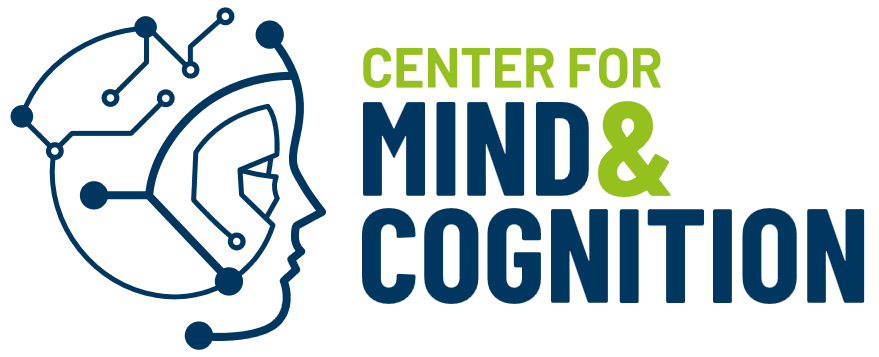Selected Publications 2025 - Click to show
The Relationship Between Vividness of Positive Future-Oriented Mental Imagery, Anhedonia, and Positive Affect
Reference in memories from perceptual and non-perceptual experiences: a non-disjunctivist account including vicarious, oneiric and fictional remembering
Epigenetic markers of disease risk and psychotherapy response in anxiety disorders – a longitudinal analysis of the DNA methylome
An Experimental Investigation of the Causal Role of Mental Imagery in the Experience of Involuntary Memories
Loneliness – not for the faint of heart? Effects of transient loneliness induction on neural and parasympathetic responses to affective stimuli
Interindividual Variability in Memory Performance Is Related to Corticothalamic Networks during Memory Encoding and Retrieval
Posttraining noradrenergic stimulation maintains hippocampal engram reactivation and episodic-like specificity of remote memory
A neural signature of touch aversion and interpersonal problems in Borderline Personality Disorder
Predictive processing’s flirt with transcendental idealism
Extinction context is learned by pigeons, not given by the environment
The multidimensional profile methodology (MPM) for comparative cognition: towards a universal strategy of understanding animal minds
Movie-watching evokes ripple-like activity within events and at event boundaries
Neurite density but not myelination of specific fiber tracts links polygenic scores to general intelligence
Regional prefrontal and hippocampal differences in gray matter volume are linked to the propensity for renewal in extinction learning
Prior knowledge activation as preparation prior to instruction: does the coverage of relevant prior knowledge affect learning?
Positive mental health predicts amelioration of suicidal ideation in patients undergoing cognitive behavioral therapy
Remembering without (representational) memory: a neuro-computational study on regaining categoricity and compositionality from minimal traces
Costly pain avoidance and its impact on the modulation and extinction of visceral pain-related fear
The Mix Matters: Exploring the Interplay Between Epistemic and Zetetic Norms in Scientific Disagreement
Representational dynamics during extinction of fear memories in the human brain
Neural correlates of human fear conditioning and sources of variability in 2199 individuals
With great(er) power comes great(er) responsibility: an intercultural investigation of the effect of social roles on moral responsibility attribution
Selected Publications 2024 - Click to show
Out of touch? How trauma shapes the experience of social touch – neural and endocrine pathways
Scheele, 2024
Stevens L., Bregulla M., Scheele D. (2024). Out of touch? How trauma shapes the experience of social touch – neural and endocrine pathways. Neuroscience & Biobehavioral Reviews (in press)
When is learning “effortful”? Scrutinizing the concept of mental effort in cognitively-oriented research from a motivational perspective
Roelle, 2024
Grund, A., Fries, S., Nückles, M., Renkl, A., & Roelle, J. (2024). When is learning “effortful”? Scrutinizing the concept of mental effort in cognitively-oriented research from a motivational perspective. Educational Psychology Review, 36, Article 11. https://doi.org/10.1007/s10648-024-09852-7
Deceptive XAI: Typology, Creation and Detection
Meske, 2024
Schneider, J., Meske, C. & Vlachos, M. (2024). Deceptive XAI: Typology, Creation and Detection. SN Computer Science 5, 81. https://doi.org/10.1007/s42979-023-02401-z
Foundation Models – A New Paradigm for Artificial Intelligence
Meske, 2024
Schneider, J., Meske, C. and Kuss, P. (2024). Foundation Models – A New Paradigm for Artificial Intelligence. Business & Information Systems Engineering 66, 221–231. http://dx.doi.org/10.1007/s12599-024-00851-0
Opposing serial effects of stimulus and choice in speech perception scale with context variability
Blank, 2024
Ufer, C. & Blank, H. (2024) Opposing serial effects of stimulus and choice in speech perception scale with context variability. iScience:110611.
https://doi.org/10.1016/j.isci.2024.110611
Prediction error processing and sharpening of expected information across the face-processing hierarchy
Blank, 2024
doi.org/10.1038/s41467-024-47749-9
Selected Publications 2023 - Click to show
Modeling the function of episodic memory in spatial learning
Wiskott, 2023
Zeng, X., Diekmann, N., Wiskott, L., & Cheng, S. (2023). Modeling the function of episodic memory in spatial learning. Frontiers in psychology, 14, 1160648. https://doi.org/10.3389/fpsyg.2023.1160648
A map of spatial navigation for neuroscience
Wiskott, 2023
Parra-Barrero, E., Vijayabaskaran, S., Seabrook, E., Wiskott, L., & Cheng, S. (2023). A map of spatial navigation for neuroscience. Neuroscience and biobehavioral reviews, 152, 105200. https://doi.org/10.1016/j.neubiorev.2023.105200
Fictional emotions and emotional reactions to social robots as depictions of social agents

Weber-Guskar, 2023
Berechenbare Gefühle? Grundlegendes zu einer Ethik der digitalen Emotionserfassung
Weber-Guskar, 2023
Weber-Guskar, E. (2023). Berechenbare Gefühle? Grundlegendes zu einer Ethik der digitalen Emotionserfassung. In: Schweiger, G., Zichy, M. (eds) Zwischenmenschliche Beziehungen im Zeitalter des Digitalen. Techno:Phil – Aktuelle Herausforderungen der Technikphilosophie , vol 7. J.B. Metzler, Berlin, Heidelberg. https://doi.org/10.1007/978-3-662-66931-0_8
Verlangsamung und Stillstand: Über eine Störung des Zeitbewusstseins und ihre ethische Relevanz
Weber-Guskar, 2023
Weber-Guskar, E. (2023). Verlangsamung und Stillstand: Über eine Störung des Zeitbewusstseins und ihre ethische Relevanz. Zeitschrift für Praktische Philosophie, 10(1). https://doi.org/10.22613/zfpp/10.1.9
Metacomprehension in Multiple Document Reading. Can Judgment Accuracy Be Fostered by Generating Twitter-Like Summaries?
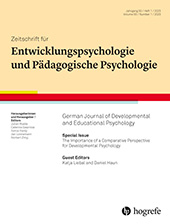
Stadtler, 2023
Schuster, C., Alef, M., Mierwald, M., Brauch, N., & Stadtler, M. (2023). Metacomprehension in Multiple Document Reading. Can Judgment Accuracy Be Fostered by Generating Twitter-Like Summaries? Zeitschrift für Entwicklungspsychologie und Pädagogische Psychologie. https://doi.org/10.1026/0049-8637/a000278
The stabilization of visibility for sequentially presented, low-contrast objects: Experiments and neural field model.
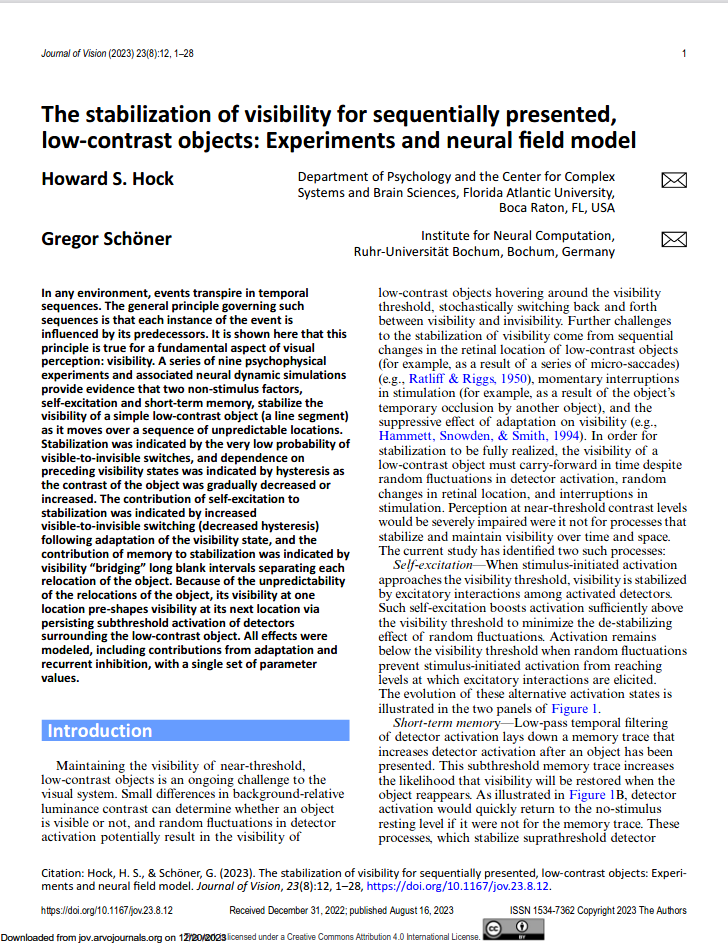
Schöner, 2023
Hock, H. S., & Schöner, G. (2023). The stabilization of visibility for sequentially presented, low-contrast objects: Experiments and neural field model. Journal of Vision, 23(8), 12.
https://doi.org/10.1167/jov.23.8.12
Neural dynamic foundations of a theory of higher cognition: The case of grounding nested phrases.
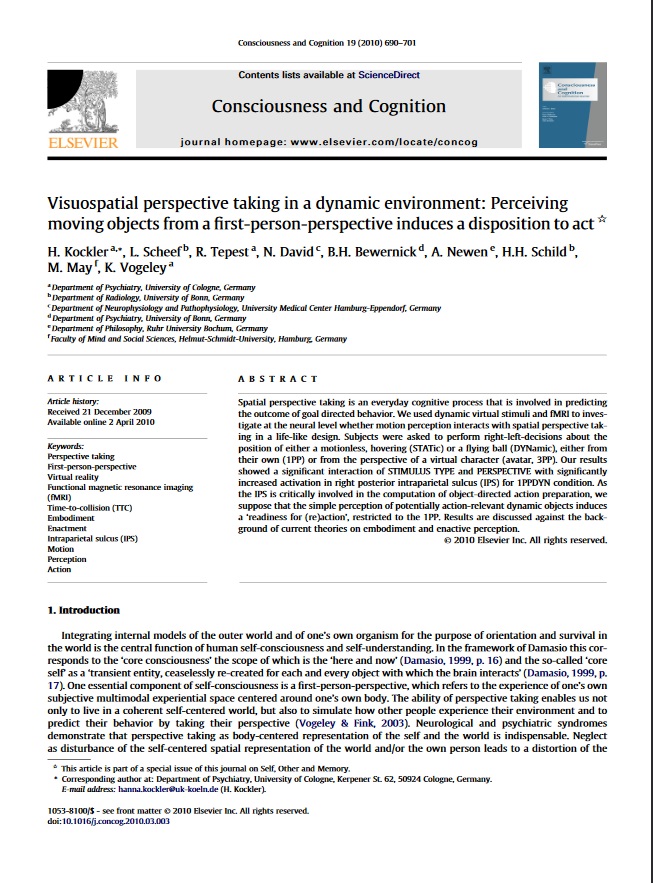
Schöner & Sabinasz, 2023
Sabinasz, D., Richter, M., & Schöner, G. (2023). Neural dynamic foundations of a theory of higher cognition: The case of grounding nested phrases. Cognitive Neurodynamics. https://doi.org/10.1007/s11571-023-10007-7
Do students learn more from failing alone or in groups? Insights into the effects of collaborative versus individual problem solving in productive failure

Rummel, 2023
Brand, C., Hartmann, C., Loibl, K. & Rummel, N.v(2023). Do students learn more from failing alone or in groups? Insights into the effects of collaborative versus individual problem solving in productive failure. Instructional Science. https://doi.org/10.1007/s11251-023-09619-7
Happy together? On the relationship between research on retrieval practice and generative learning using the case of follow-up learning tasks
Roelle, 2023
Roelle, J., Endres, T., Abel, R., Obergassel, N., Nückles, M., & Renkl, A. (2023). Happy together? On the relationship between research on retrieval practice and generative learning using the case of follow-up learning tasks. Educational Psychology Review, 35, Article 102. https://doi.org/10.1007/s10648-023-09810-9
The ALARM theory of consciousness: A two-level theory of phenomenal consciousness
Newen, 2023
Newen, A., & Montemayor, C. (2023). The ALARM theory of consciousness: A two-level theory of phenomenal consciousness. Journal of Consciousness Studies, 30(3-4), 84–105. https://doi.org/10.53765/20512201.30.3.084
Profiles of animal consciousness: A species-sensitive, two-tier account to quality and distribution
Newen, 2023
Dung, L., & Newen, A. (2023). Profiles of animal consciousness: A species-sensitive, two-tier account to quality and distribution. Cognition, 235, 105409. https://doi.org/10.1016/j.cognition.2023.105409
A conceptual framework for empathy in humans and nonhuman animals
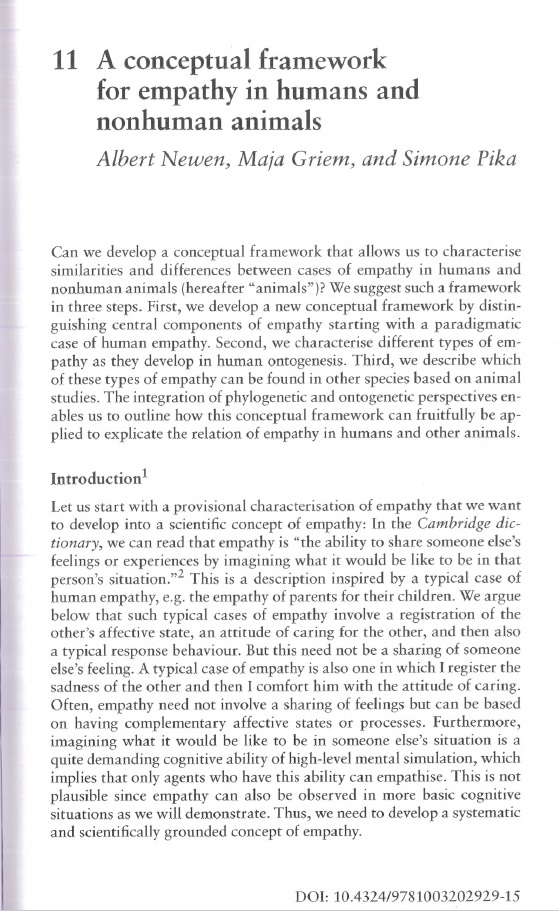
Newen, 2023
Newen, A., Griem, M., Pika, S. (2023): A conceptual framework for empathy in humans and nonhuman animals. In: Wittgenstein and Beyond, Routledge, New York. DOI: 10.4324/9781003202929-15
Profiles of animal consciousness: A species-sensitive, two-tier account to quality and distribution.

Newen, 2023
Optogenetics reveals paradoxical network stabilizations in hippocampal CA1 and CA3

Cheng, 2023
de Jong, L. W., Nejad, M. M., Yoon, E., Cheng, S., & Diba, K. (2023). Optogenetics reveals paradoxical network stabilizations in hippocampal CA1 and CA3. Current Biology. 33(9), 1689-1703.
Evolutionary Inquiries Into the Origin and Nature of Mental Disorders
Brüne, 2023
Brüne M. (2023). Evolutionary Inquiries Into the Origin and Nature of Mental Disorders. JAMA psychiatry, 80(6), 537–538. https://doi.org/10.1001/jamapsychiatry.2023.0662
Stress-Mediated Abnormalities in Regional Myocardial Wall Motion in Young Women with a History of Psychological Trauma
Brüne, 2023
The value of mere completion
Hennecke, 2023
Converse, B. A., Tsang, S., & Hennecke, M. (2023). The value of mere completion. Journal of Experimental Psychology: General, 152(11), 3021–3036. https://doi.org/10.1037/xge0001434
Metacognition and self-control: An integrative framework. Psychological Review
Hennecke, 2023
Hennecke, M., & Bürgler, S.(2023). Metacognition and self-control: An integrative framework. Psychological Review, 130(5), 1262-1268. https://doi.org/10.1037/rev0000406
Selected Publications 2022 - Click to show
A Model of Semantic Completion in Generative Episodic Memory
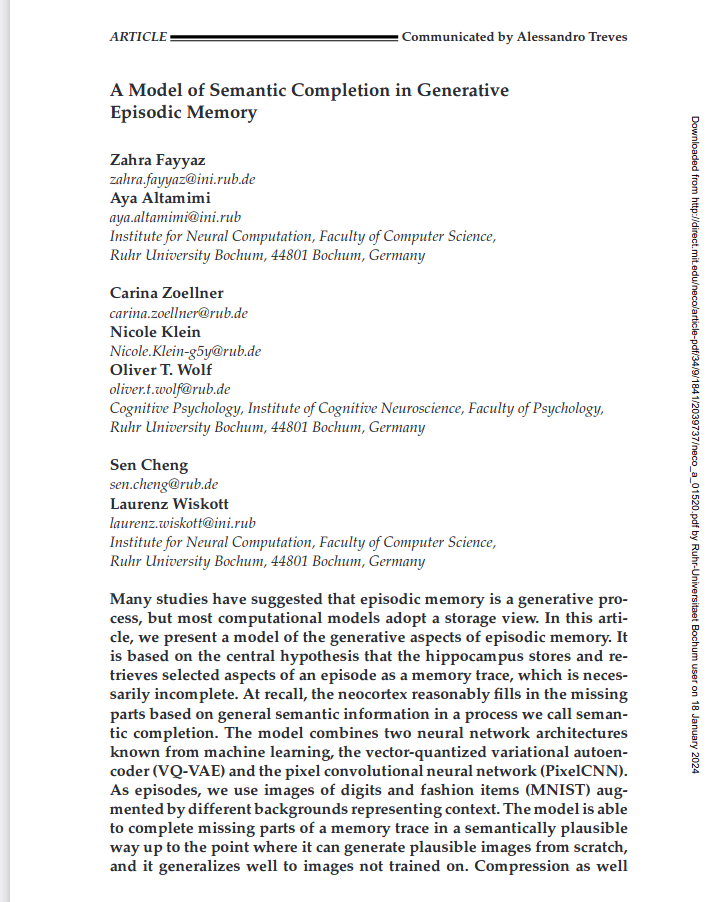
Wiskott, 2022
Fayyaz, Z., Altamimi, A., Zoellner, C., Klein, N., Wolf, O. T., Cheng, S., & Wiskott, L.. (2022). A Model of Semantic Completion in Generative Episodic Memory. Neural Computation, 34(9), 1841–1870. http://doi.org/10.1162/neco_a_01520
Reflecting (on) Replica. Can We Have a Good Affective Relationship with a Social Chatbot?
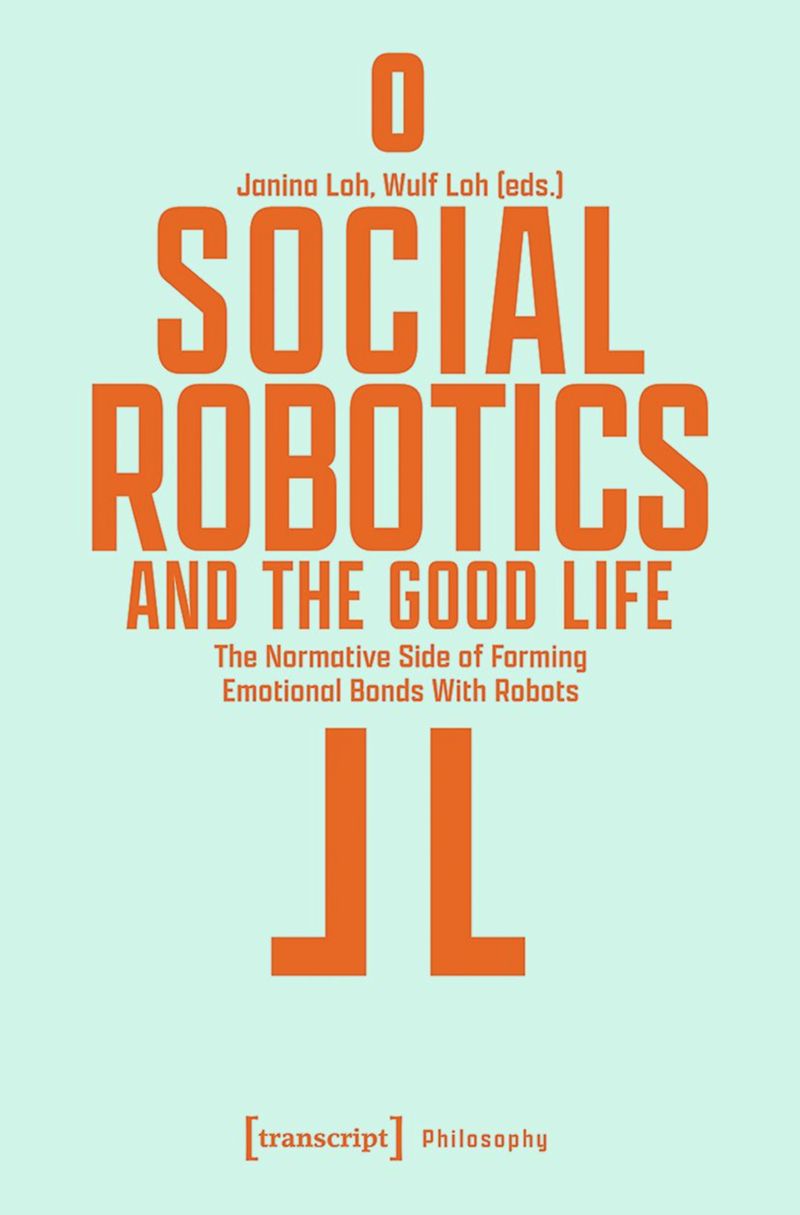
Weber-Guskar, 2022
Mechanistic flexibility of the Retrosplenial Cortex enables its contribution to spatial cognition
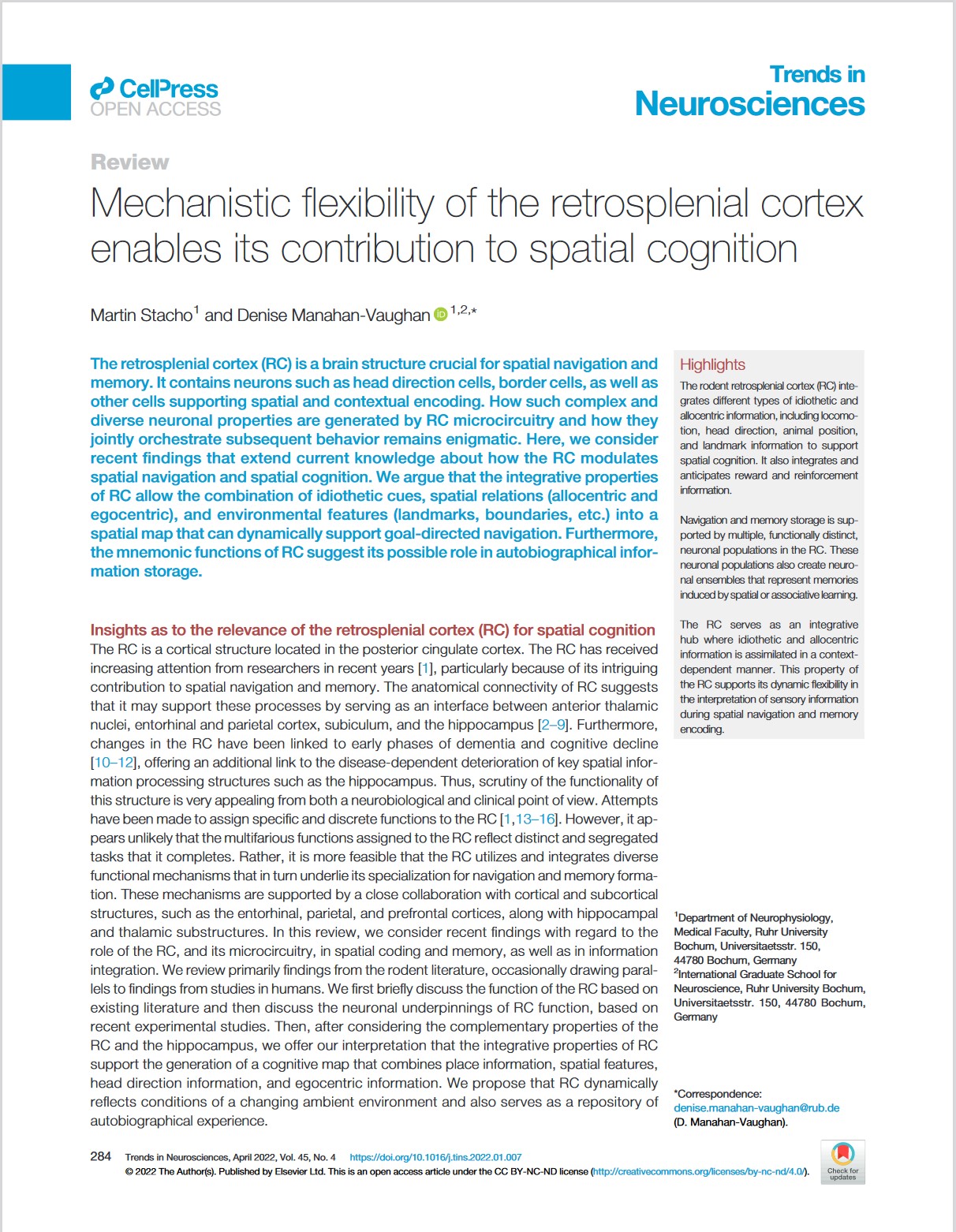
Stacho & Manahan-Vaughan, 2022
Stacho M., & Manahan-Vaughan, D. (2022). Mechanistic flexibility of the Retrosplenial Cortex enables its contribution to spatial cognition. Trends In Neurosciences, 45(4), 284-296. https://doi.org/10.1016/j.tins.2022.01.007
Dynamical Systems Approaches to Cognition
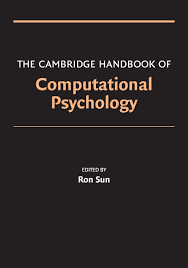
Schöner, 2022
Schöner, G. (in press). Dynamical Systems Approaches to Cognition. In Sun, R (ed.), The Cambridge Handbook of Computational Psychology. 2nd Edition. Cambridge University Press.
Can you teach me not to be angry? Relations between temperament and the emotion regulation strategy distraction in 2-year-olds.
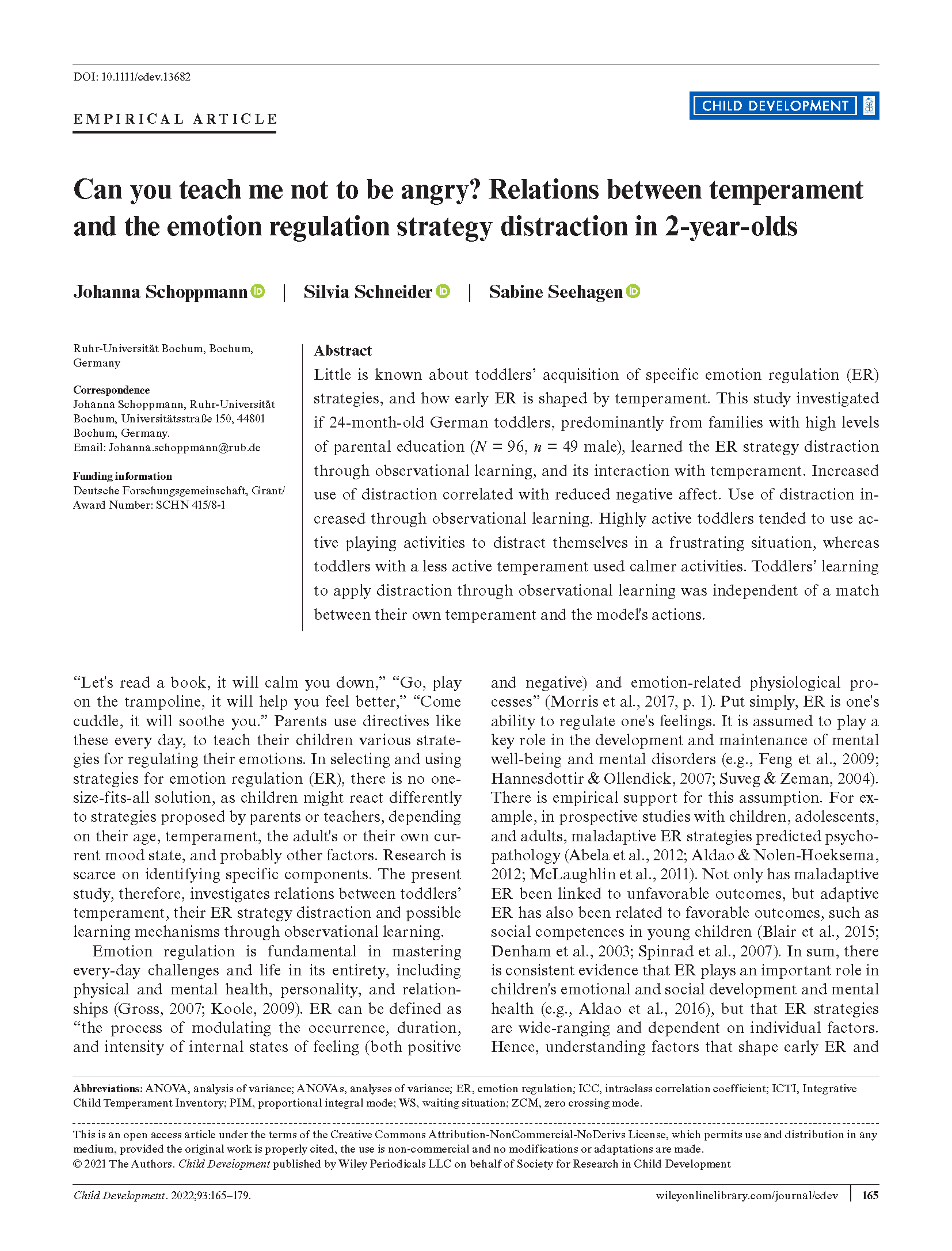
Schneider, 2022
Minds, Brains, and Deep Learning: The Development of Cognitive Science Through the Lens of Kant’s Approach to Cognition

Schlicht, 2022
Schlicht, T. (2022). 1 Minds, Brains, and Deep Learning: The Development of Cognitive Science Through the Lens of Kant’s Approach to Cognition. Kant and Artificial Intelligence.
Mental Content
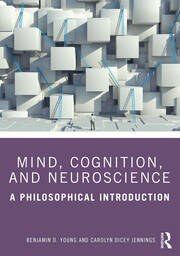
Schlicht, 2022
Special Issue: Predictive Processing and Consciousness

Schlicht, 2022
A Perceptually Grounded Neural Dynamic Architecture Establishes Analogy Between Visual Object Pairs
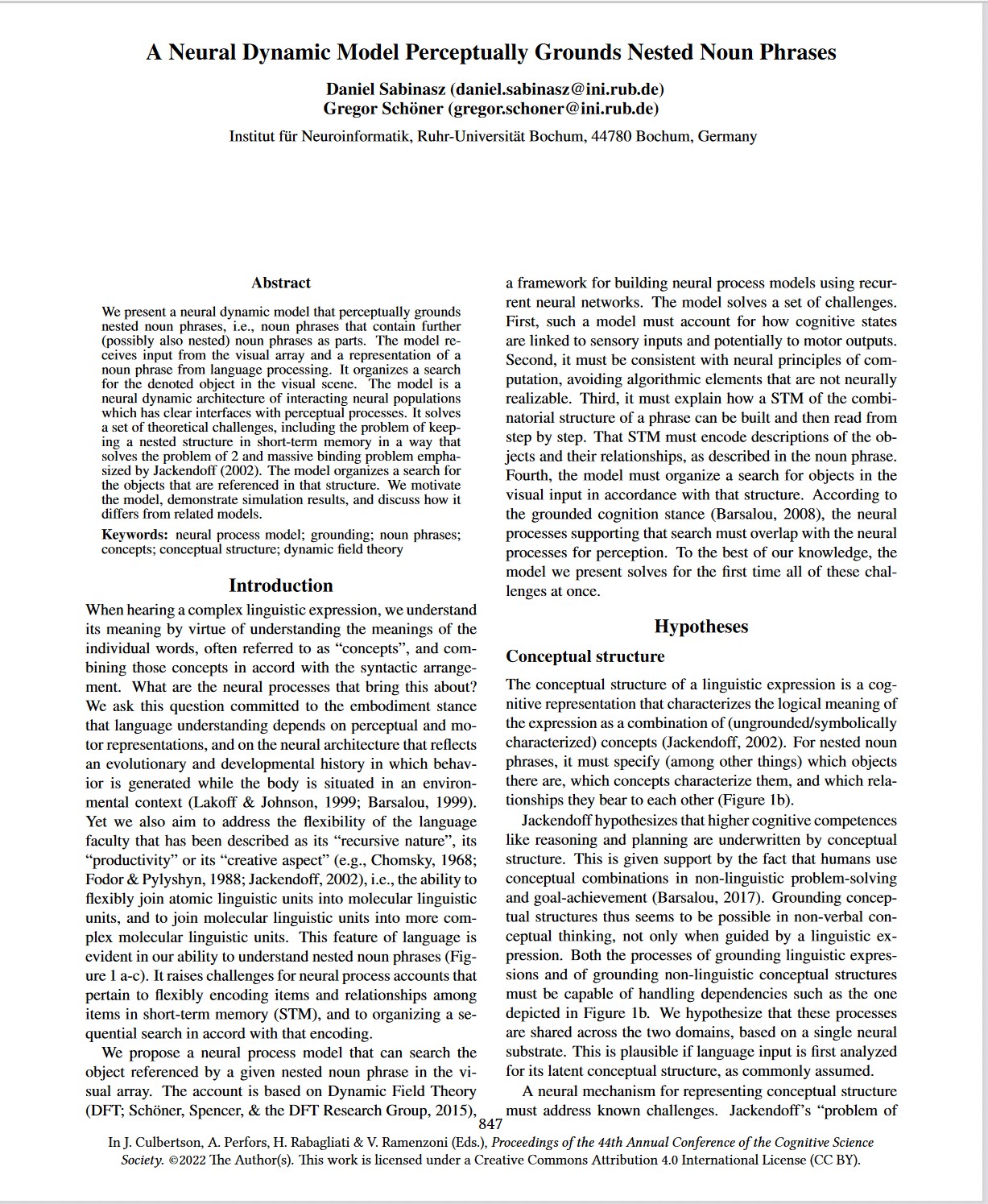
Sabinasz & Schöner, 2022
Sabinasz, D. & Schöner, G. (2022). A Perceptually Grounded Neural Dynamic Architecture Establishes Analogy Between Visual Object Pairs. In J. Culbertson, Perfors, A., Rabagliati, H., & Ramenzoni, V. (Eds.), Proceedings of the 44th Annual Conference of the Cognitive Science Society. https://escholarship.org/uc/item/88t5317c
The function of teacher dashboards depends on the amount of time pressure in the classroom situation: results from teacher interviews and an experimental study

Rummel, 2022
Van Leeuwen, A., & Rummel, N. (2022). The function of teacher dashboards depends on the amount of time pressure in the classroom situation: results from teacher interviews and an experimental study. Unterrichtswissenschaft, 50, 561–588. https://doi.org/10.1007/s42010-022-00156-9
Constructing a wider view on memory – Beyond the dichotomy of field and observer perspectives
Peters, Cosentino & Werning, 2022
Peeters, A., Cosentino, E., & Werning, M. (2022). Constructing a wider view on memory – Beyond the dichotomy of field and observer perspectives. In A. Berninger & Í. V. Ferran (eds.), Memory and Imagination (pp. 165–190). London: Routledge. https://doi.org/10.4324/9781003153429-11
Mechanistic flexibility of the Retrosplenial Cortex enables its contribution to spatial cognition
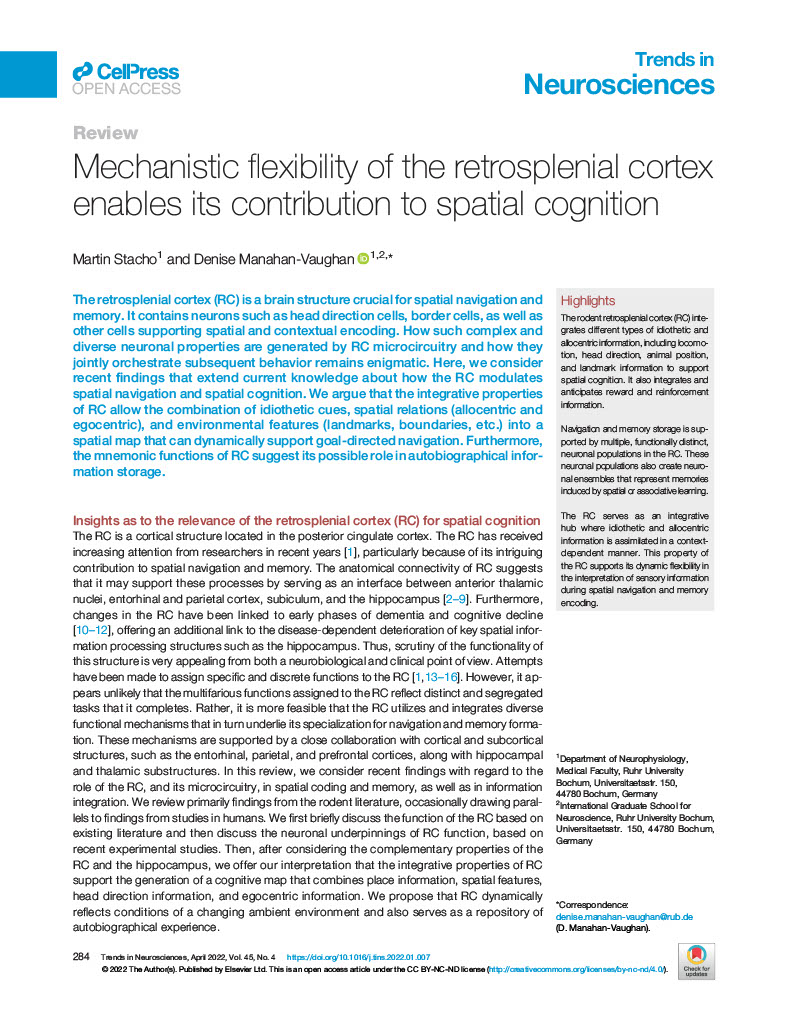
Manahan-Vaughan, 2022
Stacho M, Manahan-Vaughan D (2022) Mechanistic flexibility of the Retrosplenial Cortex enables its contribution to spatial cognition. Trends Neurosci. 45:284- 296. doi: 10.1016/j.tins.2022.01.007
Olfactory information encoding engages subcortical and cortical brain regions that enable sensory information processing and valence encoding
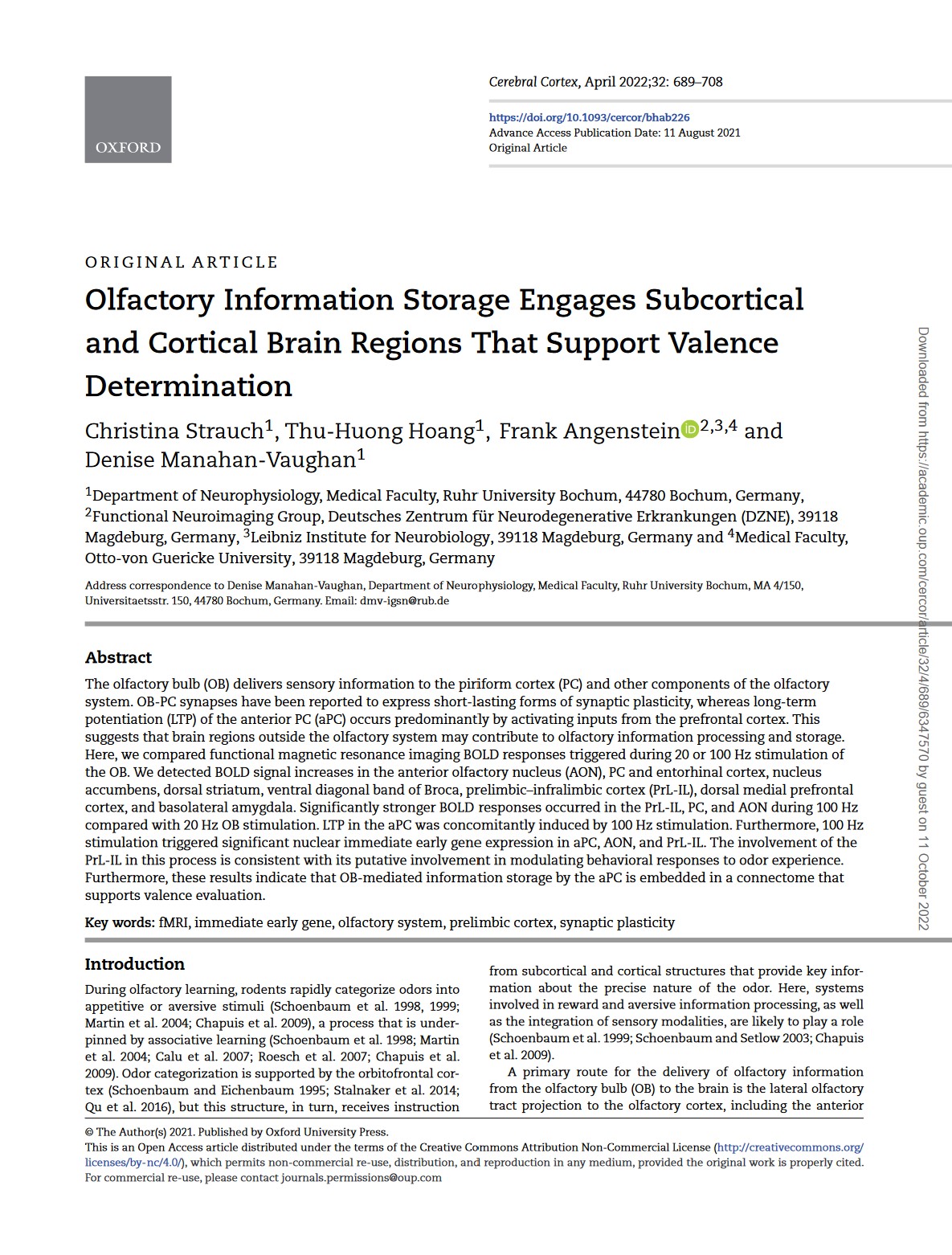
Manahan-Vaughan, 2022
Strauch C., Angenstein F., Huong, T.H. & Manahan-Vaughan, D. (2022). Olfactory information encoding engages subcortical and cortical brain regions that enable sensory information processing and valence encoding. Cerebral Cortex 30(2). 135-147. https://doi.org/10.1093/cercor/bhab226
Factivity variation in episodic memory reports
Liefke & Werning, 2022
Liefke, K., & Werning, M. (in press). Factivity variation in episodic memory reports. In Y. Katsutoshi, T. Yasufumi, & K. Mineshima (Eds.), New Frontiers in Artificial Intelligence. Lecture Notes in Computer Science. Heidelberg: Springer.
Exploring accidental triggers of smart speakers
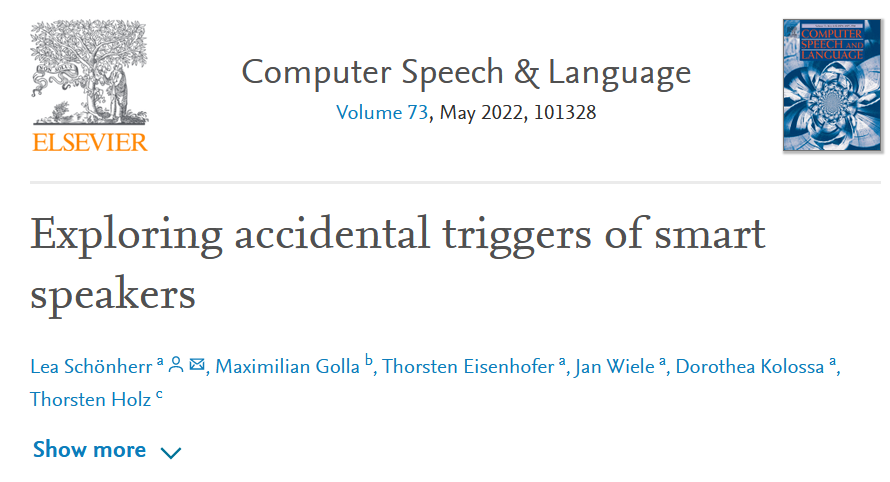
Kolossa, 2022
Intuitive Expertise in Moral Judgments
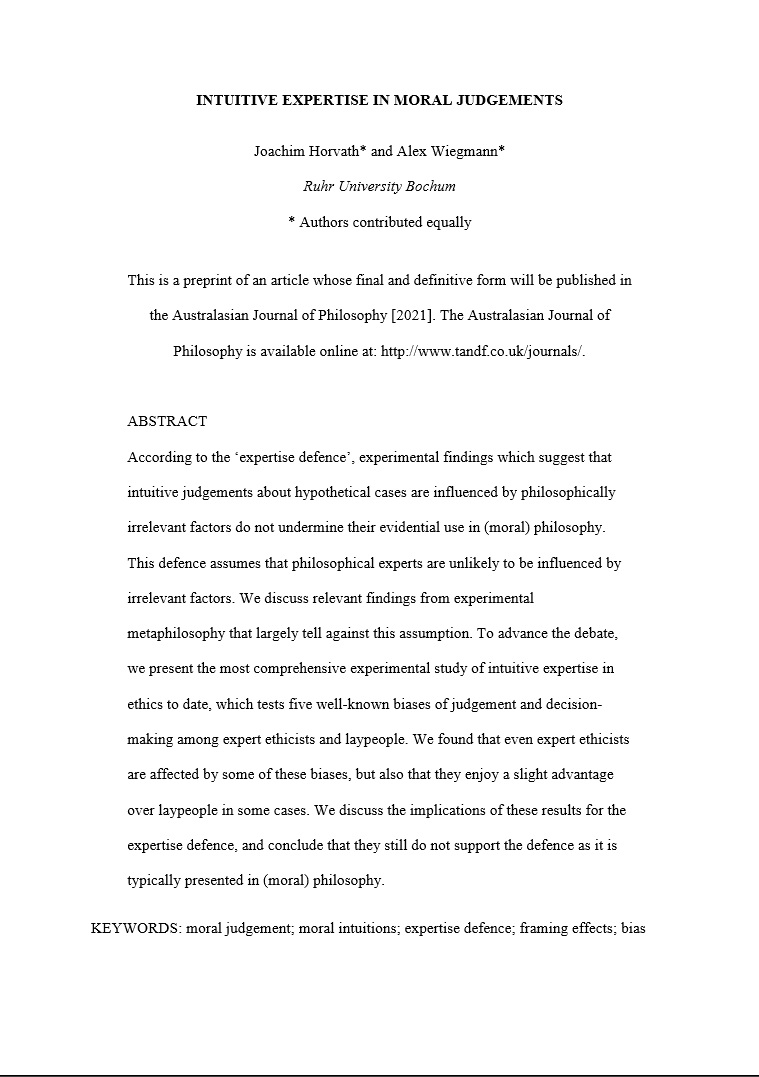
Horvath, 2022
Horvath, J., & Wiegmann, A. (2022). Intuitive Expertise in Moral Judgments. Australasian Journal of Philosophy, 100(2), 342–359. https://doi.org/10.1080/00048402.2021.1890162
Mischaracterization Reconsidered
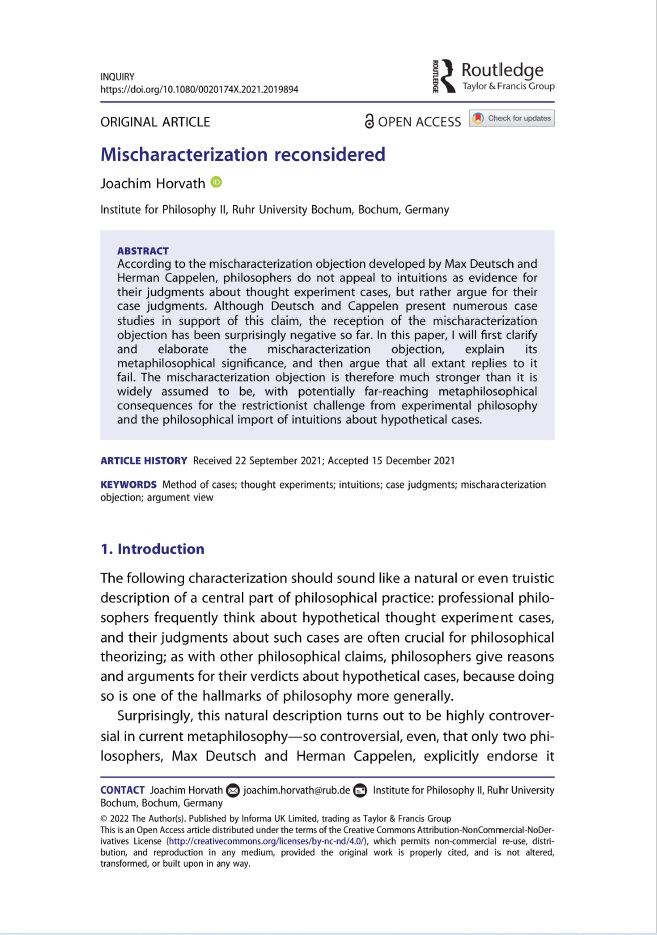
Horvath, 2022
Horvath, J. (2022). Mischaracterization Reconsidered. Inquiry, 0(0), 1–40. https://doi.org/10.1080/0020174X.2021.2019894
A Model of Semantic Completion in Generative Episodic Memory
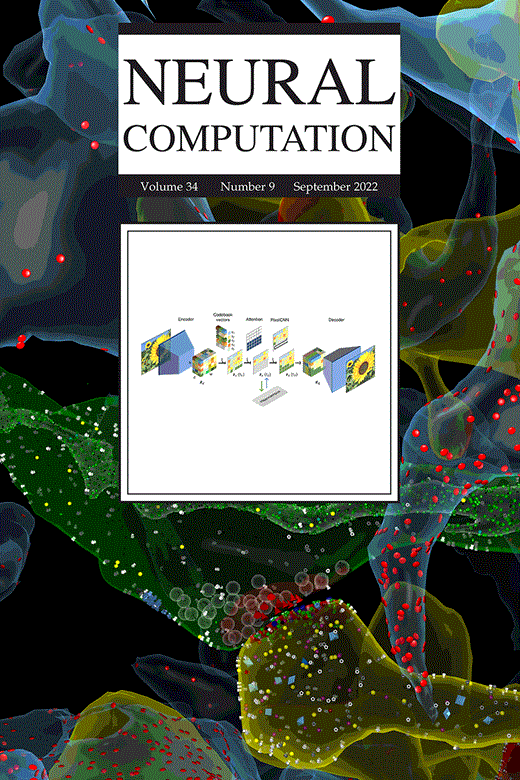
Cheng, 2022
Fayyaz, Z., Altamimi, A., Zoellner, C., Klein, N., Wolf, O. T., Cheng, S., & Wiskott, L. (2022). A Model of Semantic Completion in Generative Episodic Memory. Neural Computation, 34(9), 1841–1870.
Altered Left Ventricular Myocardial Deformation in Young Women With Borderline Personality Disorder: An Echocardiographic Study
Brüne, 2022
Engemann, L., Aweimer, A., Ewers, A., Afshari, F., Maiß, C., Kern, K., … & Brüne, M. (2022). Altered Left Ventricular Myocardial Deformation in Young Women With Borderline Personality Disorder: An Echocardiographic Study. Psychosomatic Medicine, 84(5), 581-587.
Quo Vadis Psychiatry? Why It Is Time to Endorse Evolutionary Theory
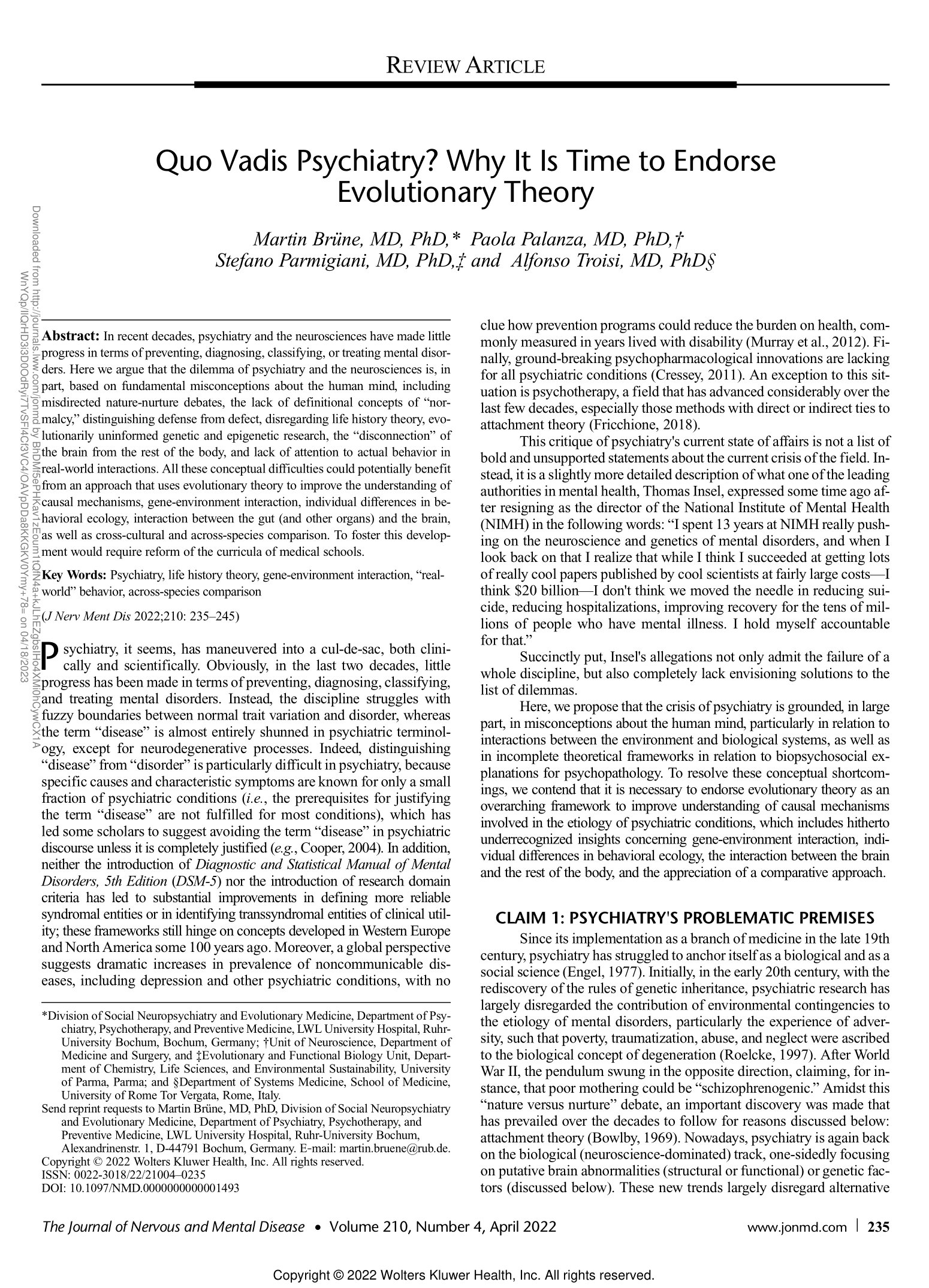
Brüne, 2022
Brüne, M., Palanza, P., Parmigiani, S., & Troisi, A. (2022). Quo Vadis Psychiatry? Why It Is Time to Endorse Evolutionary Theory. The Journal of Nervous and Mental Disease, 210(4), 235-245.
Selected Publications 2021 - Click to show
Stress research during the COVID-19 pandemic and beyond.
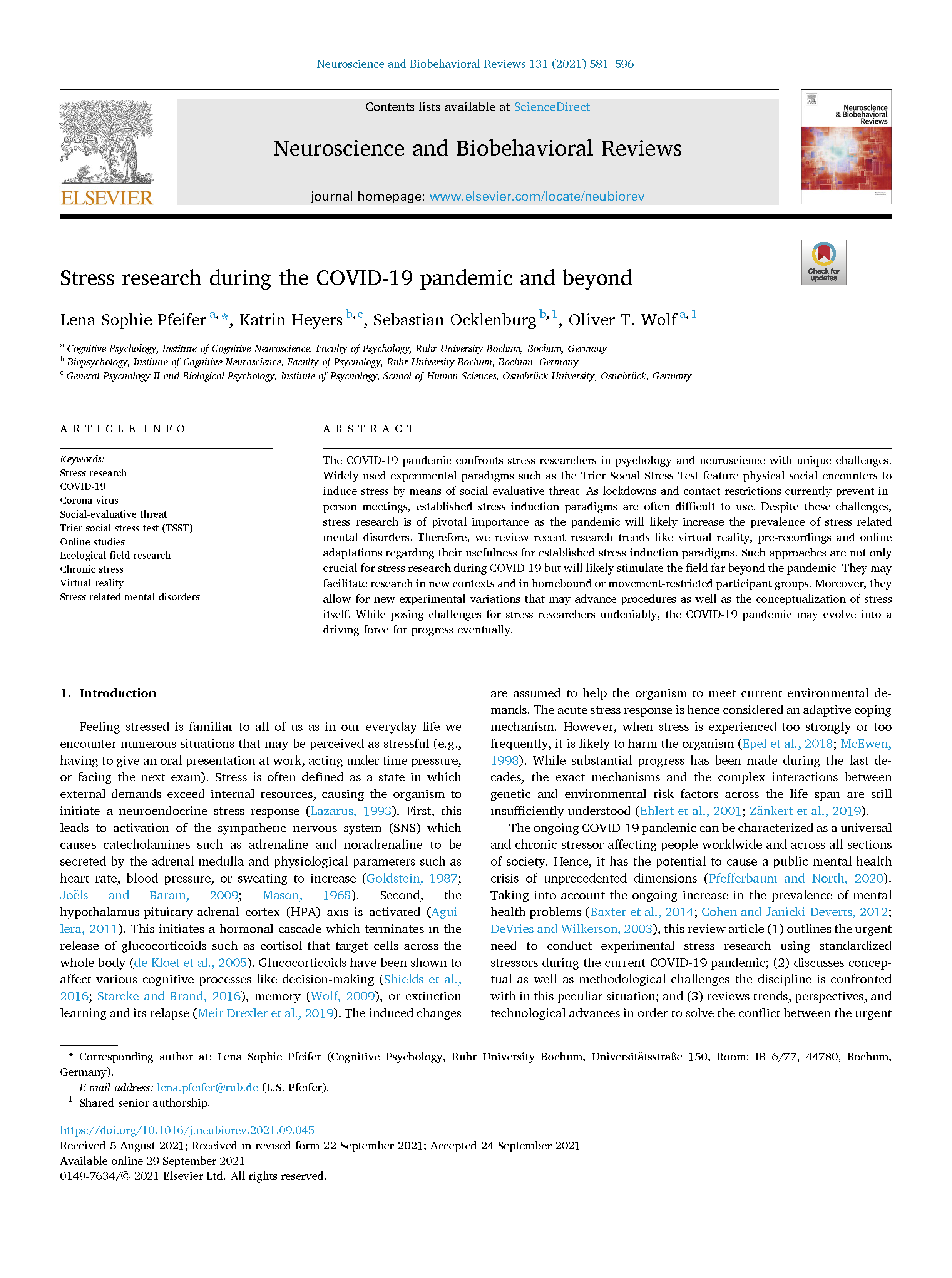
Wolf, 2021
Improving sensory representations using episodic memory
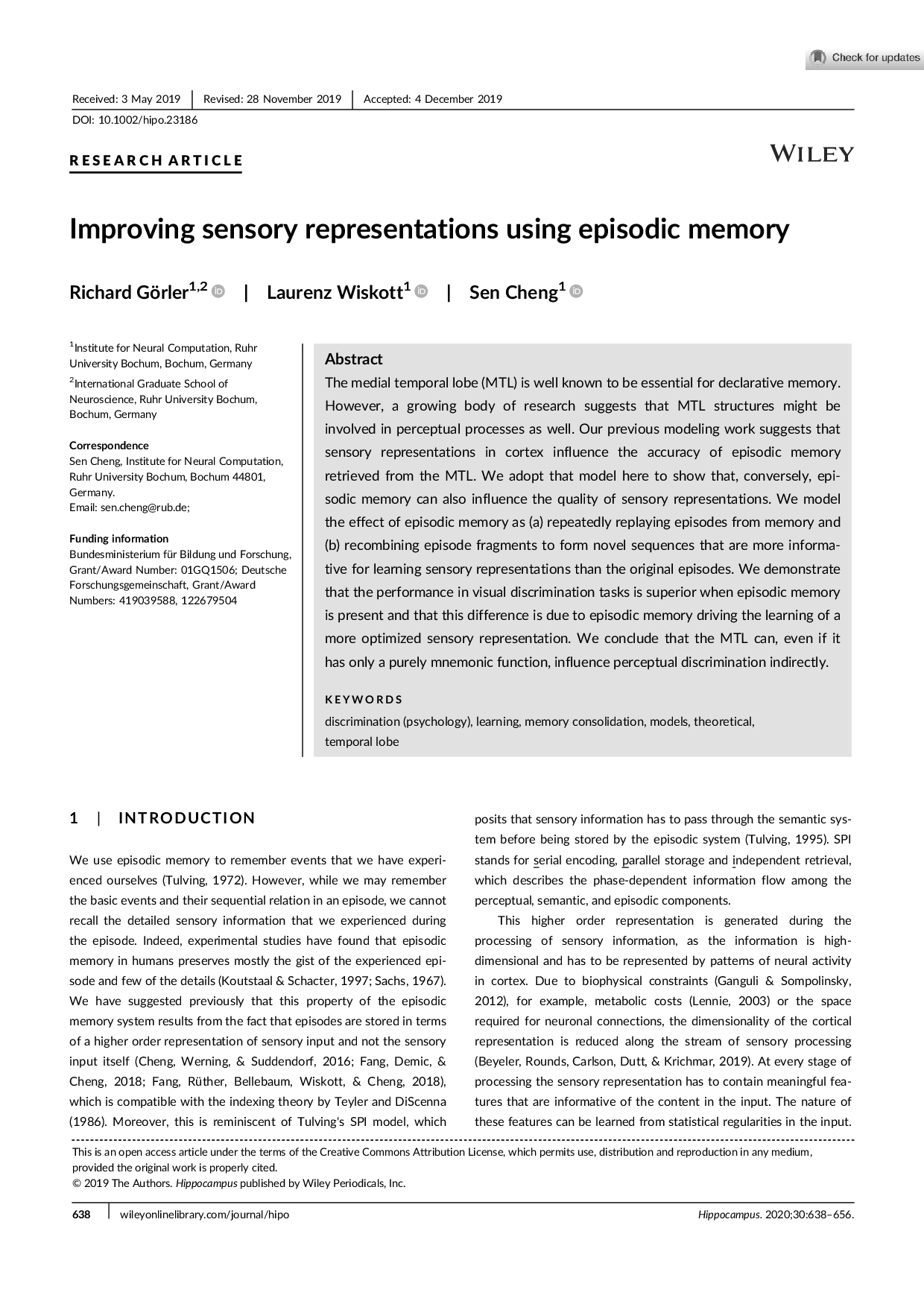
Wiskott, 2021
The Cost of the Epistemic Step: Investigating Scalar Implicatures in Full and Partial Information Contexts

Werning, 2021
How does an emotional culture of joy cultivate team resilience? A sociocognitive perspective

Weiss, 2021
Drohen mit dem Einsatz von Künstlicher Intelligenz neue Menschenwürdeverletzungen?

Weber-Guskar, 2021
How to feel about emotionalized artificial intelligence? When robot pets, holograms, and chatbots become affective partners
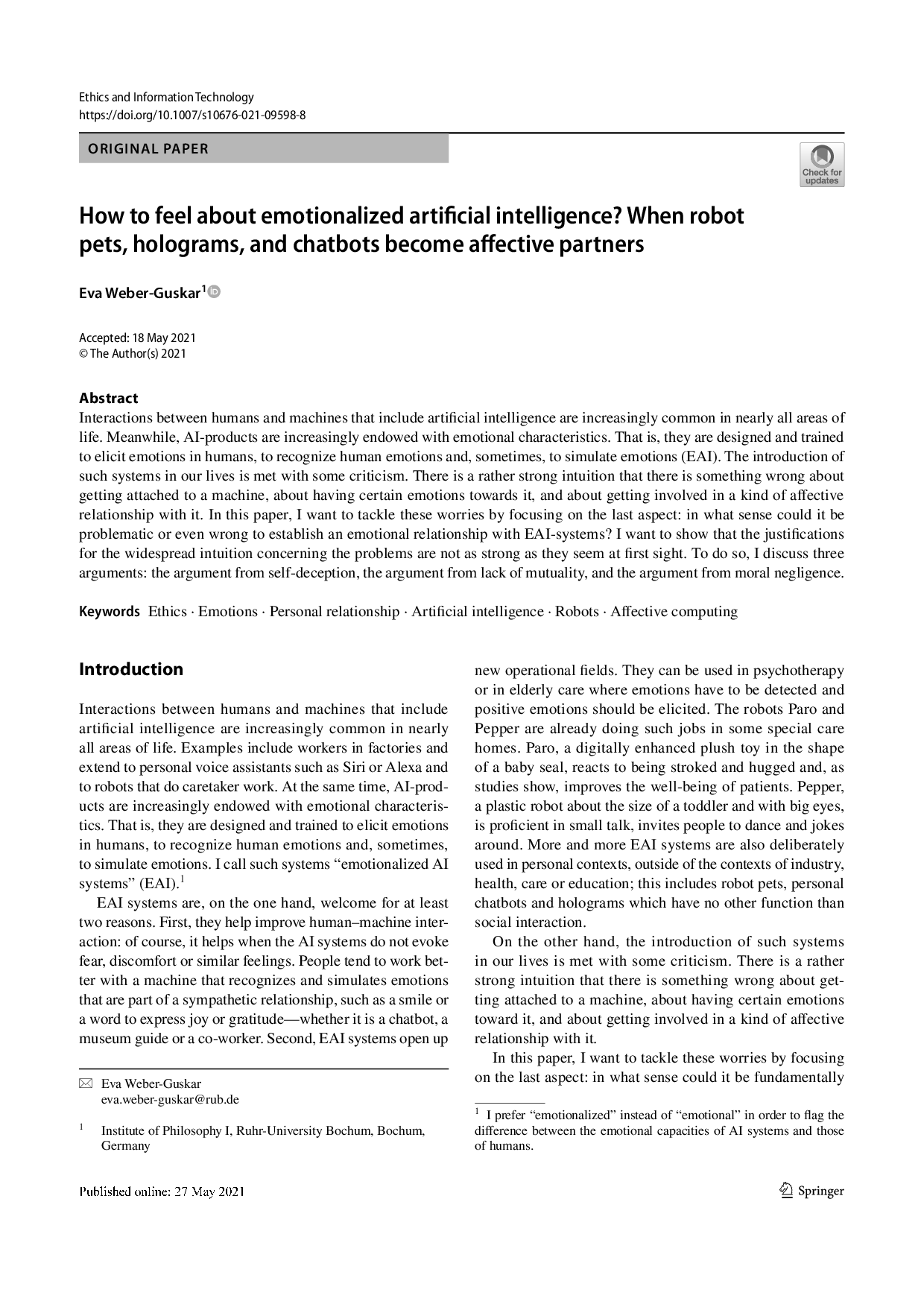
Weber-Guskar, 2021
Visual and Tactile Sensory Systems Share Common Features in Object Recognition.

Tegenthoff, 2021
Higher functional connectivity between prefrontal regions and the dorsal attention network predicts absence of renewal.

Tegenthoff, 2021
Information Easiness Affects Non-experts’ Evaluation of Scientific Claims About Which They Hold Prior Beliefs
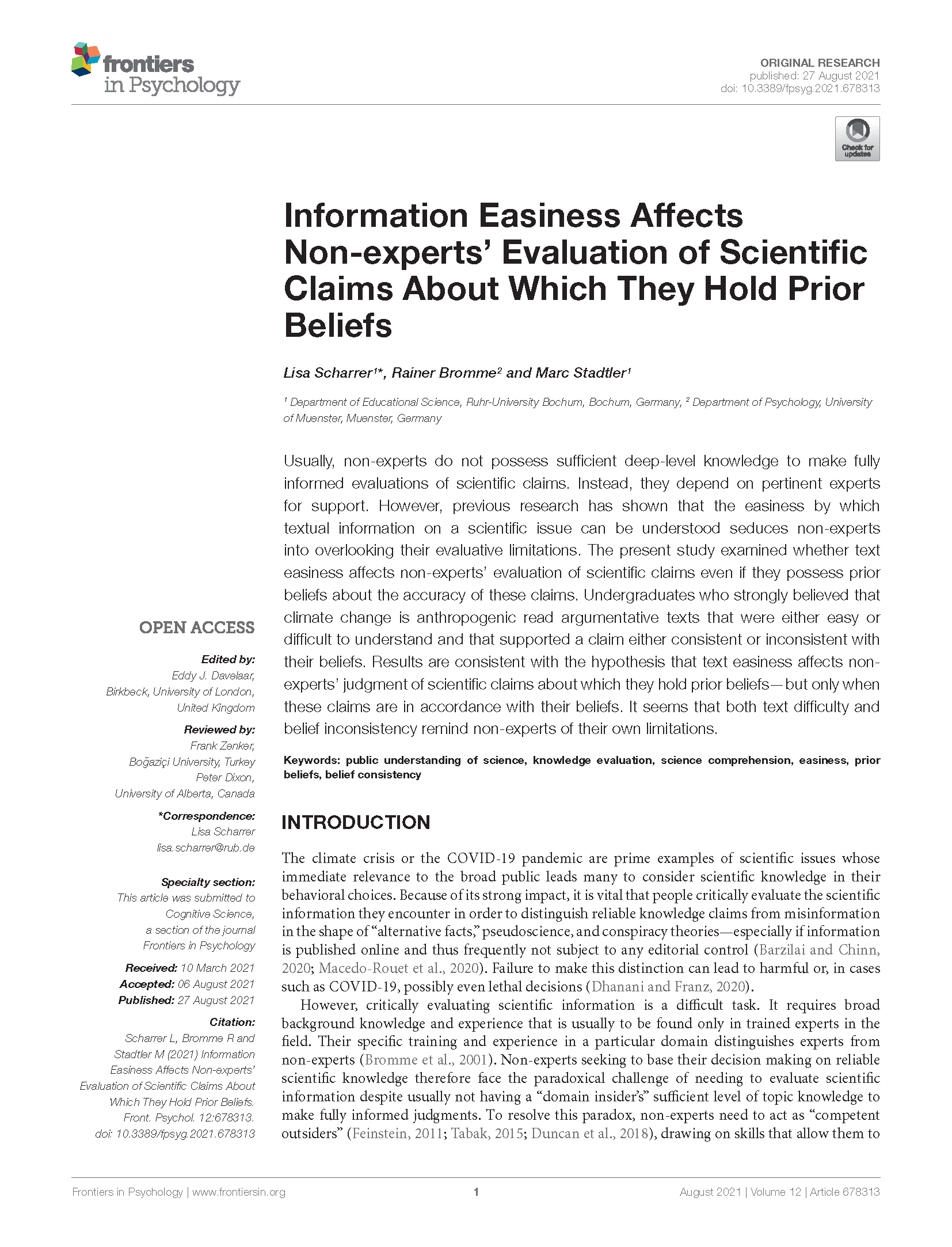
Stadtler, 2021
Inside Document Models: Role of Source Attributes in Readers’ Integration of Multiple Text Contents.

Stadtler, 2021
Consequences of exposure to the thin ideal in mass media depend on moderators in young women: An experimental study.
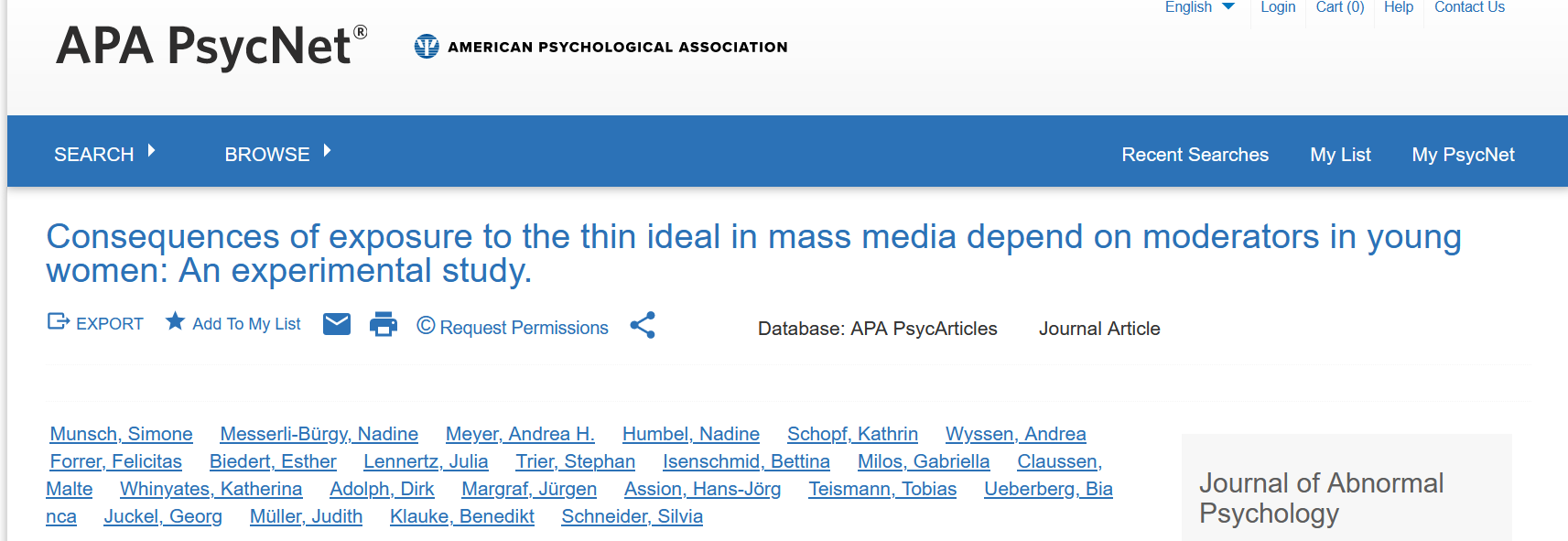
Schneider, 2021
State-Dependent Memory in Infants.
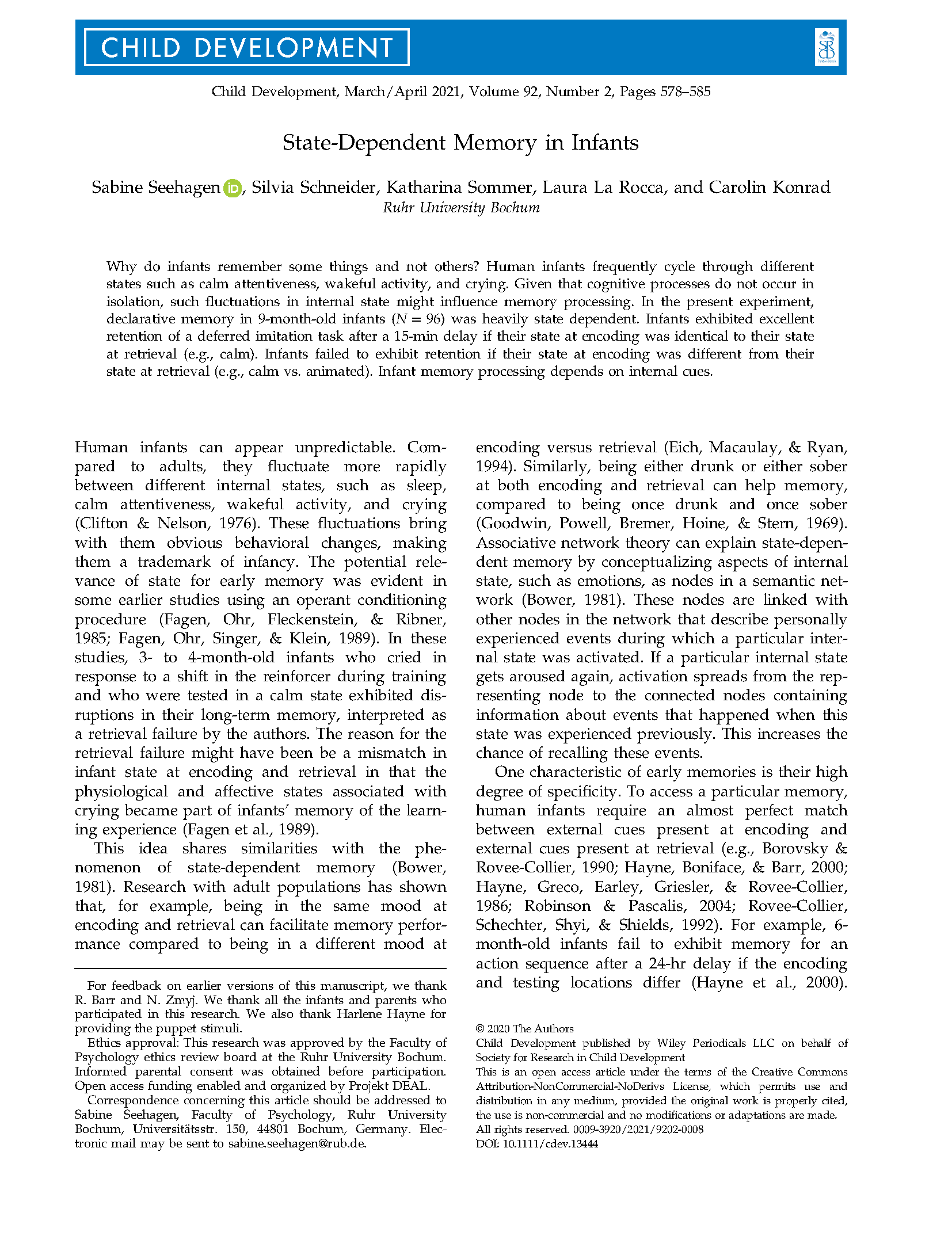
Schneider, 2021
You can’t always get what you want: Predictive Processing and Consciousness.

Schlicht, 2021
Schlicht, T., Dolega, K. (2021) You can’t always get what you want: Predictive Processing and Consciousness. Philosophy and the Mind Sciences
https://philosophymindscience.org/index.php/phimisci/article/view/9153
Designing for the co-Orchestration of Social Transitions between Individual, Small-Group and Whole-Class Learning in the Classroom.
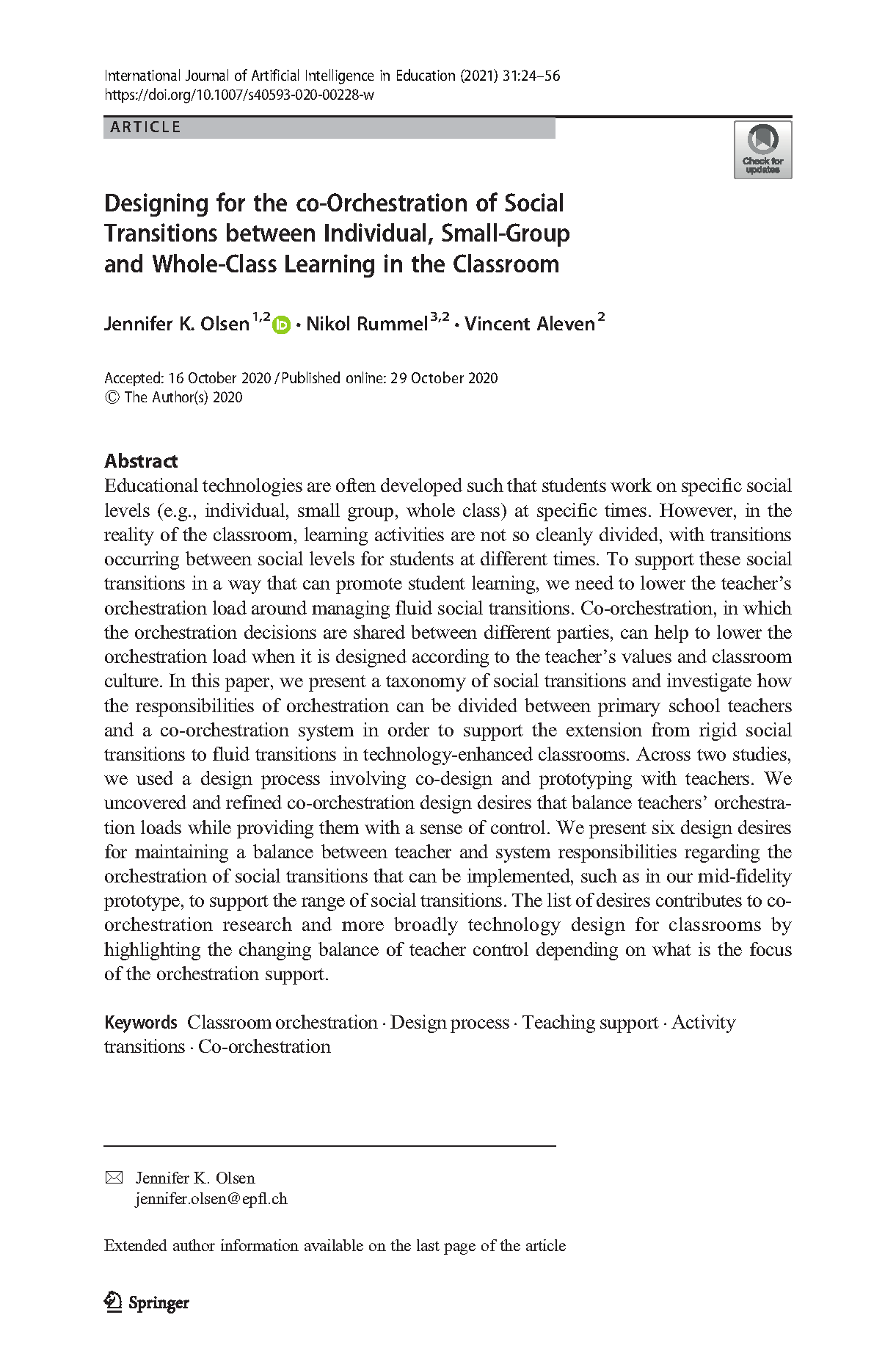
Rummel, 2021
The role of spontaneous recovery effects in the context of German orthography instruction methods with delayed correction.

Rummel, 2021
Working memory capacity of crows and monkeys arises from similar neuronal computations
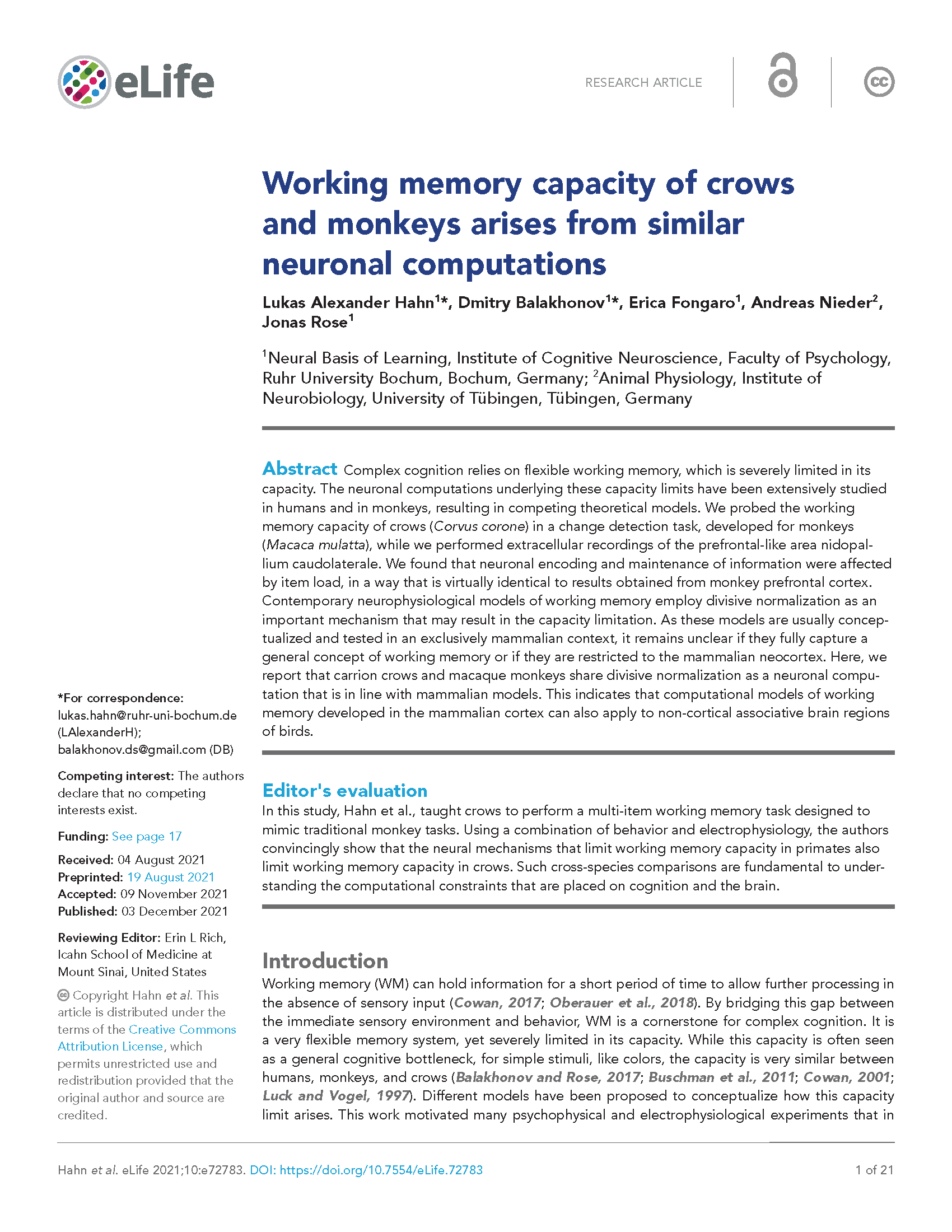
Rose, 2021
Hahn, L. A., Balakhonov, D., Fongaro, E., Nieder, A., & Rose, J. (2021). Working memory capacity of crows and monkeys arises from similar neuronal computations. eLife, 10, e72783. https://doi.org/10.7554/eLife.72783
Avian navigation: Head direction cells in the quail hippocampus

Rose, 2021
Constructing the Past: The Relevance of the Narrative Self in Modulating Episodic Memory
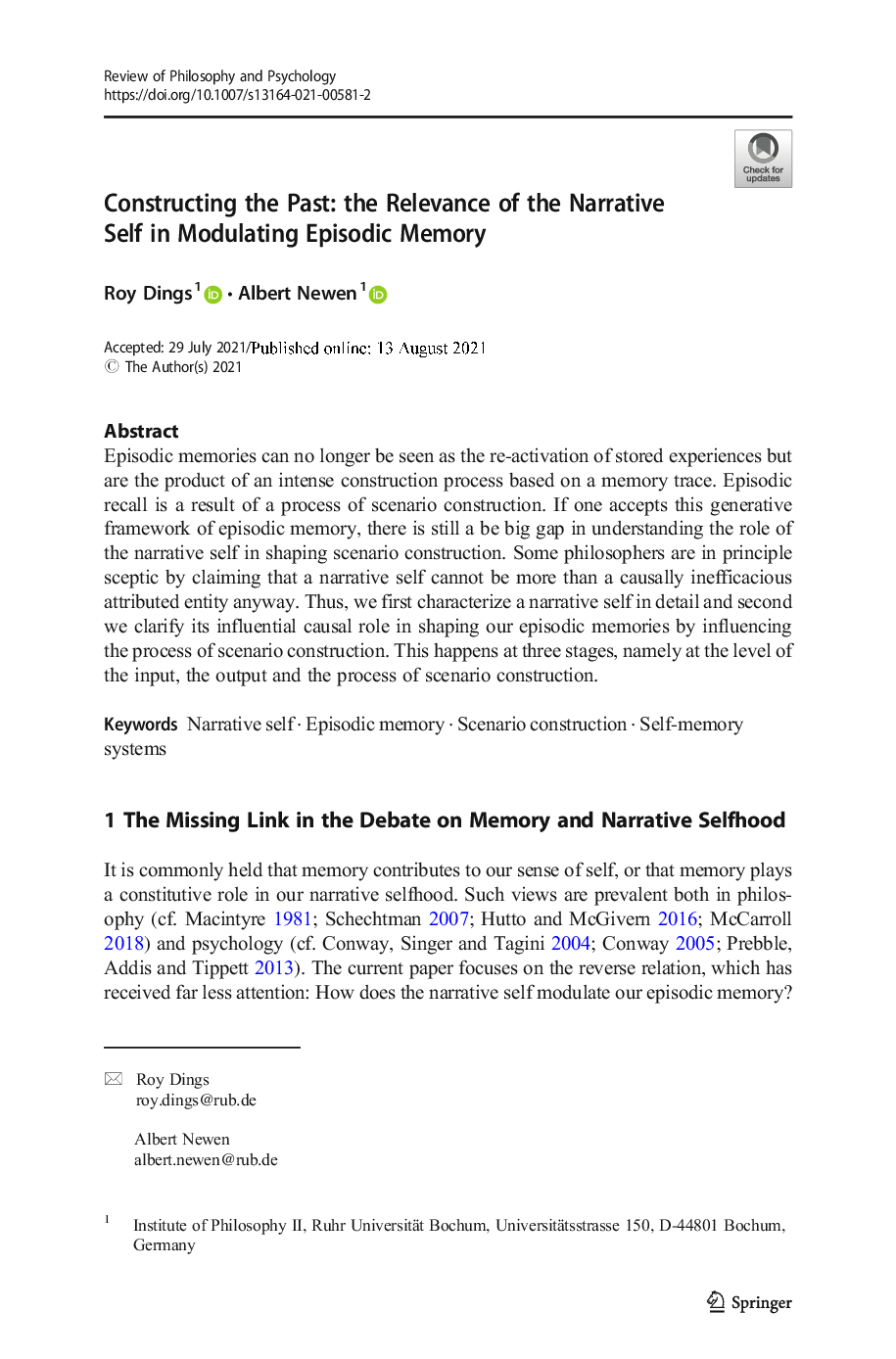
Newen, 2021
Rethinking Integration of Epistemic Strategies in Social Understanding: Examining the Central Role of Mindreading in Pluralist Accounts
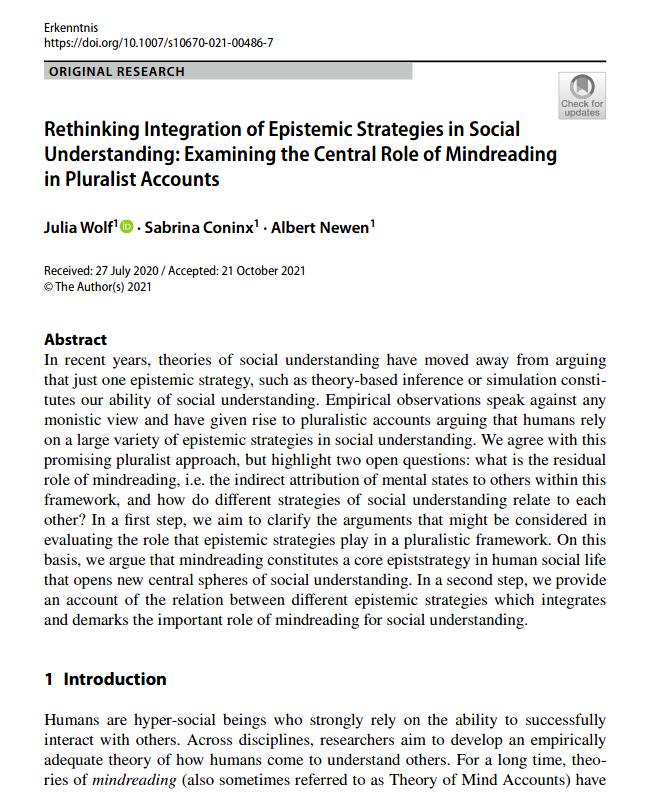
Newen, 2021
Suicide ideation during the COVID-19 outbreak in German university students: Comparison with pre-COVID 19 rates
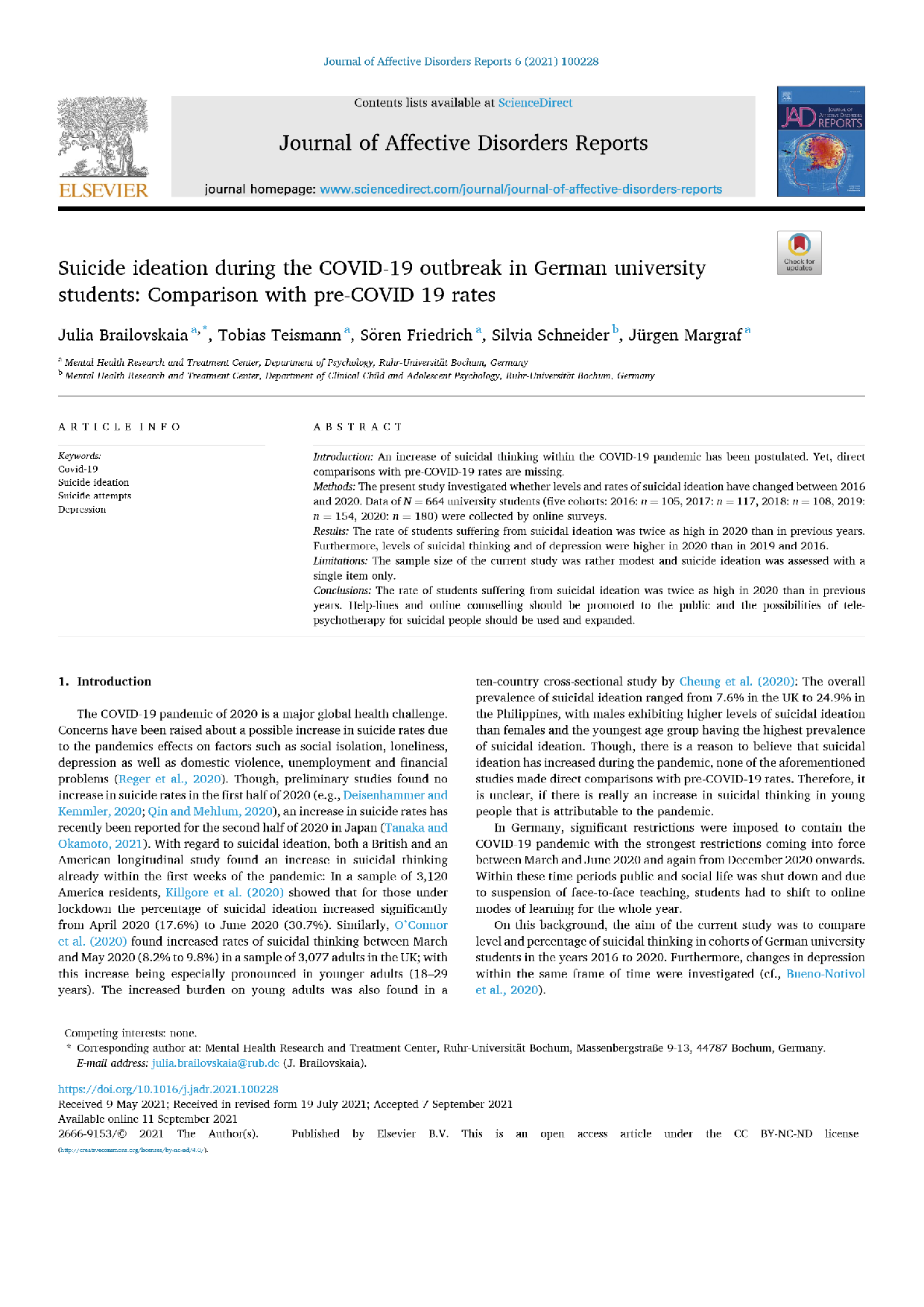
Margraf, 2021
The patterns of problematic social media use (SMU) and their relationship with online flow, life satisfaction, depression, anxiety and stress symptoms in Lithuania and in Germany

Margraf, 2021
Data Fusion for Audiovisual Speaker Localization: Extending Dynamic Stream Weights to the Spatial Domain
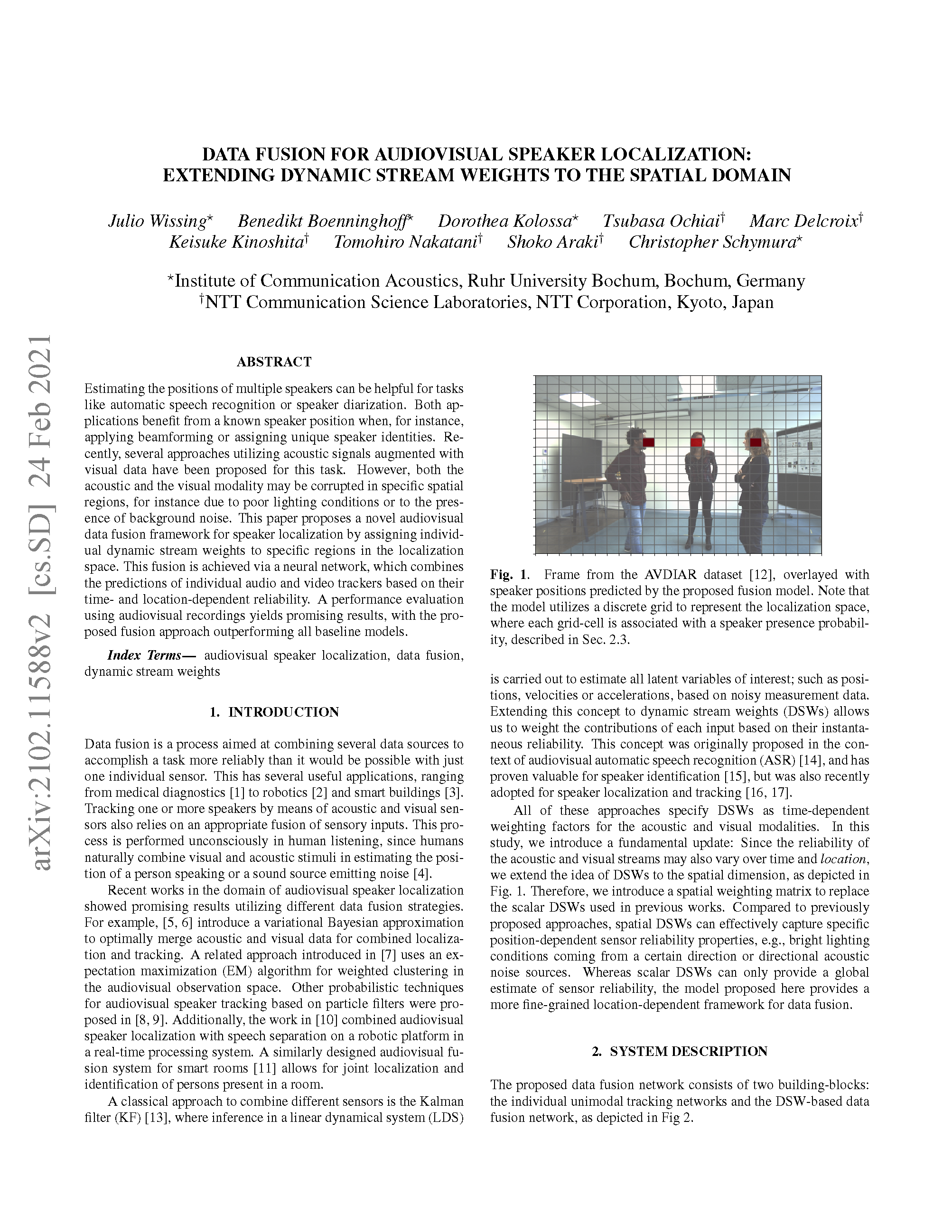
Kolossa, 2021
Trial-by-trial dynamics of reward prediction error-associated signals during extinction learning and renewal.
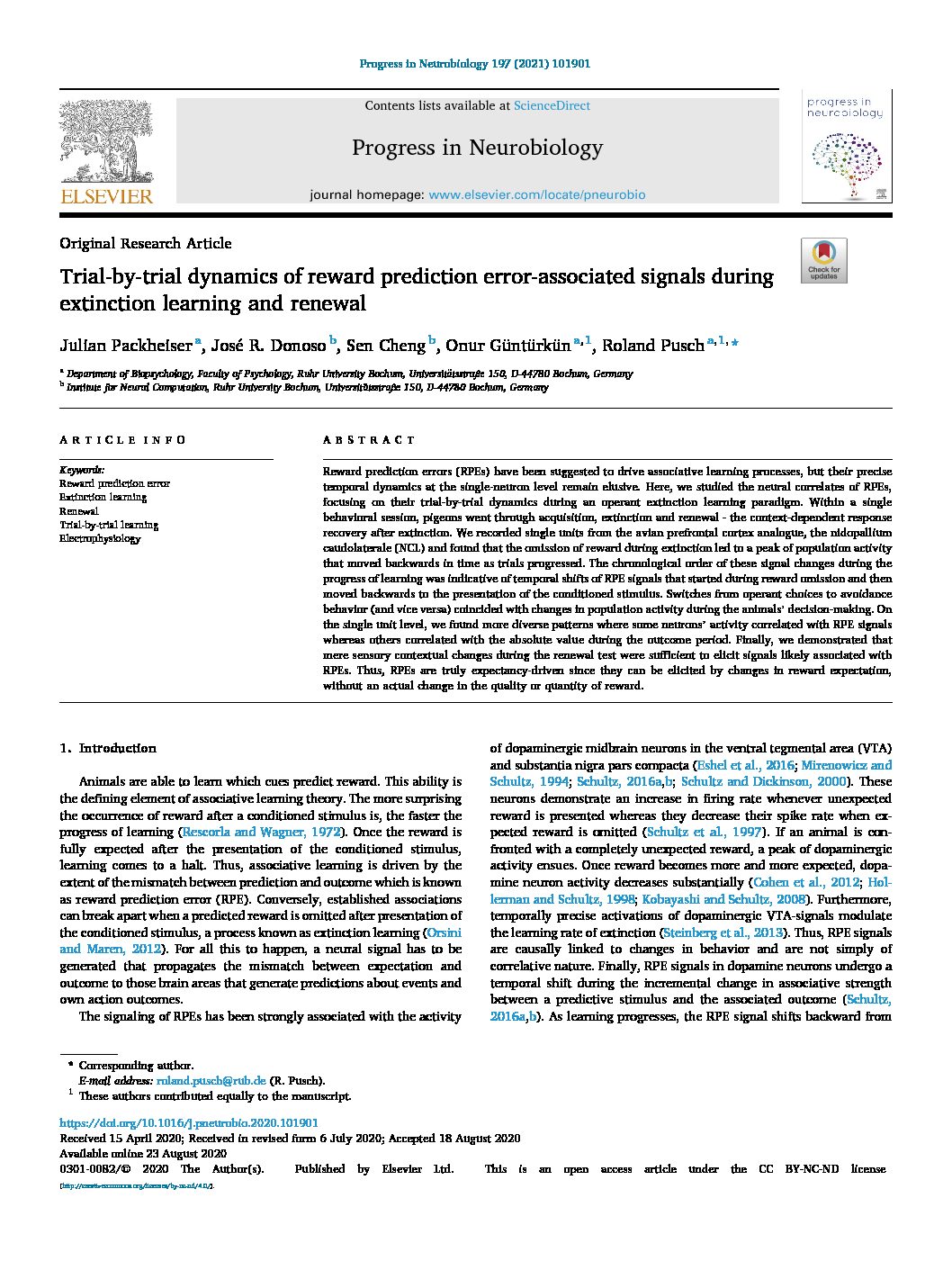
Güntürkün, 2021
Ein Leben ohne Schmerz? Eine kritische Analyse transhumanistischer Anliegen zur technologischen Überwindung von Schmerzen.
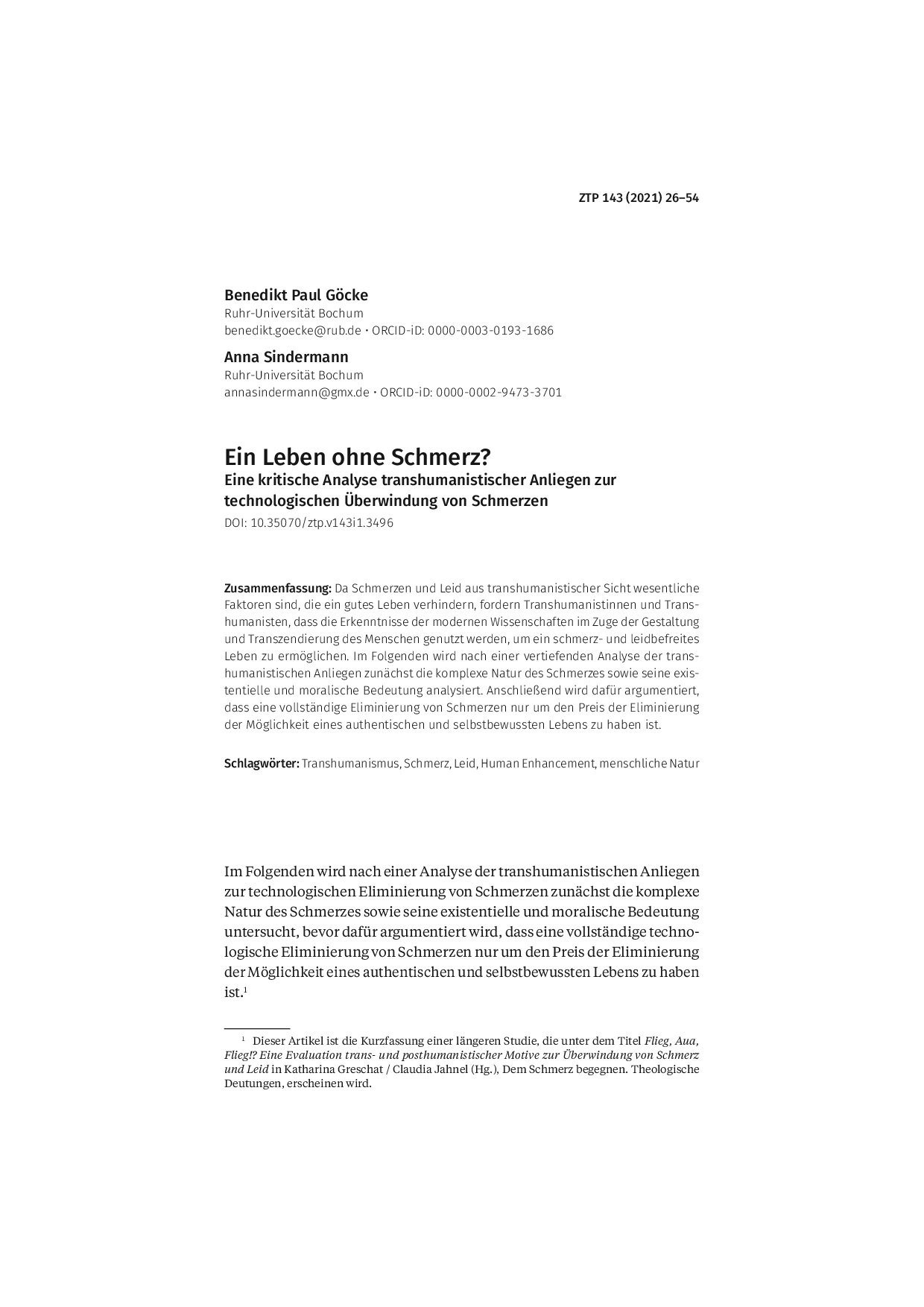
Göcke, 2021
Development of a Novice-Friendly Representation of Camouflaged Boolean Networks
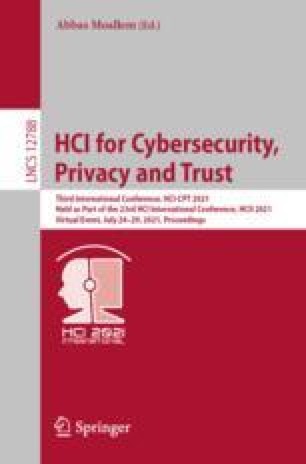
Elson, 2021
Cardiac parasympathetic activity in female patients with borderline personality disorder predicts approach/avoidance behavior towards angry faces
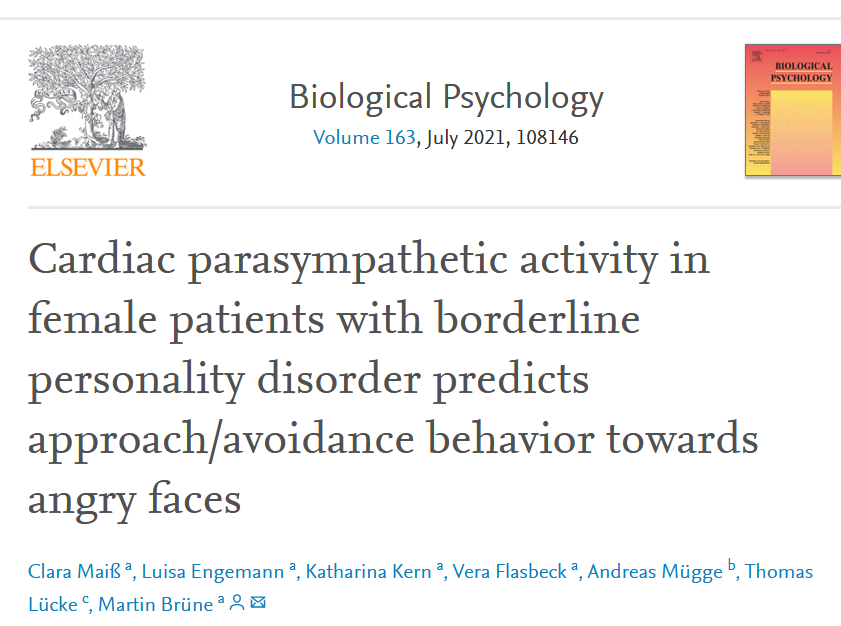
Brüne, 2021
Association between childhood maltreatment, psychopathology and DNA methylation of genes involved in stress regulation: Evidence from a study in Borderline Personality Disorder
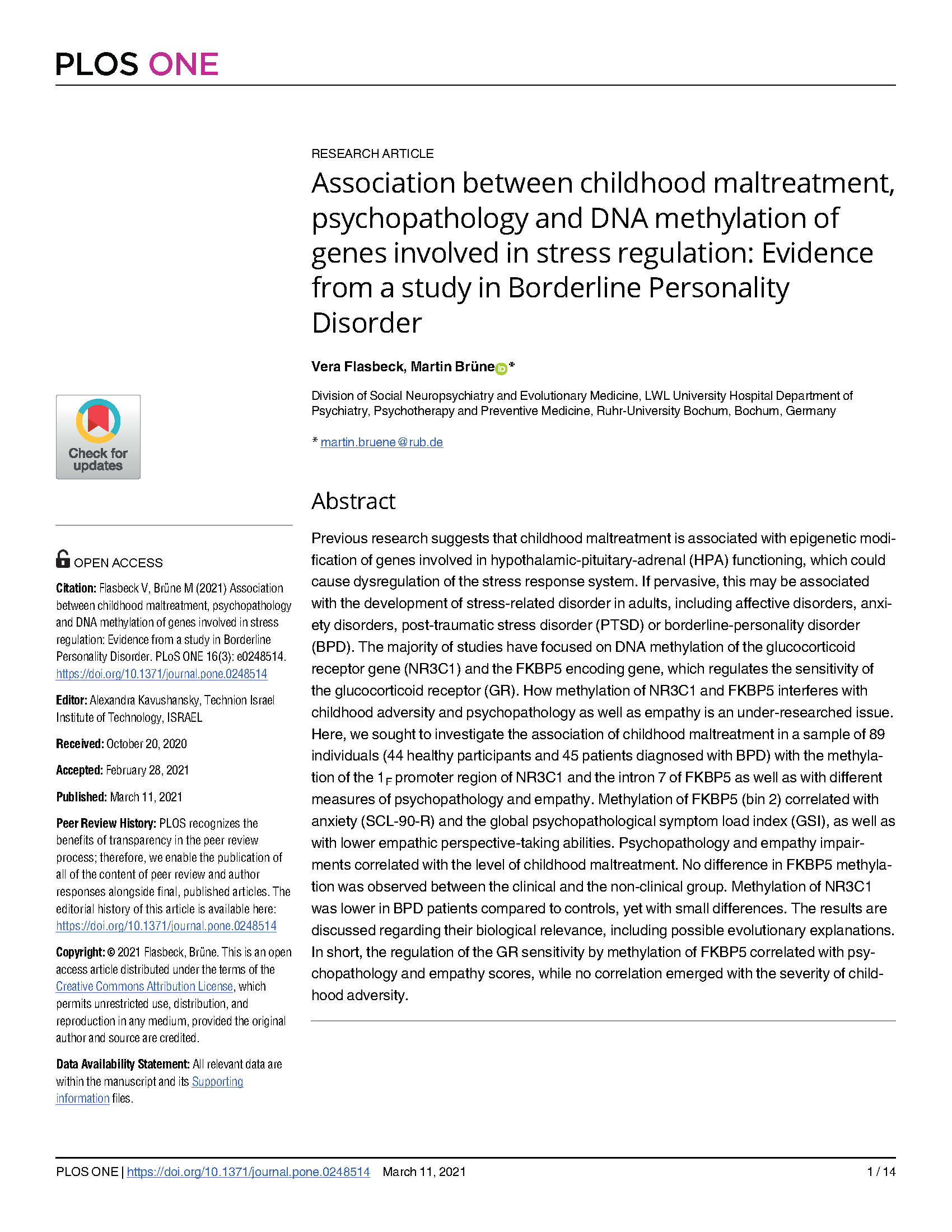
Brüne, 2021
Selected Publications 2020 - Click to show
Predicting the Past from Minimal Traces: Episodic Memory and its Distinction from Imagination and Preservation
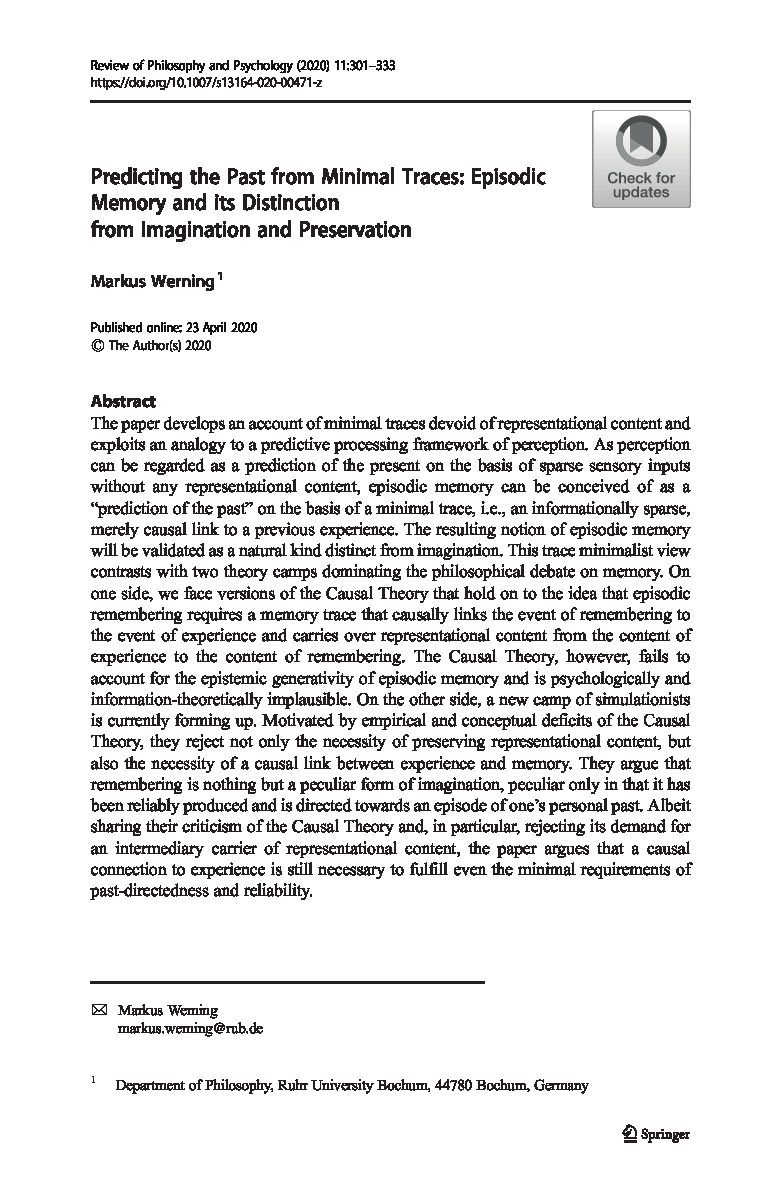
Werning, 2020
Werning, M. (2020). Predicting the Past from Minimal Traces: Episodic Memory and its Distinction from Imagination and Preservation. Review of Philosophy and Psychology, 1-33.
Deciding with dignity: The account of human dignity as an attitude and its implications for assisted suicide.
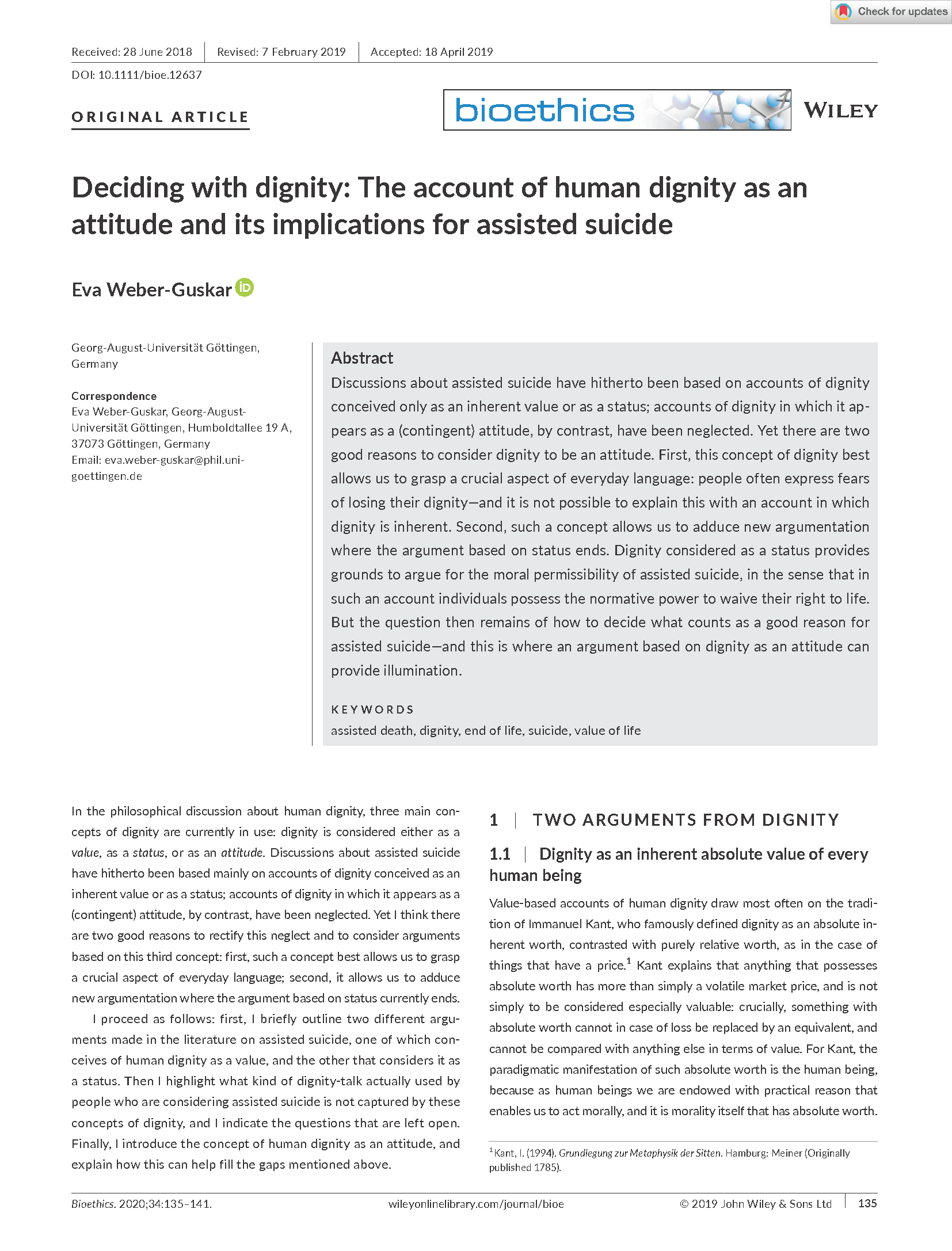
Weber-Guskar, 2020
Are frequent users of social network sites good information evaluators?: An investigation of adolescents’ sourcing abilities.
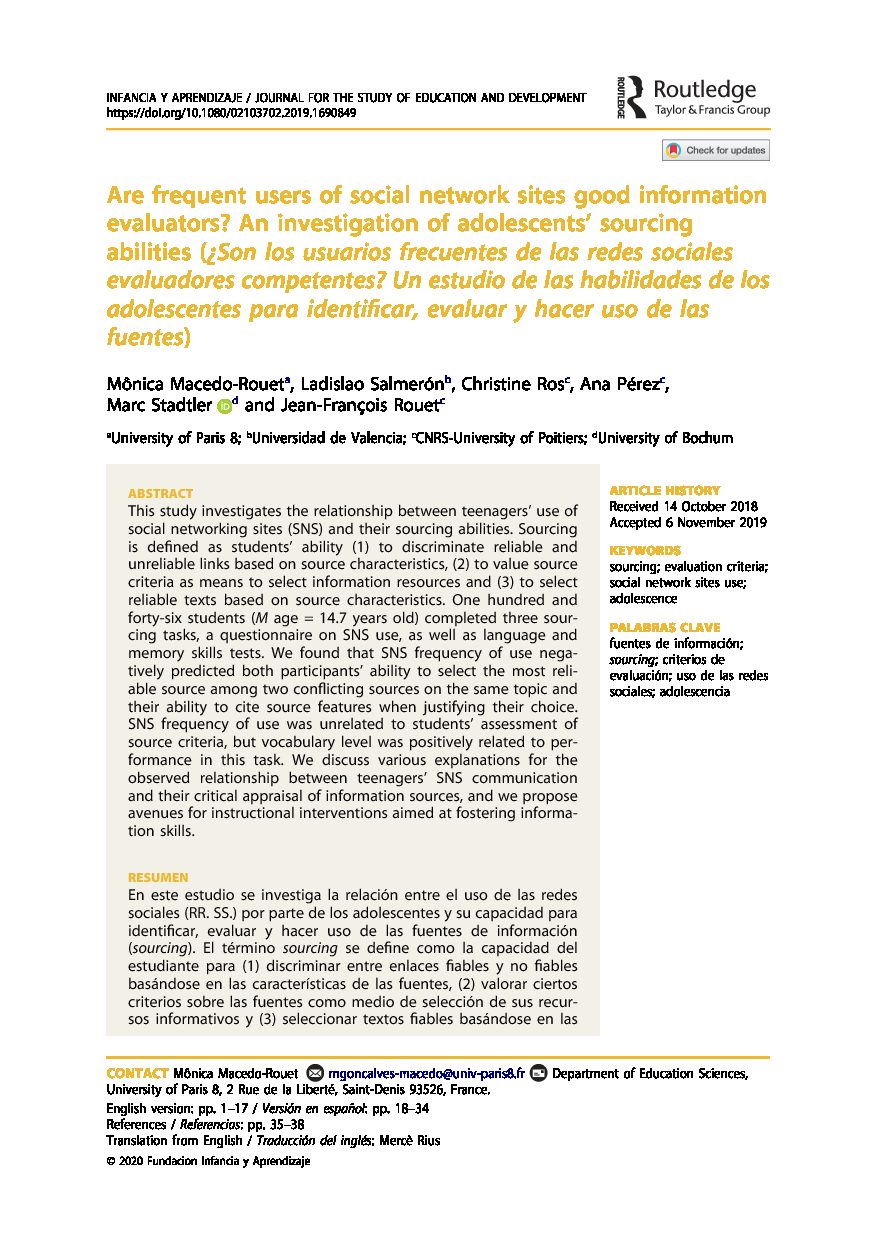
Stadtler, 2020
Grounding Spatial Language in Perception by Combining Concepts in a Neural Dynamic Architecture
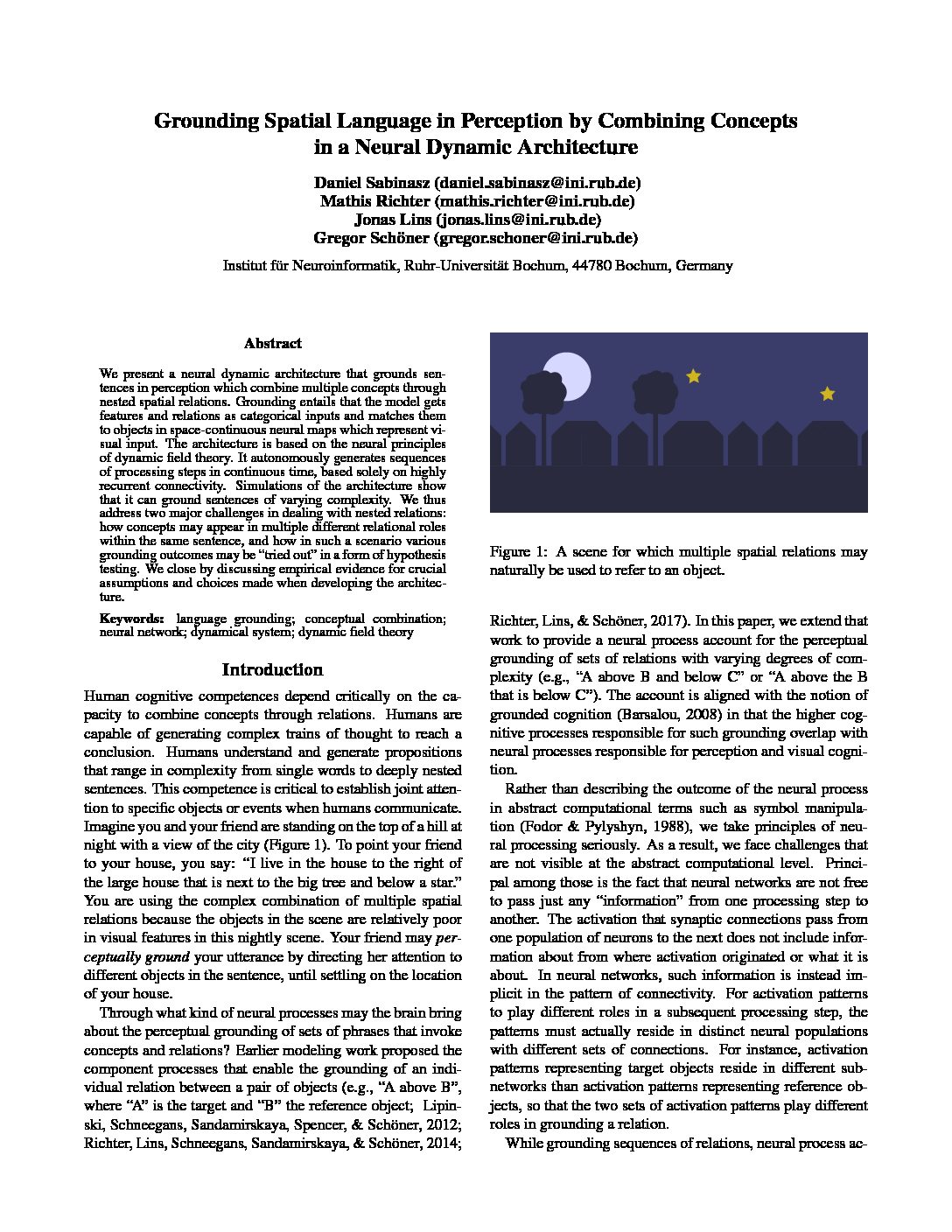
Schöner, 2020
Sabinasz, D., Richter, M., Lins, J., & Schöner, G. (2020). Grounding Spatial Language in Perception by Combining Concepts in a Neural Dynamic Architecture. In Proceedings of 42nd Annual Conference of the Cognitive Science Society.
Determining the Function of Social Referencing: The Role of Familiarity and Situational Threat
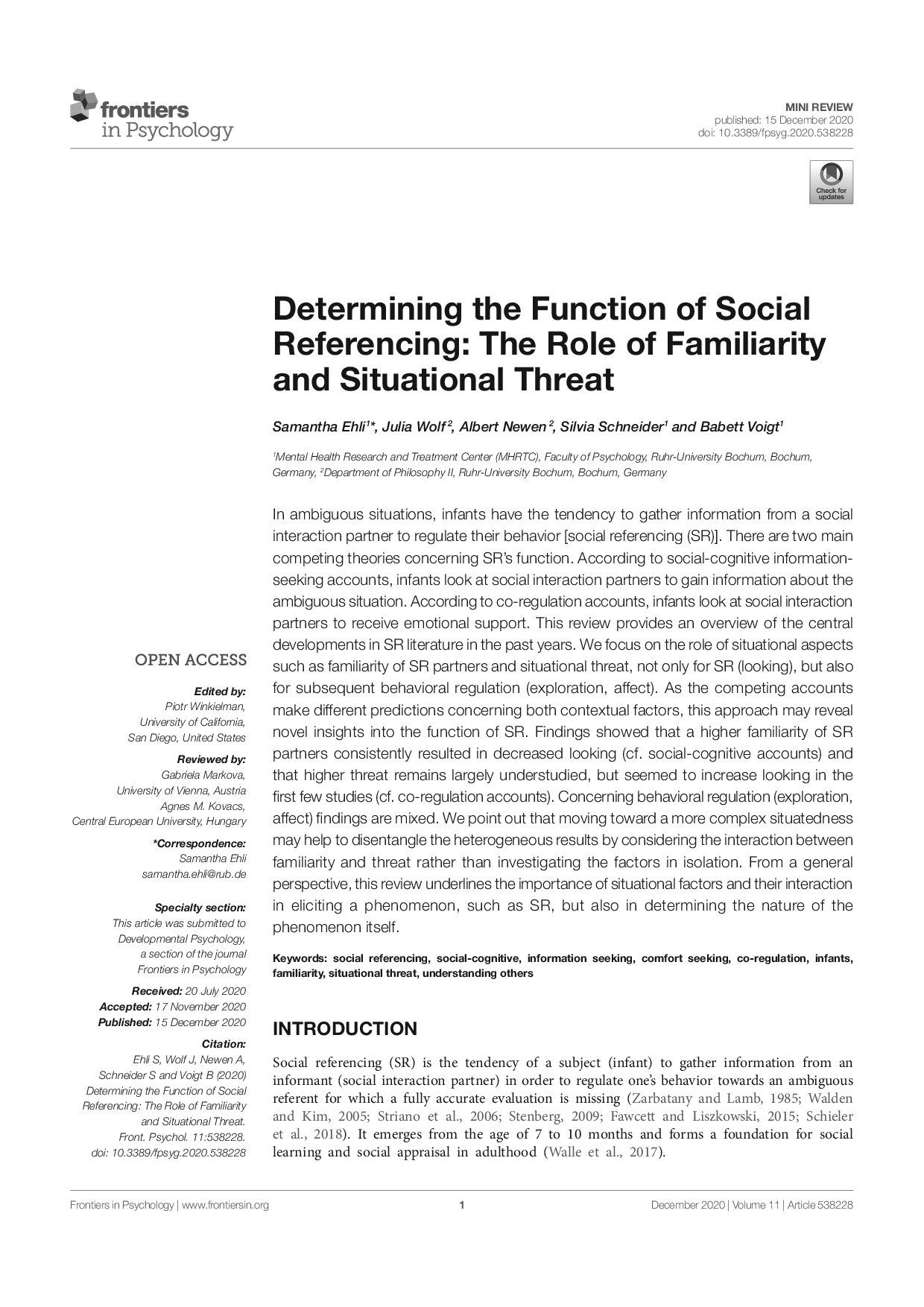
Schneider, 2020
Explaining or redefining mindreading?

Schlicht, 2020
Measuring causality between collaborative and individual gaze metrics for collaborative problem‐solving with intelligent tutoring systems
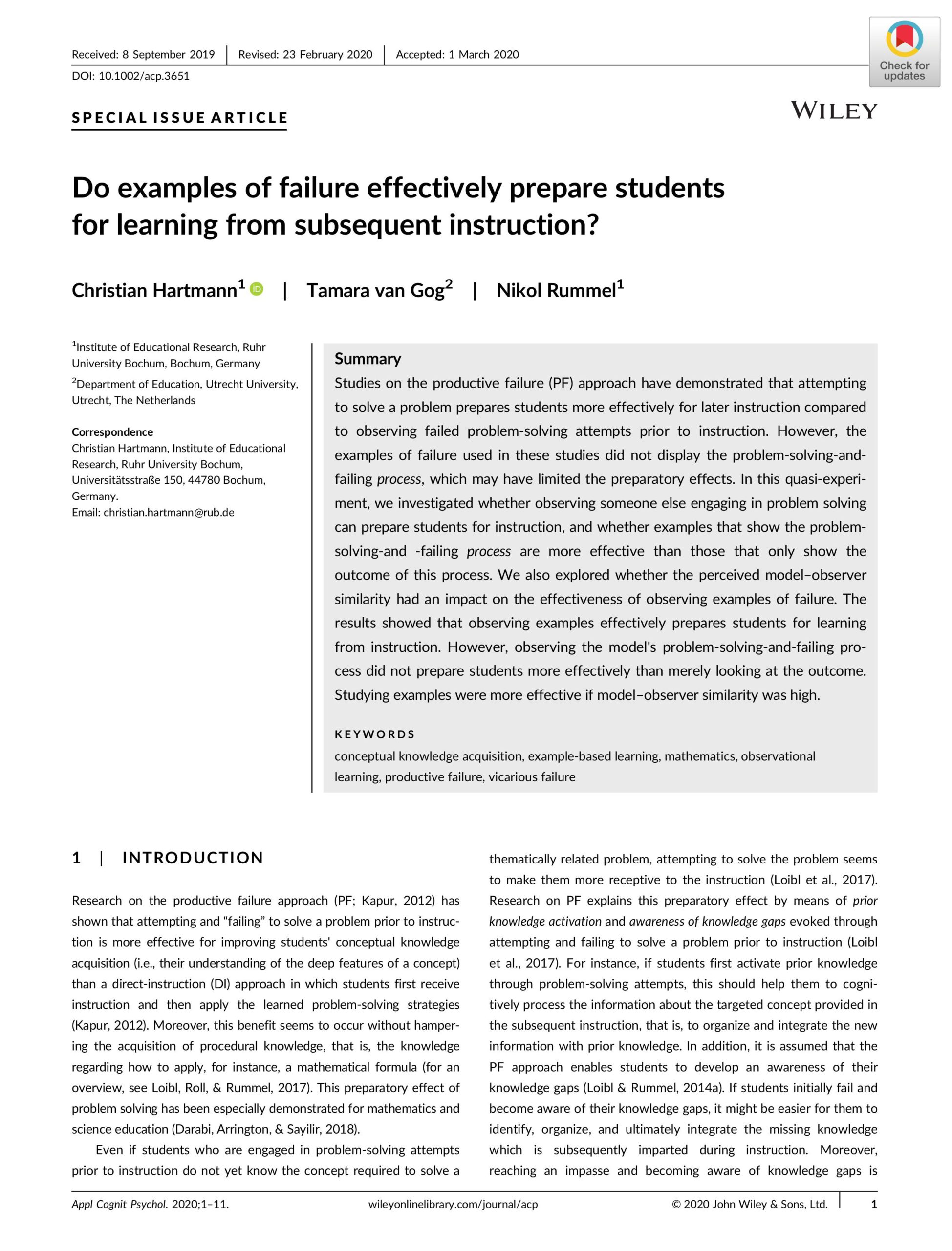
Rummel, 2020
How to ascribe beliefs to animals.
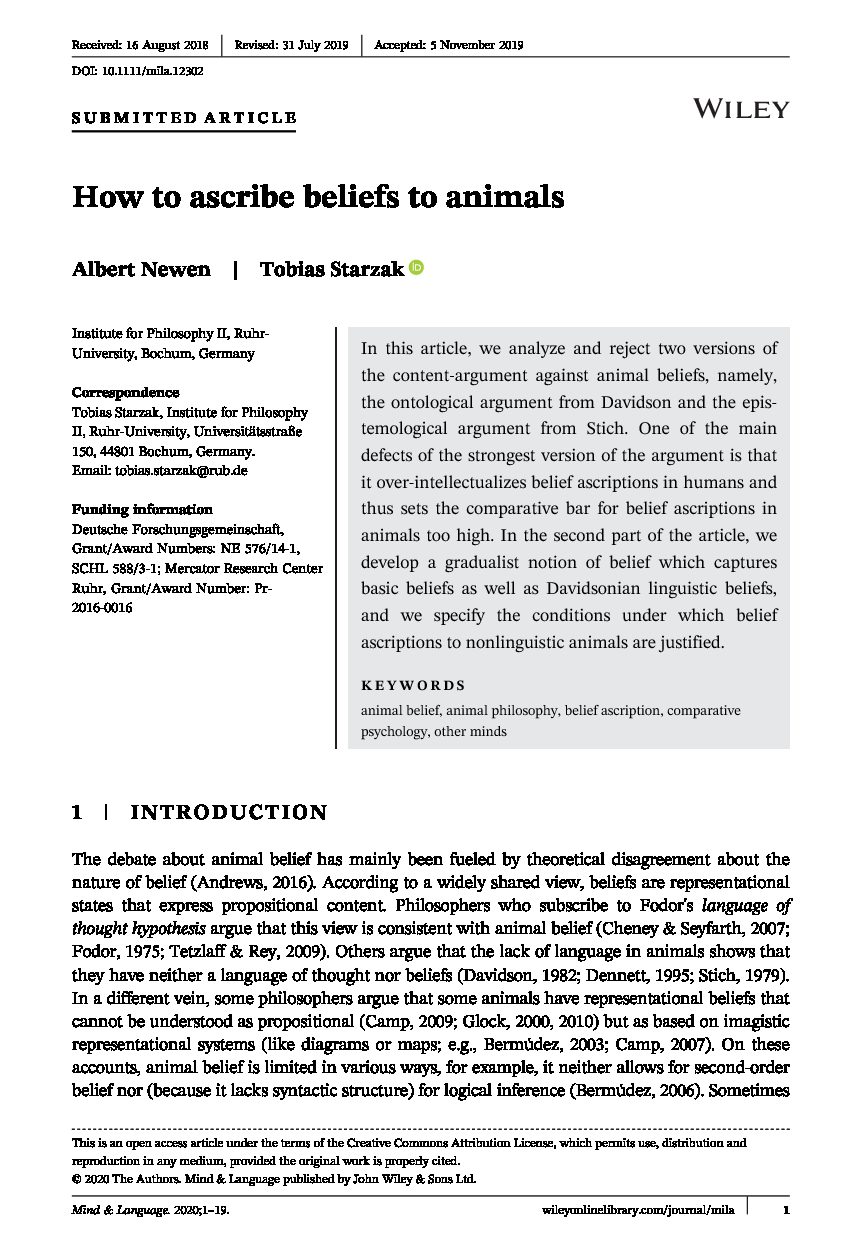
Newen, 2020
Starzak, T.,& Newen, A. (2020). How to ascribe beliefs to animals. Mind & Language, 1-19. https://doi.org/10.1111/mila.12302
The Situational Mental File Account of the False Belief Tasks: A New Solution of the Paradox of False Belief Understanding.
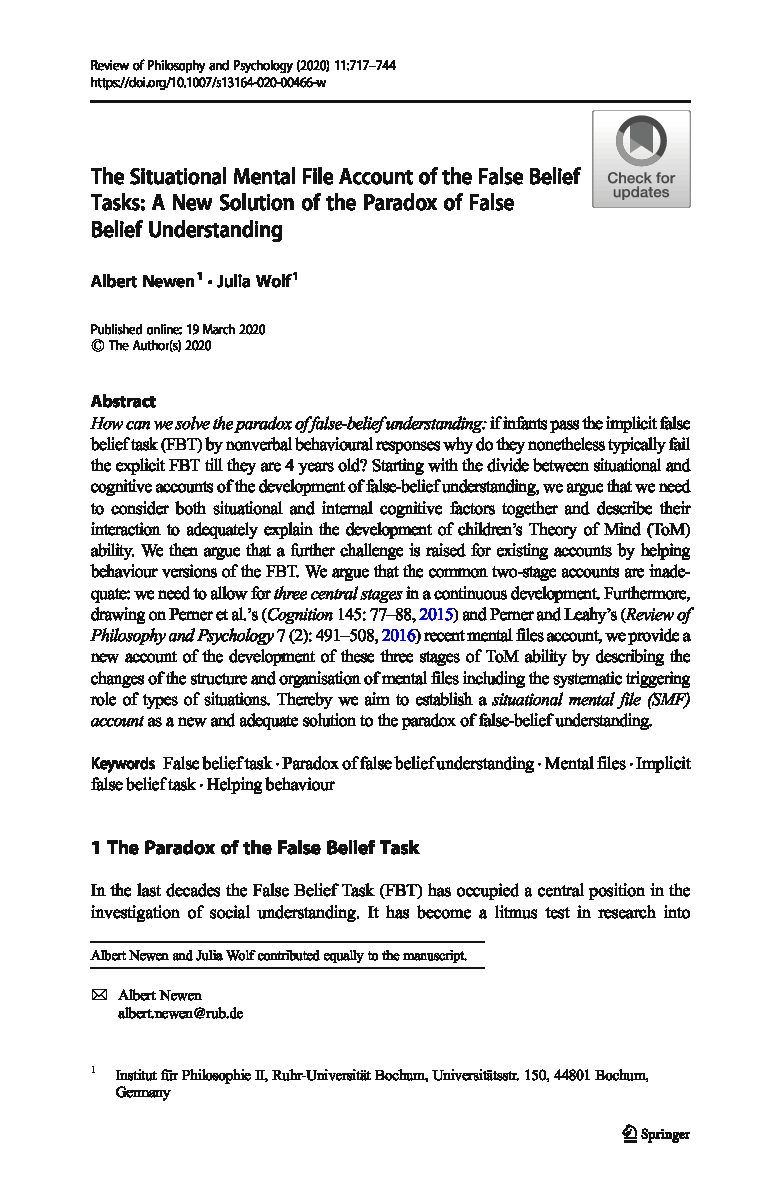
Newen, 2020
Newen, A., & Wolf, J. (2020). The Situational Mental File Account of the False Belief Tasks: A New Solution of the Paradox of False Belief Understanding. Review of Philosophy and Psychology, 1-28.https://doi.org/10.1007/s13164-020-00466-w
Harmonic/Percussive Sound Separation and Spectral Complexity Reduction of Music Signals for Cochlear Implant Listeners.
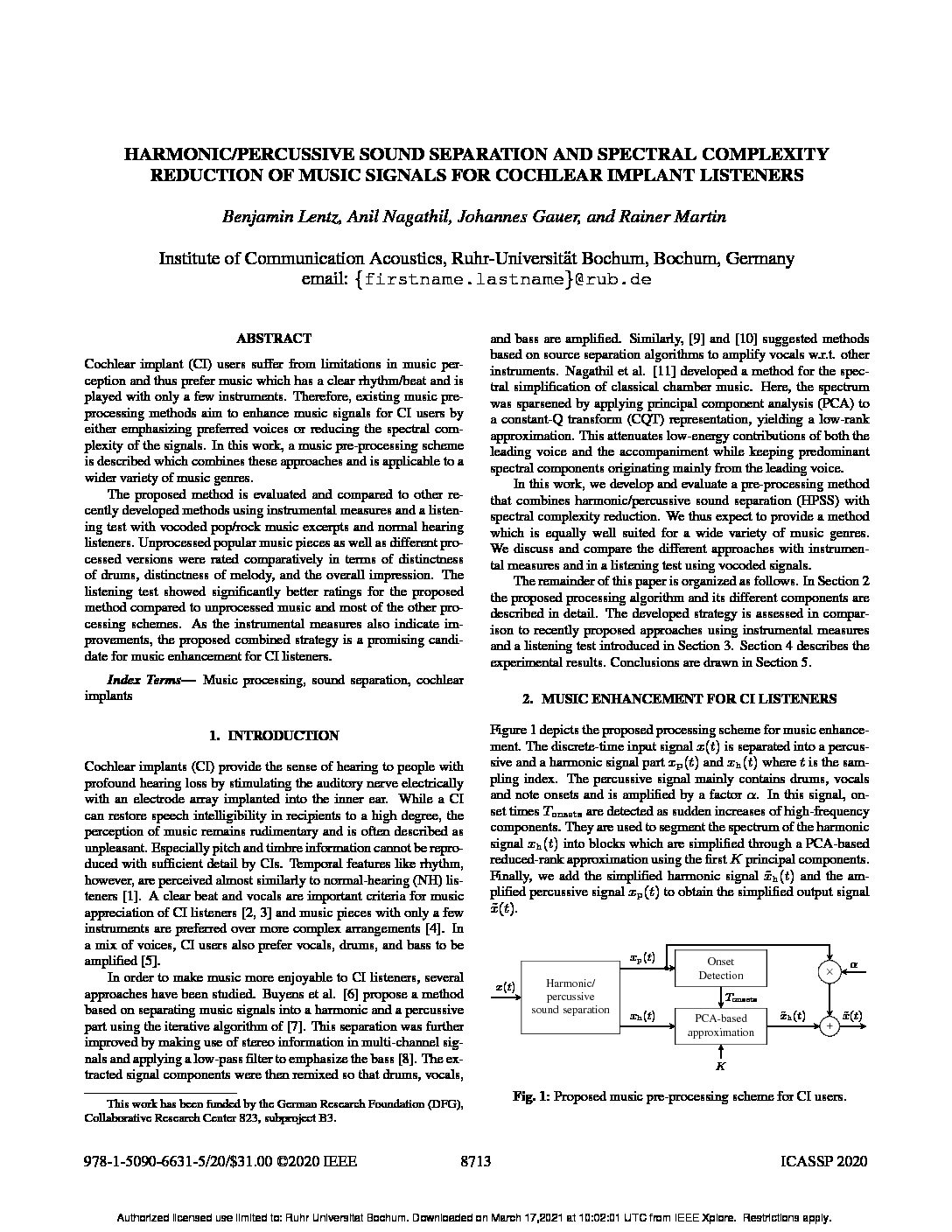
Martin, 2020
Binaural Direct-to-Reverberant Energy Ratio and Speaker Distance Estimation.
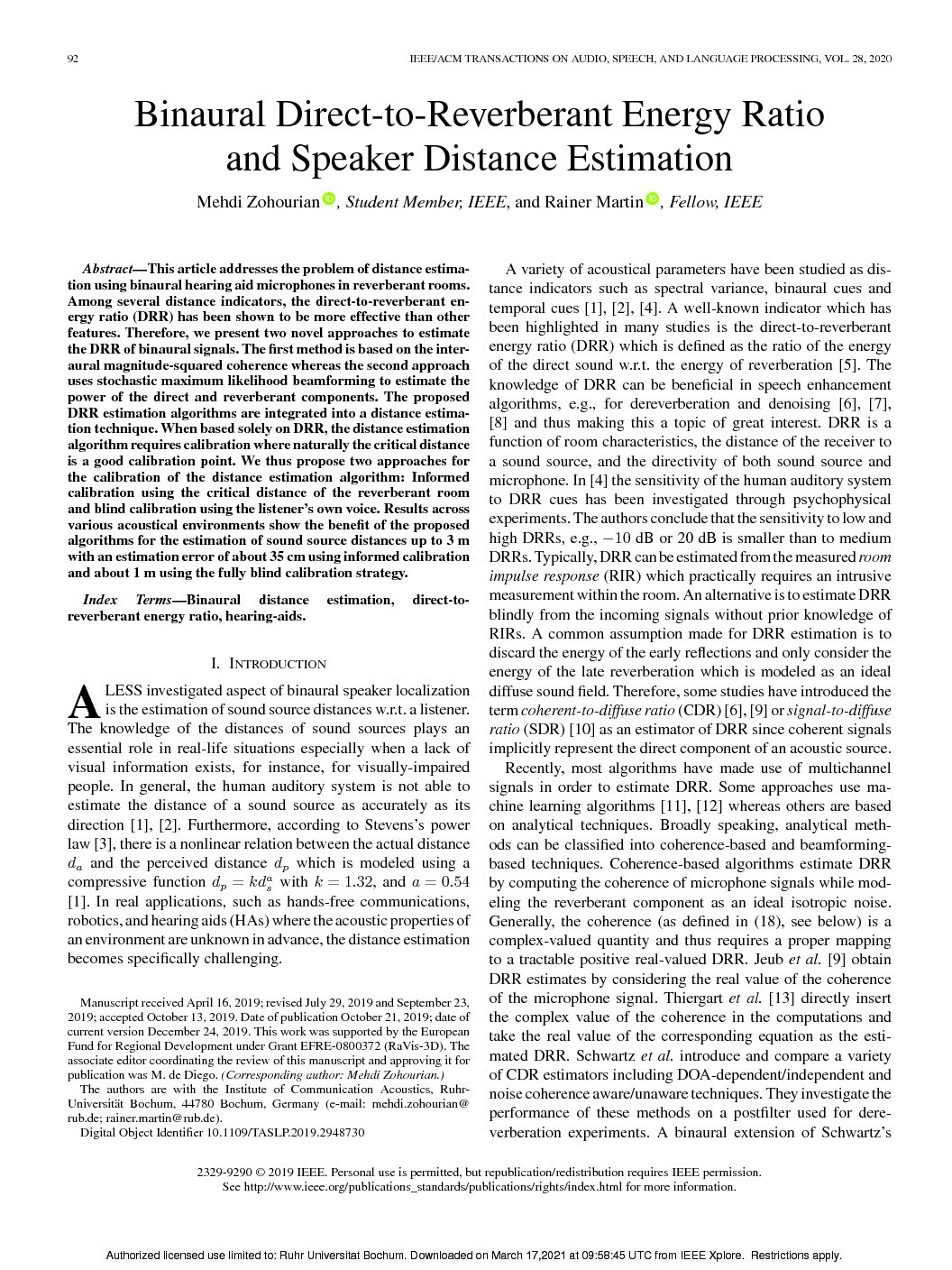
Martin, 2020
Hippocampal Synaptic Plasticity, Spatial Memory, and Neurotransmitter Receptor Expression Are Profoundly Altered by Gradual Loss of Hearing Ability
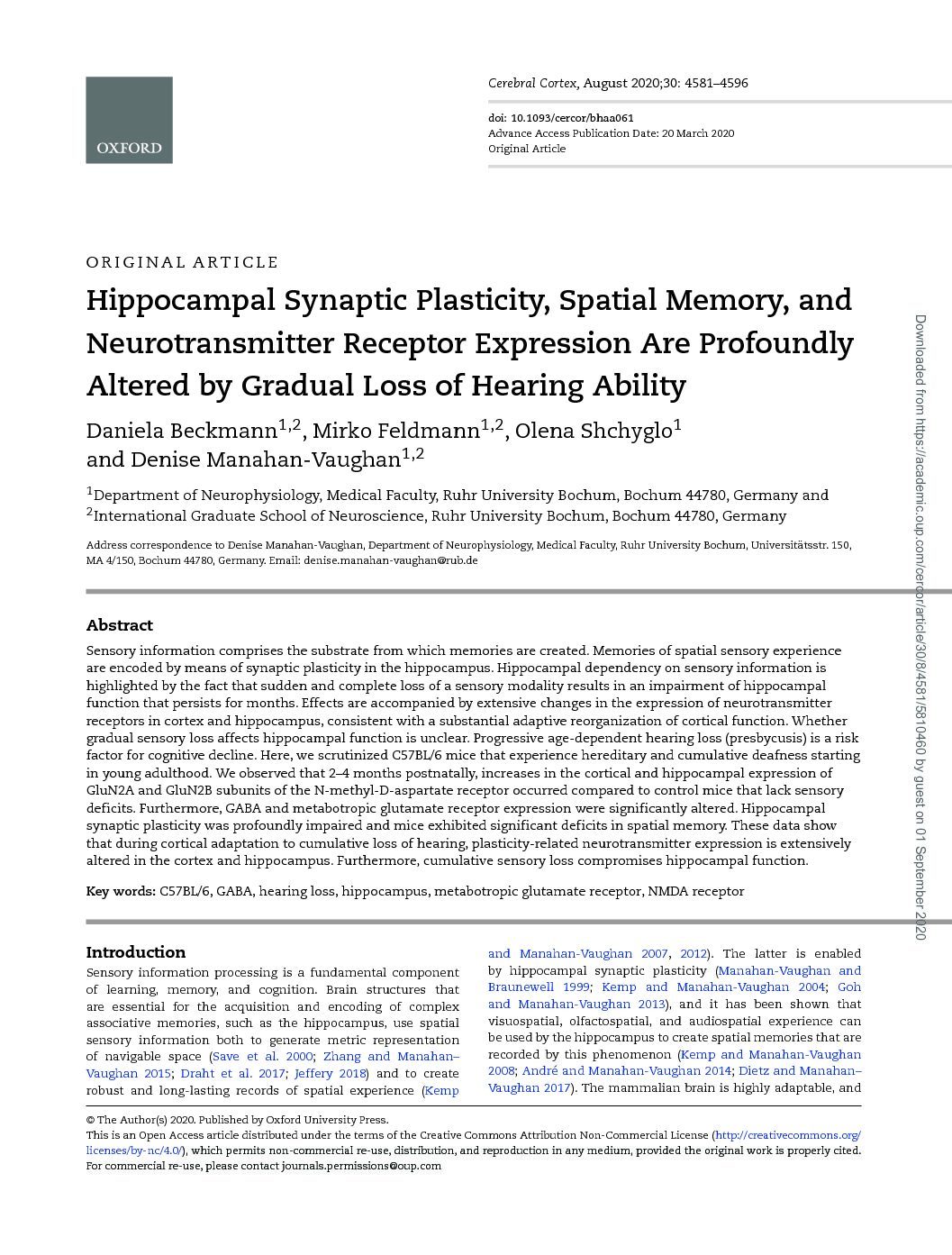
Manahan-Vaughan, 2020
Cerebellar-hippocampal processing in passive perception of visuospatial change: An ego- and allocentric axis?
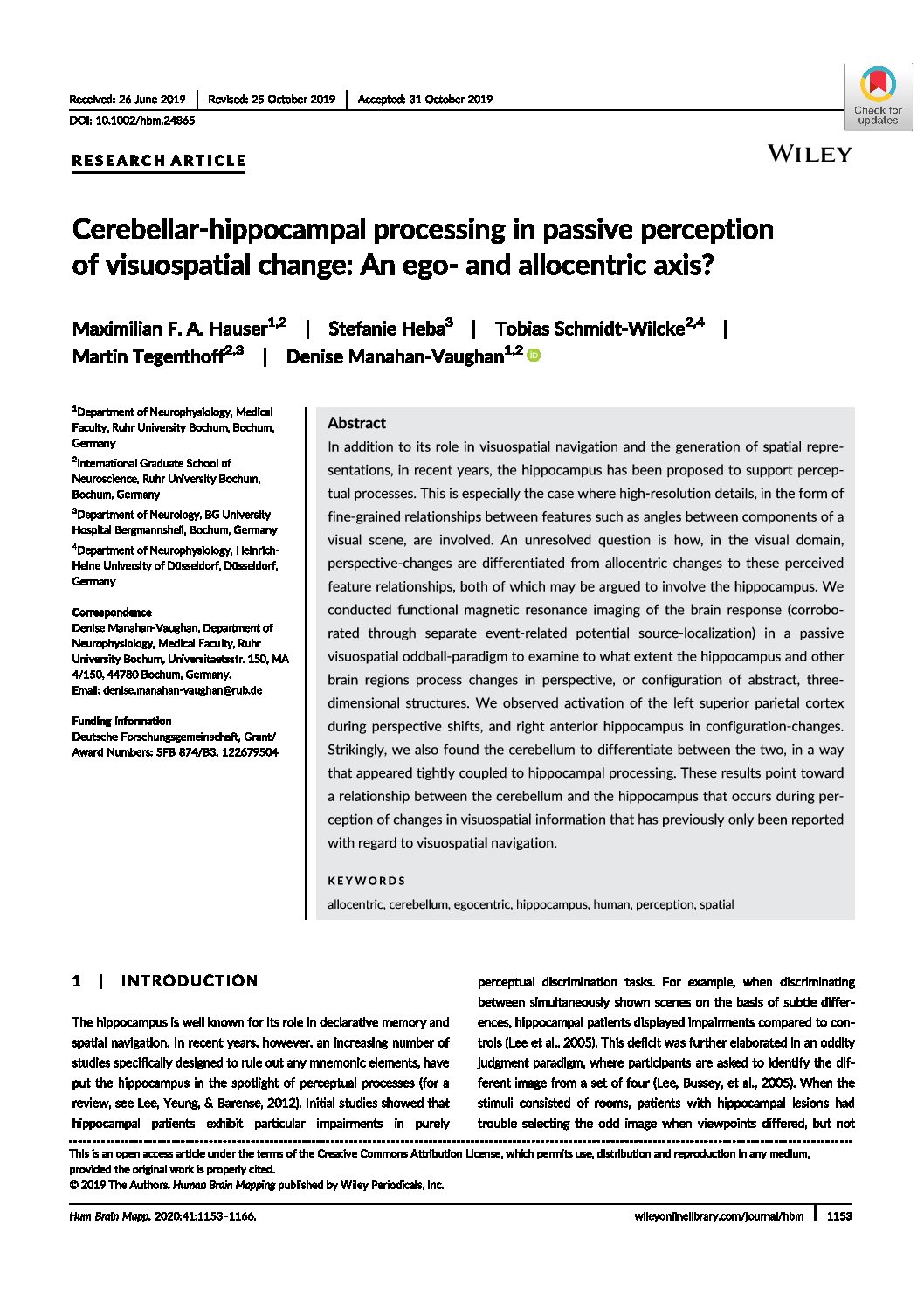
Manahan-Vaughan, 2020
Early childhood deprivation is associated with alterations in adult brain structure despite subsequent environmental enrichment
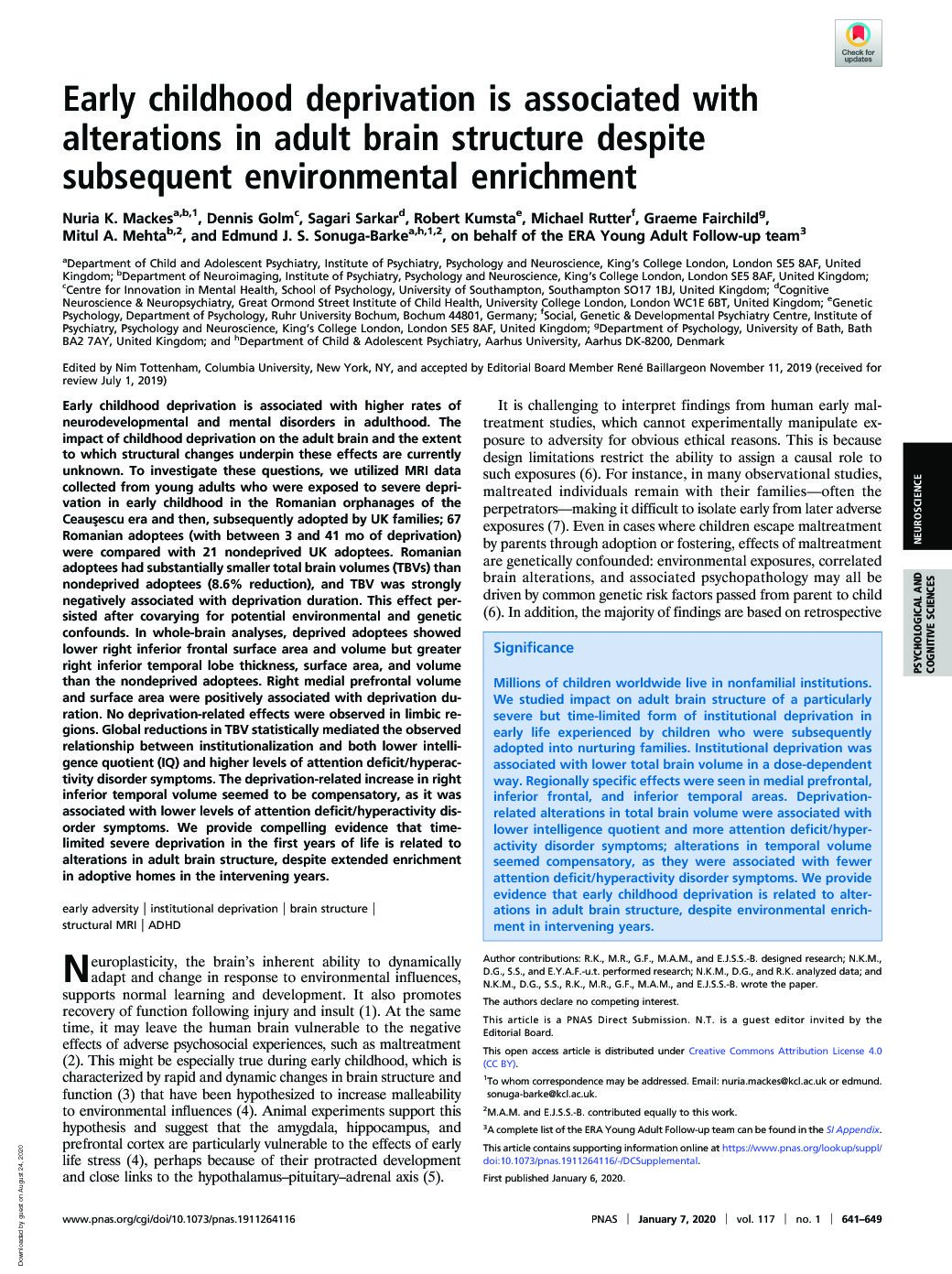
Kumsta, 2020
Stress genomics revisited: Gene co-expression analysis identifies molecular signatures associated with childhood adversity
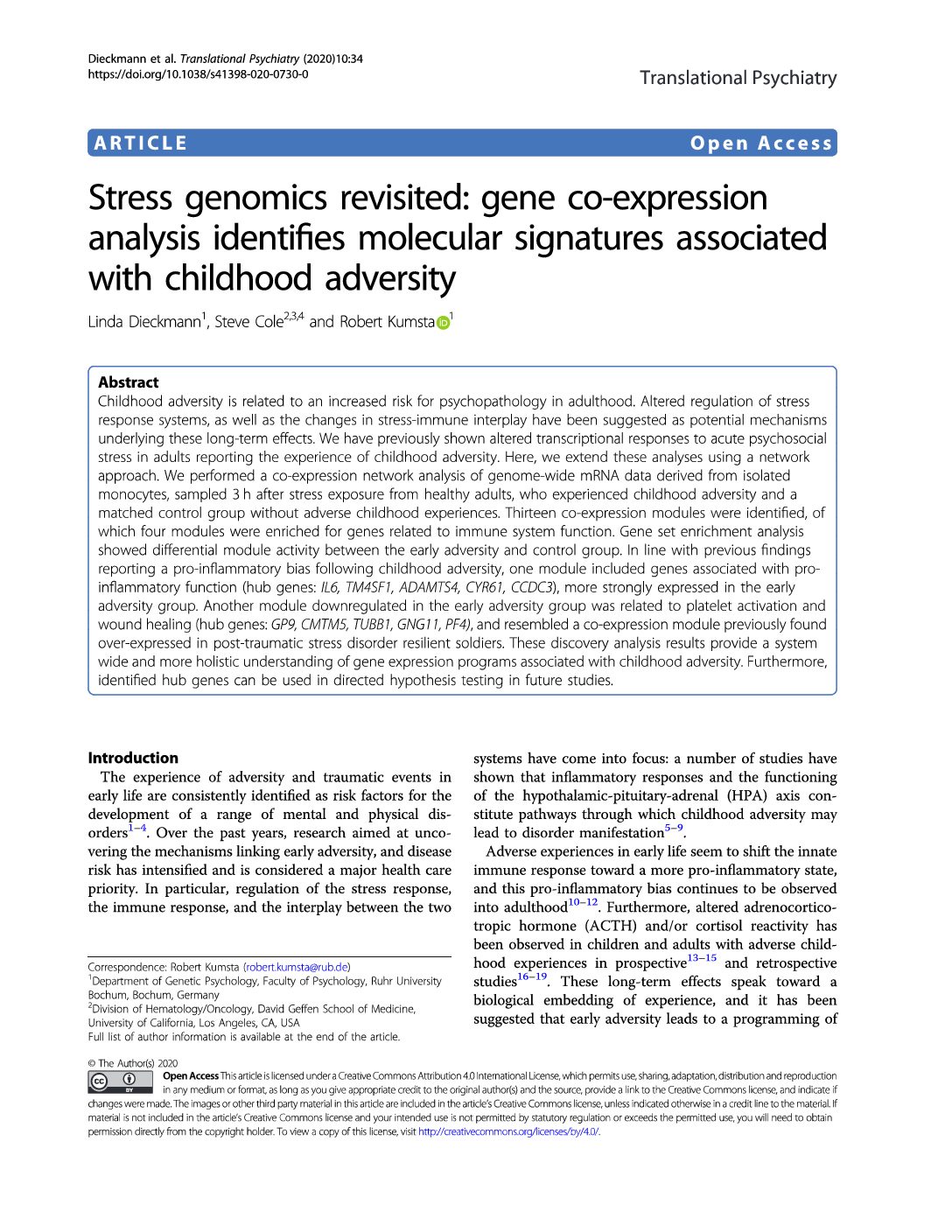
Kumsta, 2020
Audiovisual Speaker Tracking Using Nonlinear Dynamical Systems With Dynamic Stream Weights
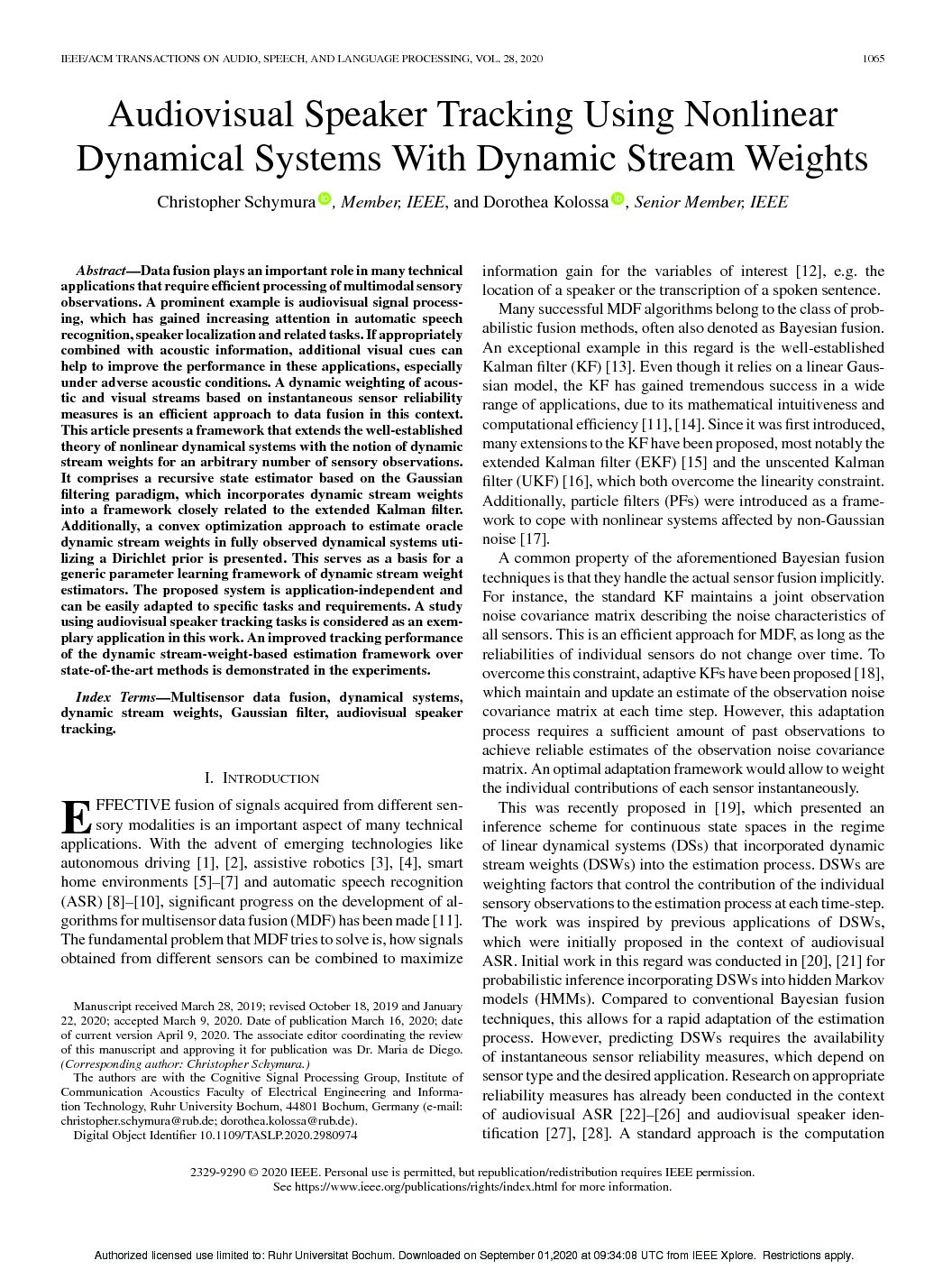
Kolossa, 2020
Intuitive Expertise and Irrelevant Options
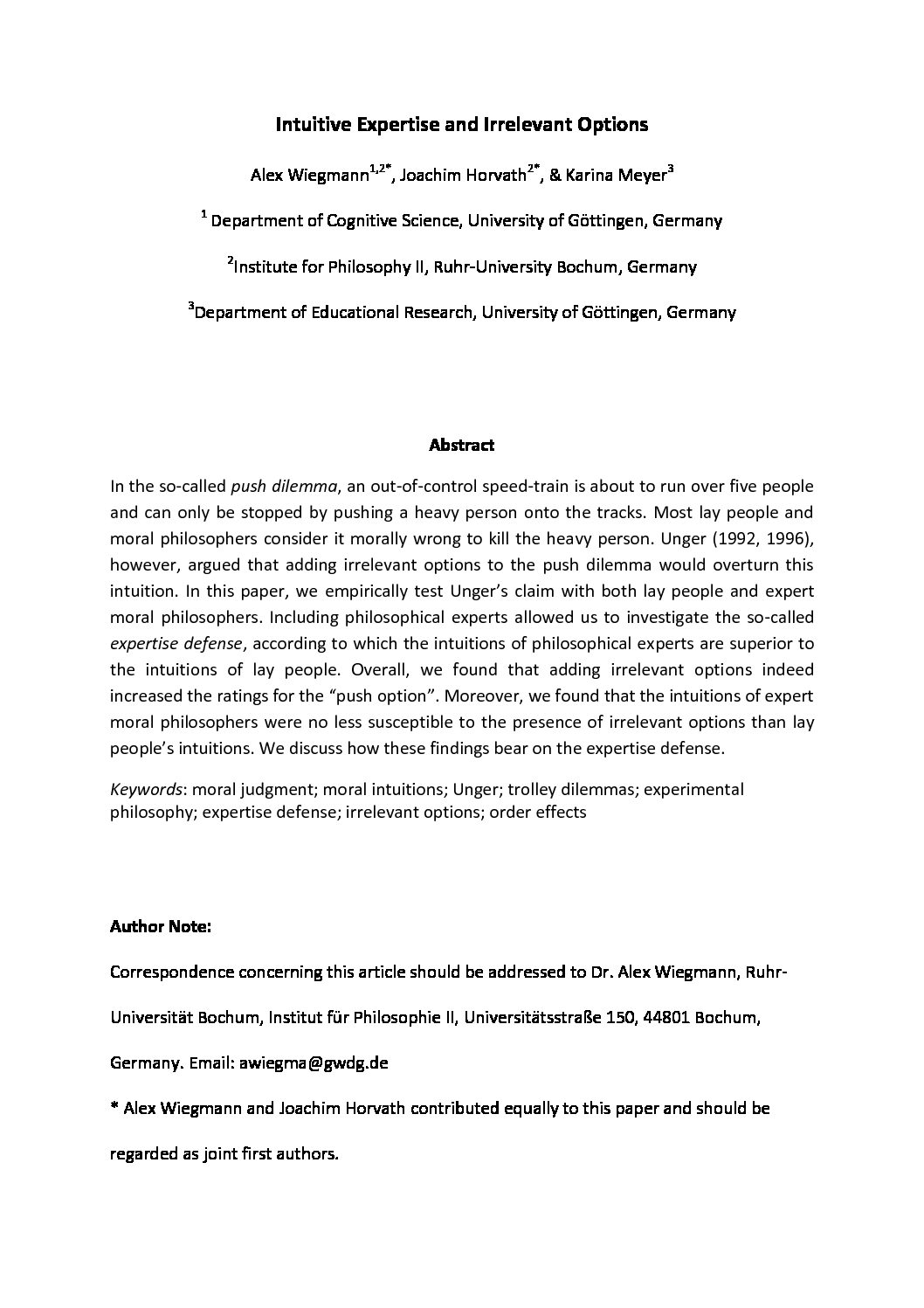
Horvath, 2020
Understanding as a Source of Justification
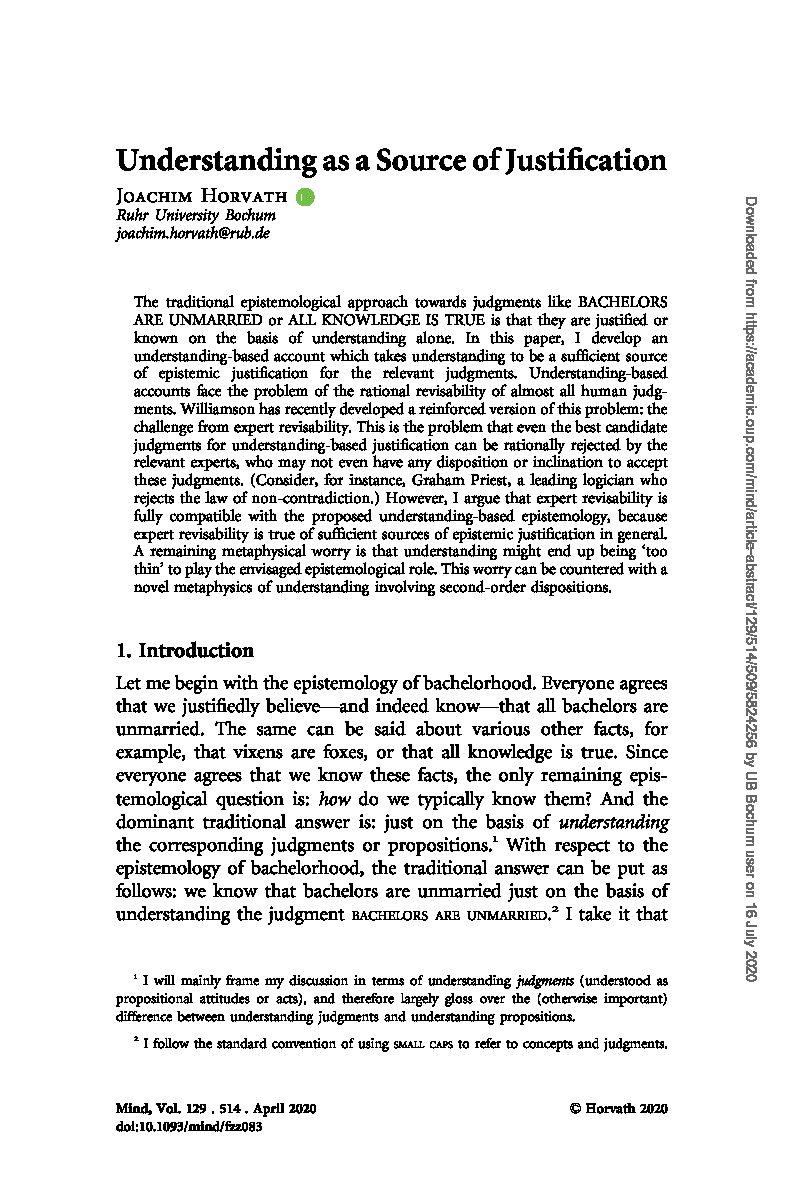
Horvath, 2020
Brain Lateralization: A Comparative Perspective
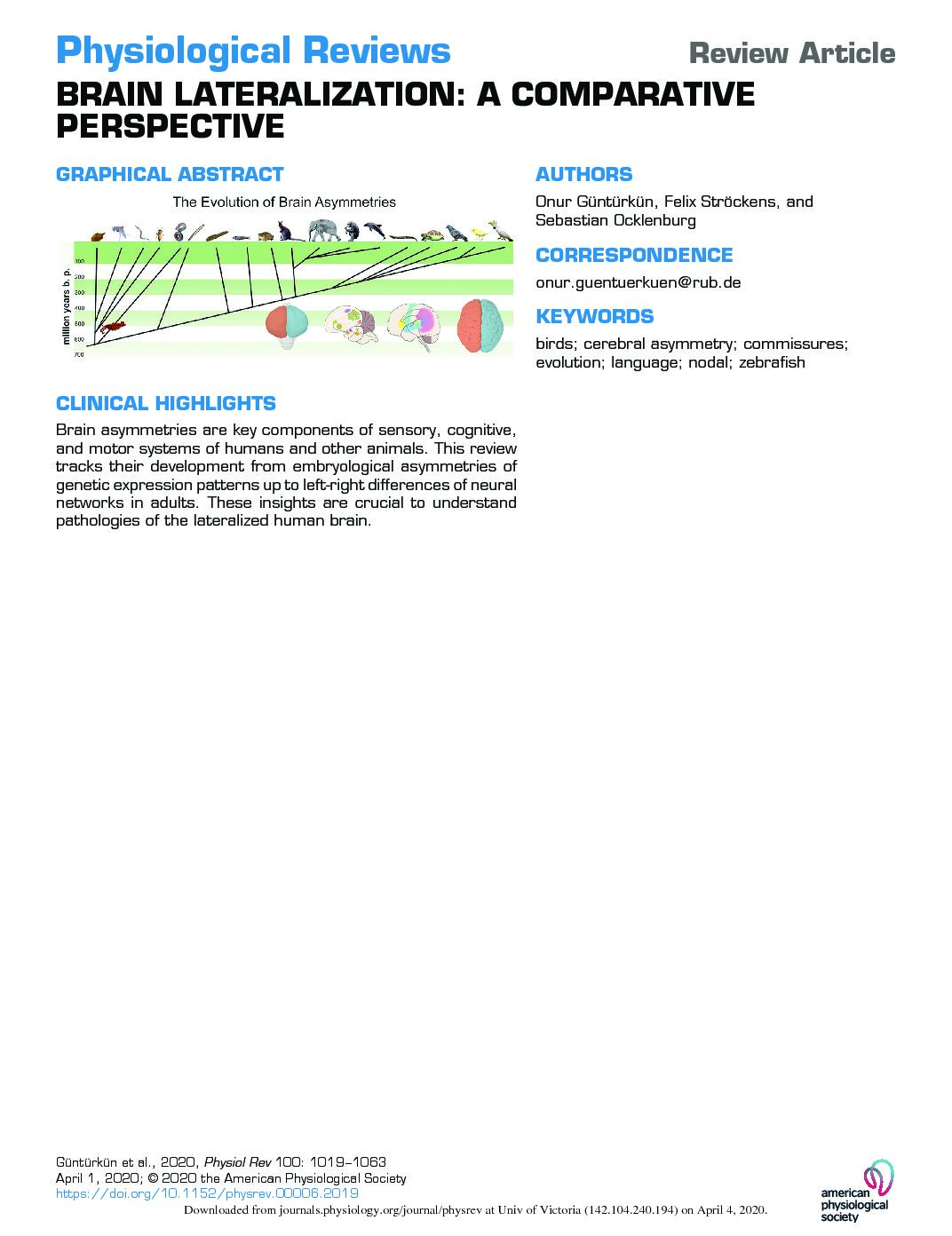
Güntürkün, 2020
A cortex-like canonical circuit in the avian forebrain.
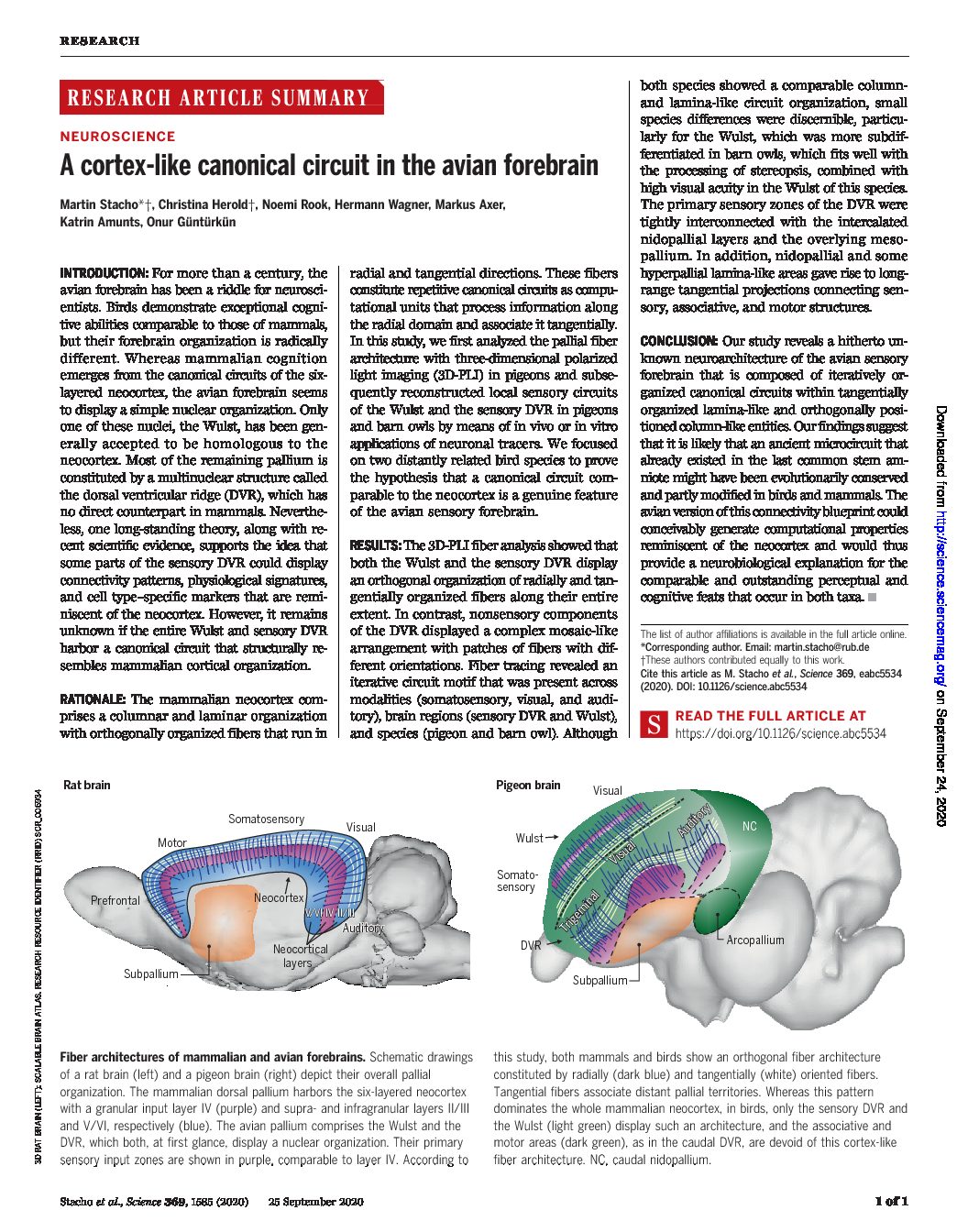
Güntürkün, 2020
Artificial Intelligence: Reflections in Philosophy, Theology, and the Social Sciences.

Göcke, 2020
The impact of inducing troubleshooting strategies via visual aids on performance in a computerized digital network task

Elson, 2020
Creative manual code obfuscation as a countermeasure against software reverse engineering.
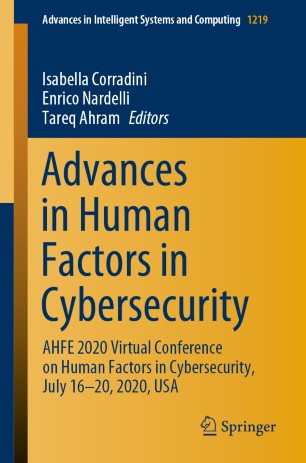
Elson, 2020
Improving sensory representations using episodic memory
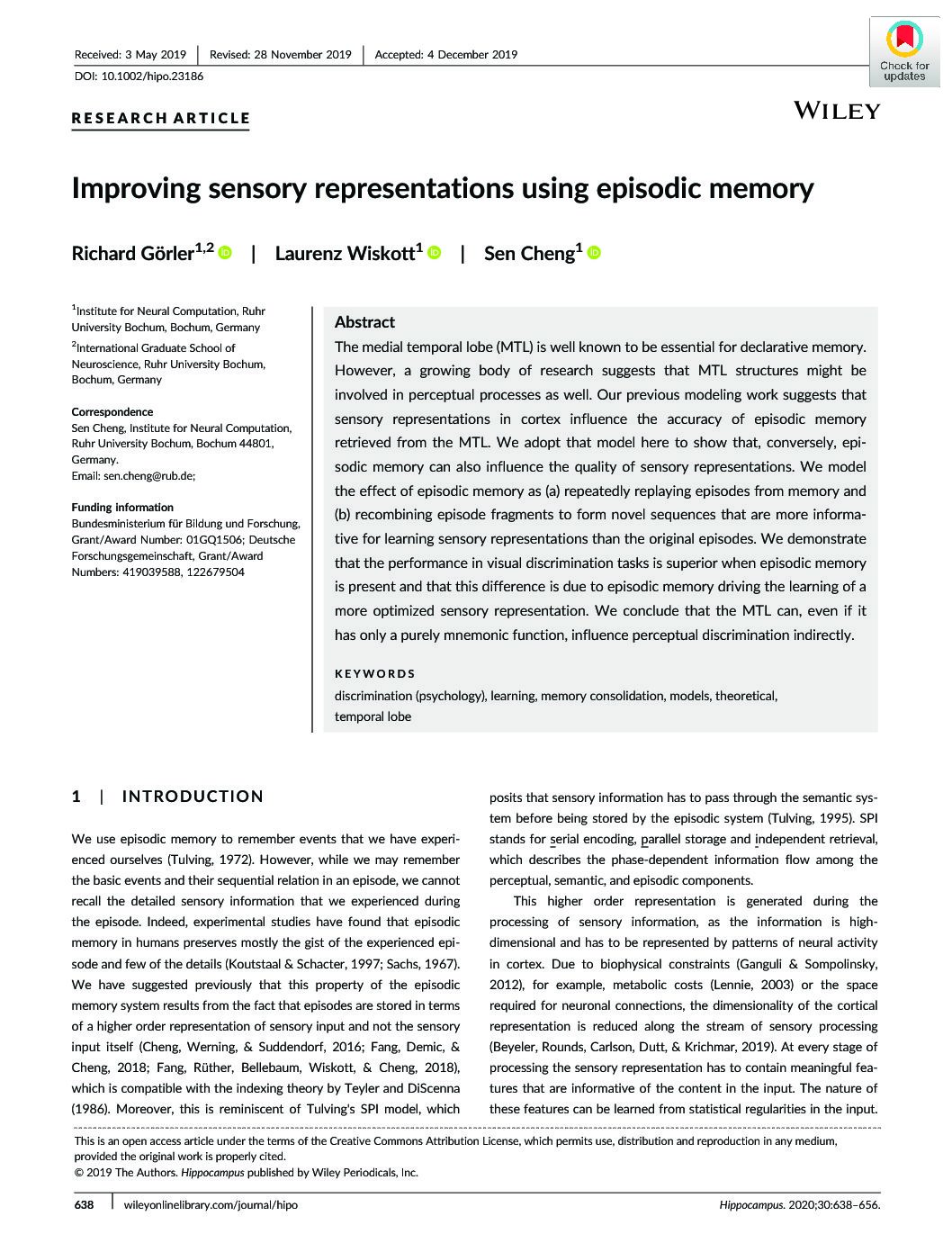
Cheng, 2020
Exploring nonverbal synchrony in borderline personality disorder: A double-blind placebo-controlled study using oxytocin
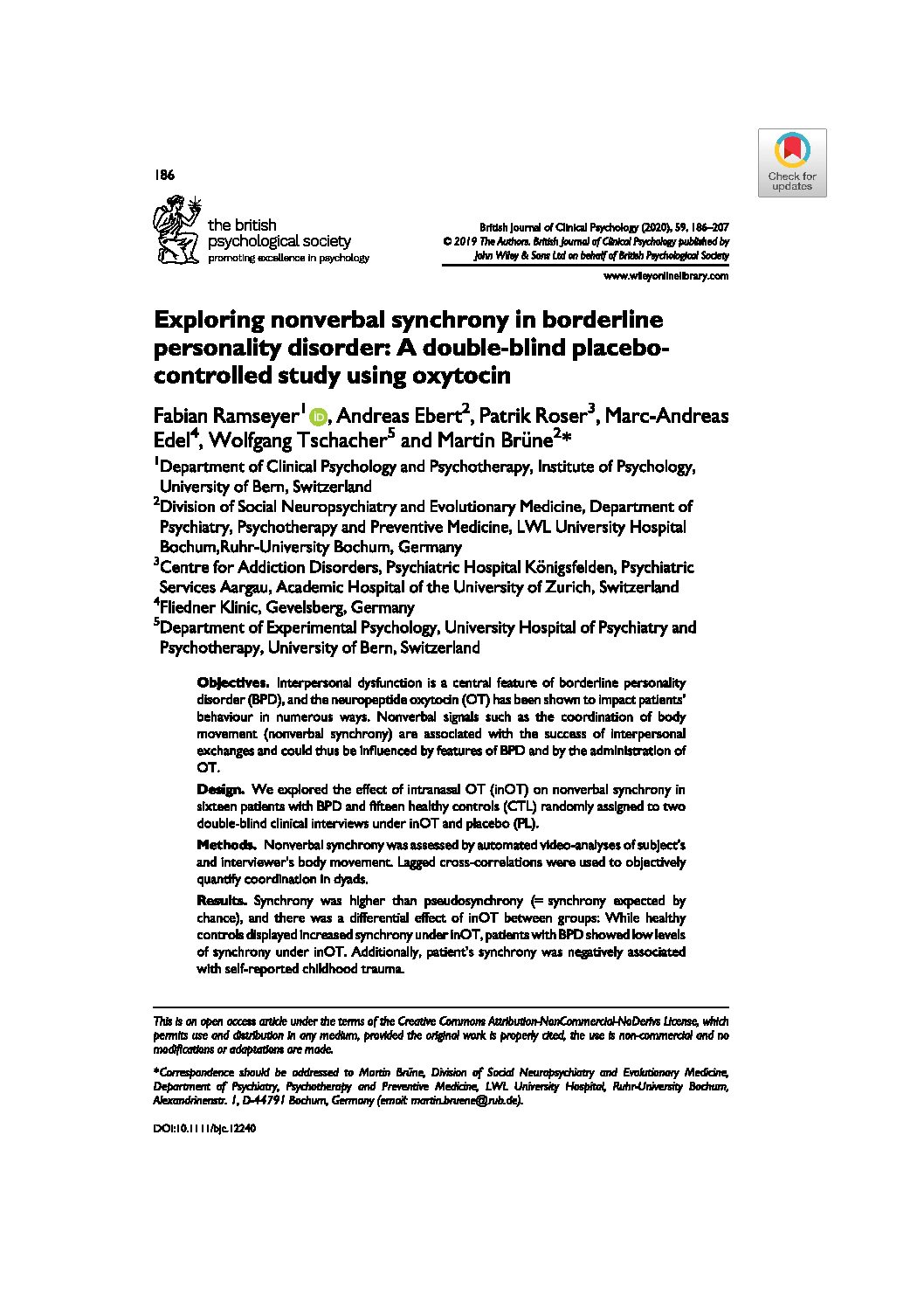
Brüne, 2020
Schizophrenia as parasitic behavior manipulation: Can we put together the pieces of an evolutionary puzzle?
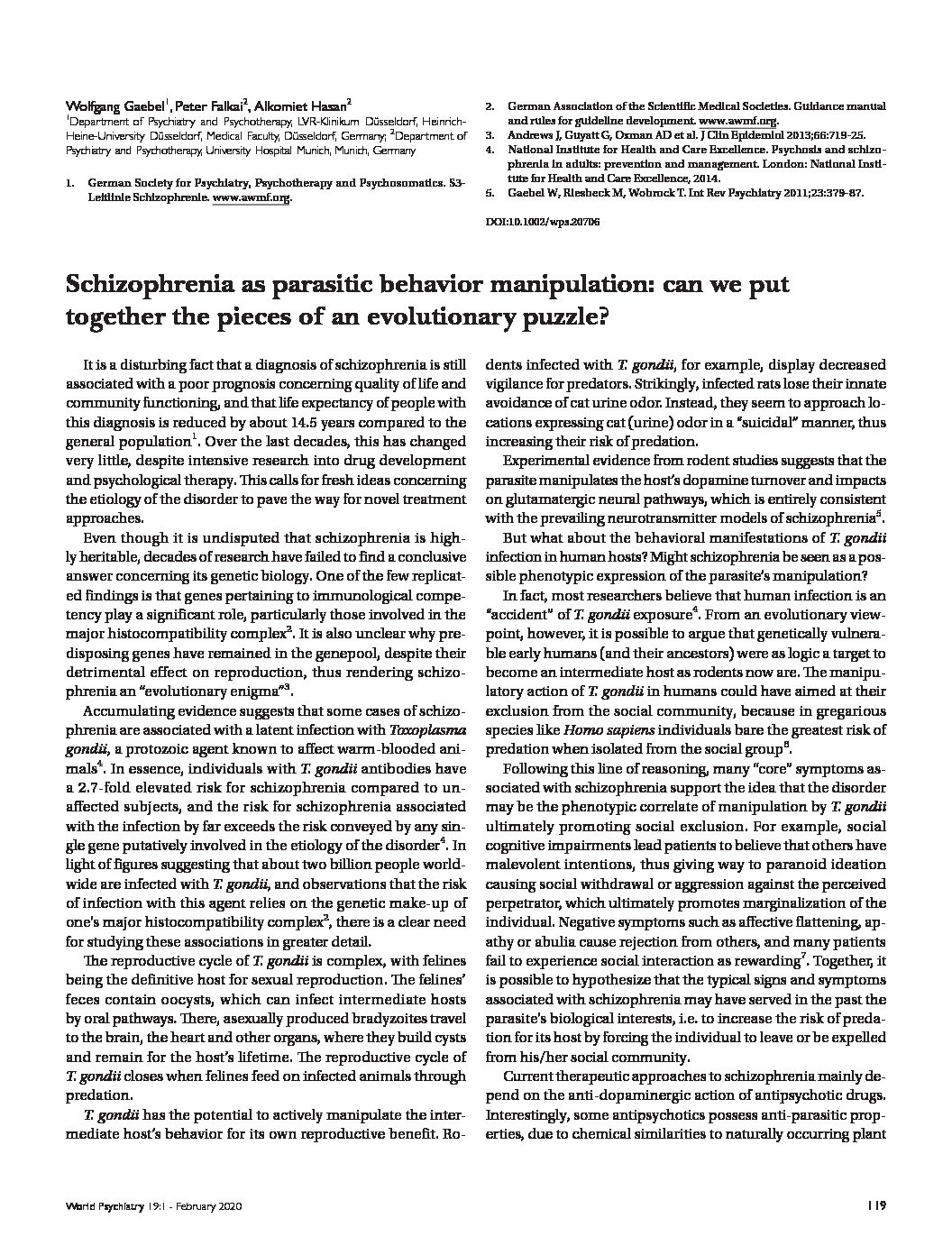
Brüne, 2020
Tracking Selective Rehearsal and Active Inhibition of Memory Traces in Directed Forgetting
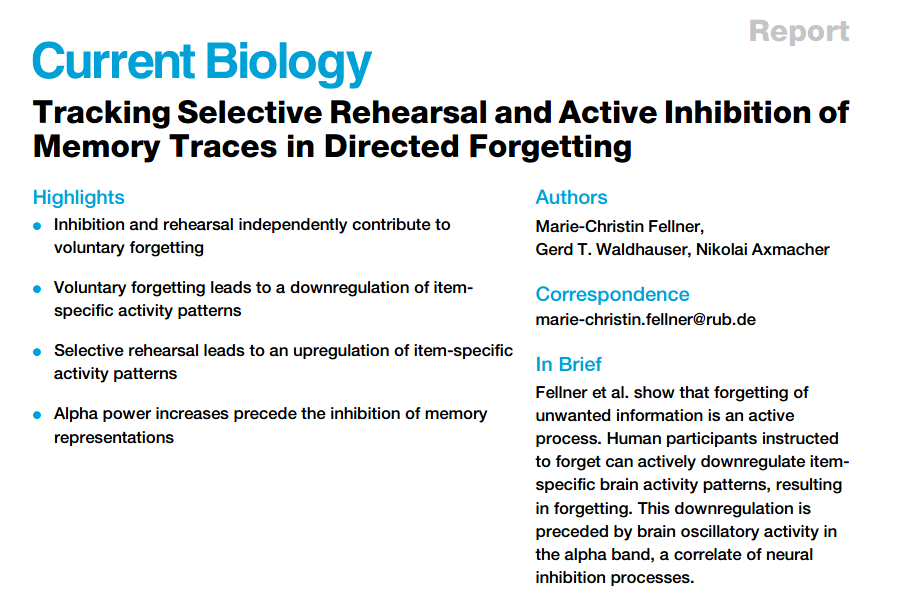
Axmacher, 2020
Selected Publications 2019 - Click to show
When numbers are not exact: ambiguity and prediction in the processing of sentences with bare numerals
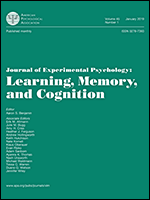
Werning, 2019
Relevance vs similarity: Bayesian pragmatics provides the best quantitative model for EEG and cloze data on contextual modulation in a predictive completion task
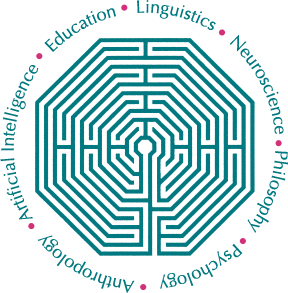
Werning, 2019
| Werning, M., Unterhuber, M., Wiedemann, G. (2019). Relevance vs Similarity: Bayesian Pragmatics Provides the Best Quantitative Model for EEG and Cloze Data on Contextual Modulation in a Predictive Completion Task. Annual Conference of the Cognitive Science Society 41 (forthcoming). |
Investigating the Comprehension of Negated Sentences Employing World Knowledge: An Event-Related Potential Study.
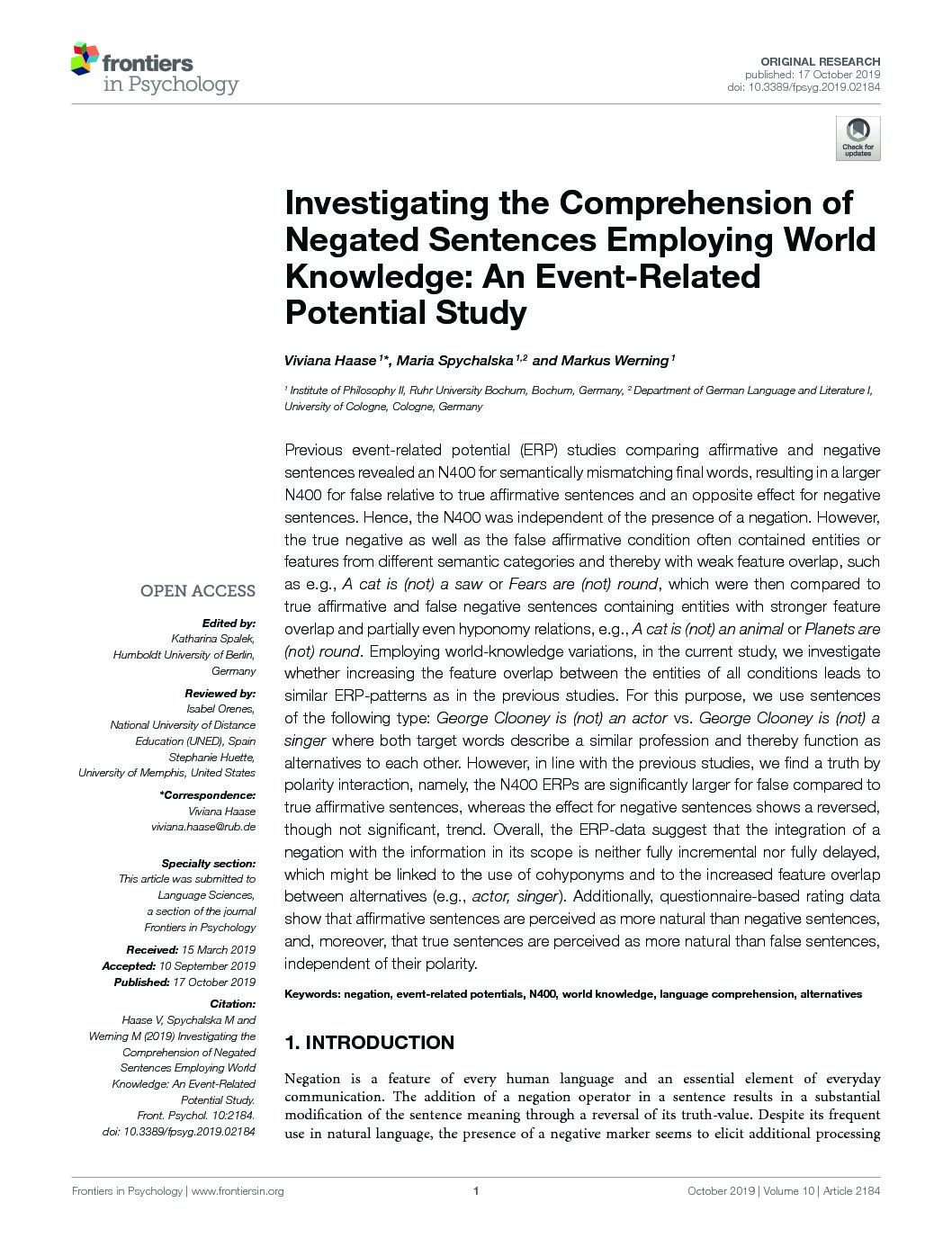
Werning, 2019
How Relevance Affects Understanding of Conflicts Between Multiple Documents: An Eye-Tracking Study
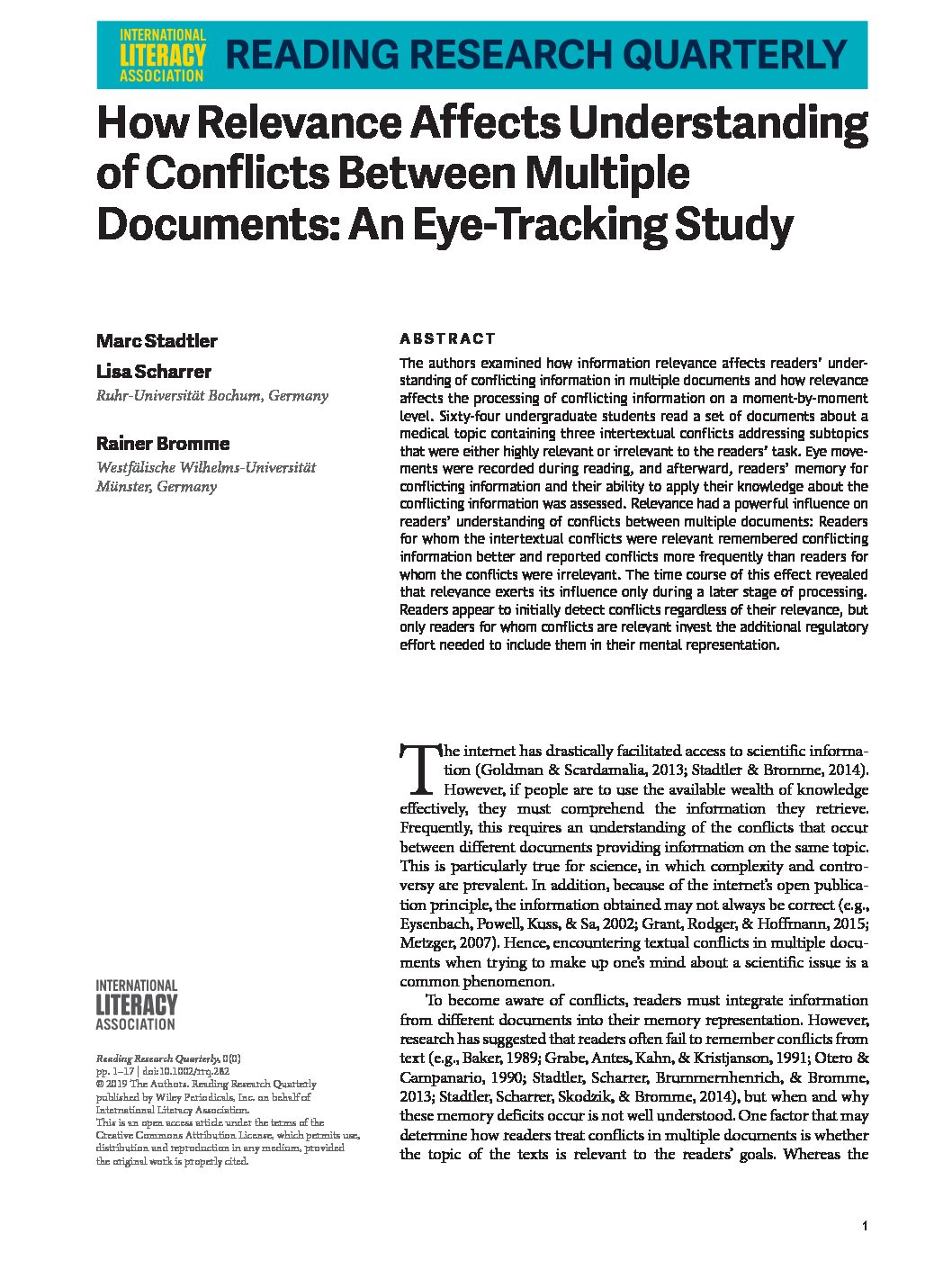
Stadtler, 2019
Judging scientific information: Does source evaluation prevent the seductive effect of text easiness?
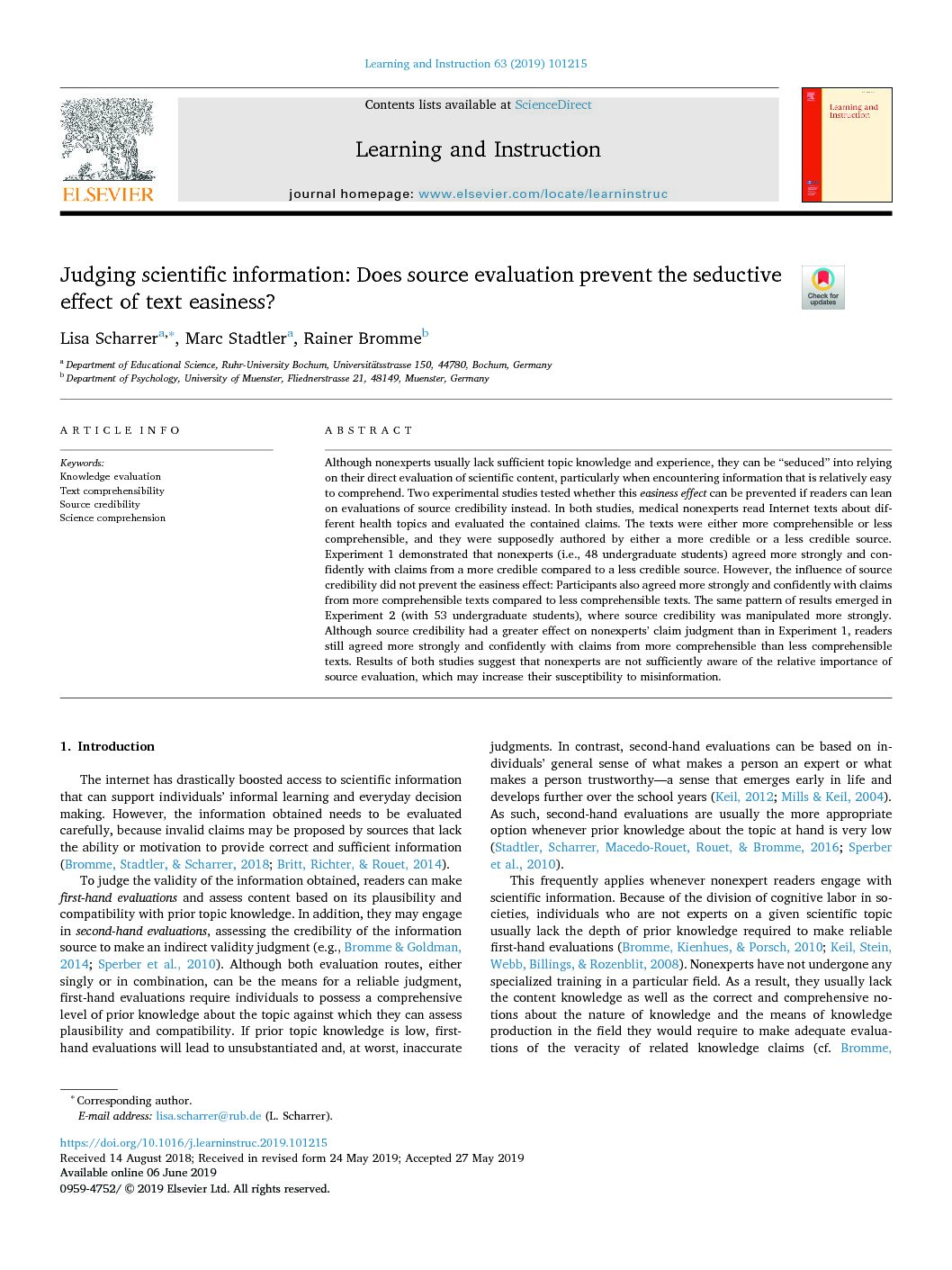
Stadtler, 2019
Remembering in the context of internal states: the role of sleep for infant memory

Seehagen, 2019
Seehagen, S., Zmyj, N., & Herbert, J. S. (2019). Remembering in the Context of Internal States: The Role of Sleep for Infant Memory. Child Development Perspectives, 17, 240. https://doi.org/10.1111/cdep.12321
Sleep-dependent selective imitation in infants

Seehagen, 2019
Konrad, C., Dirks, N. D., Warmuth, A., Herbert, J. S., Schneider, S., & Seehagen, S. (2019). Sleep-dependent selective imitation in infants. Journal of Sleep Research, 28(1), e12777. https://doi.org/10.1111/jsr.12777
The Dynamics of Neural Populations Capture the Laws of the Mind
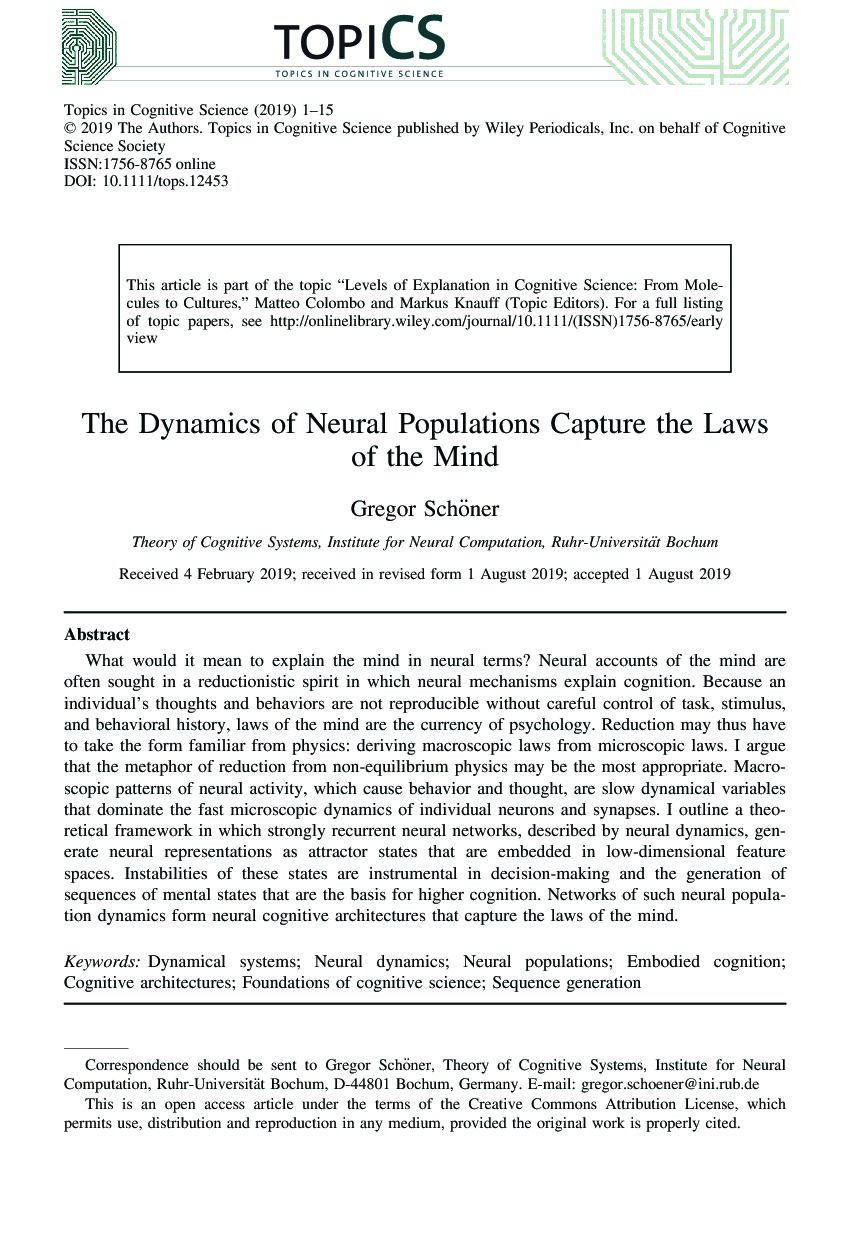
Schöner, 2019
A role for the prefrontal cortex in supporting singular demonstrative reference.

Newen, 2019
Nogueira de Carvalho, F.,&Newen, A. (2019). A role for the prefrontal cortex in supporting singular demonstrative reference. Journal of Consciousness Studies,26(11-12), 133-156
Event-related potentials evoked by passive visuospatial perception in rats and humans reveal common denominators in information processing
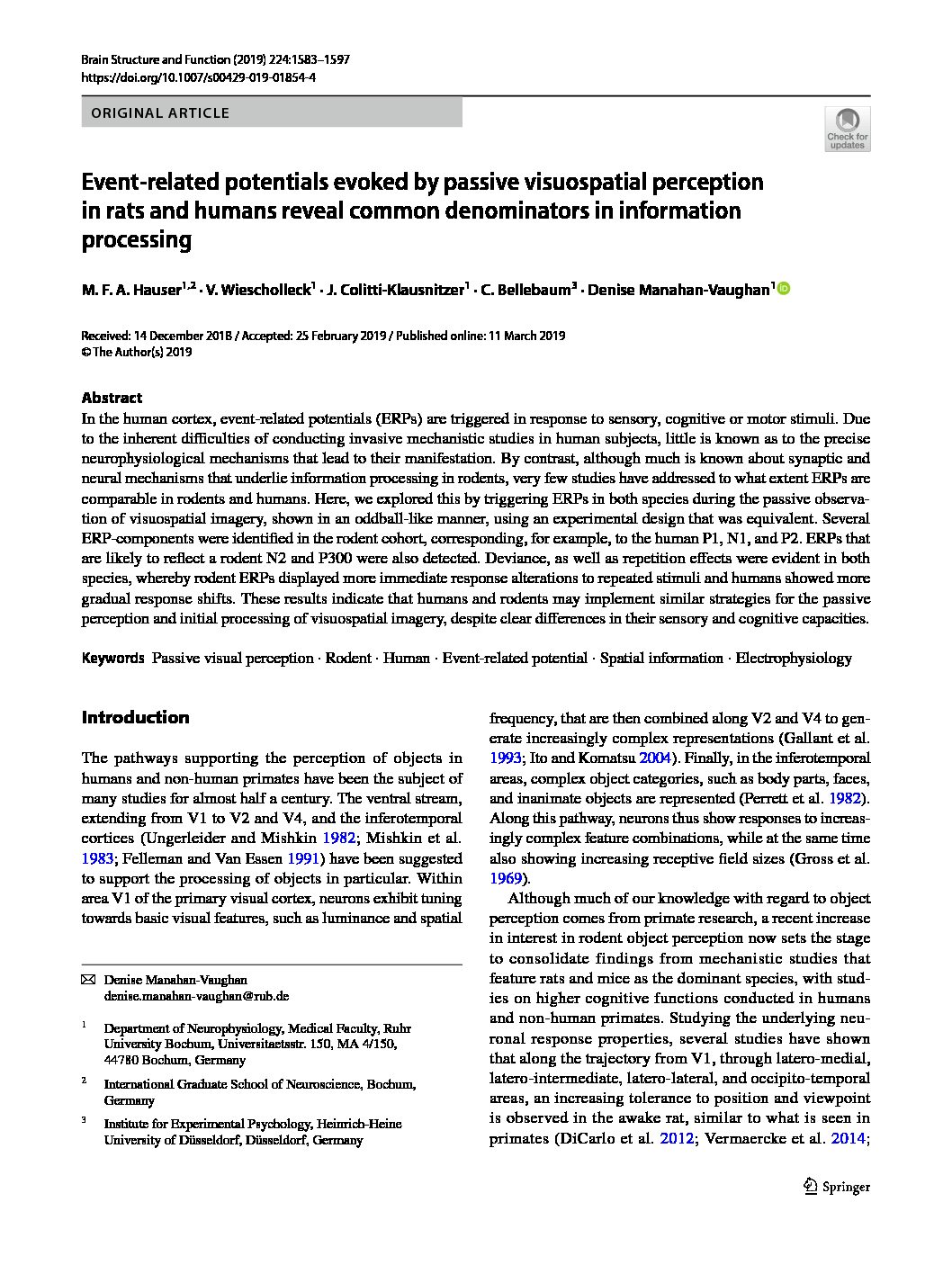
Manahan-Vaughan, 2019
Early Loss of Vision Results in Extensive Reorganization of Plasticity-Related Receptors and Alterations in Hippocampal Function That Extend Through Adulthood
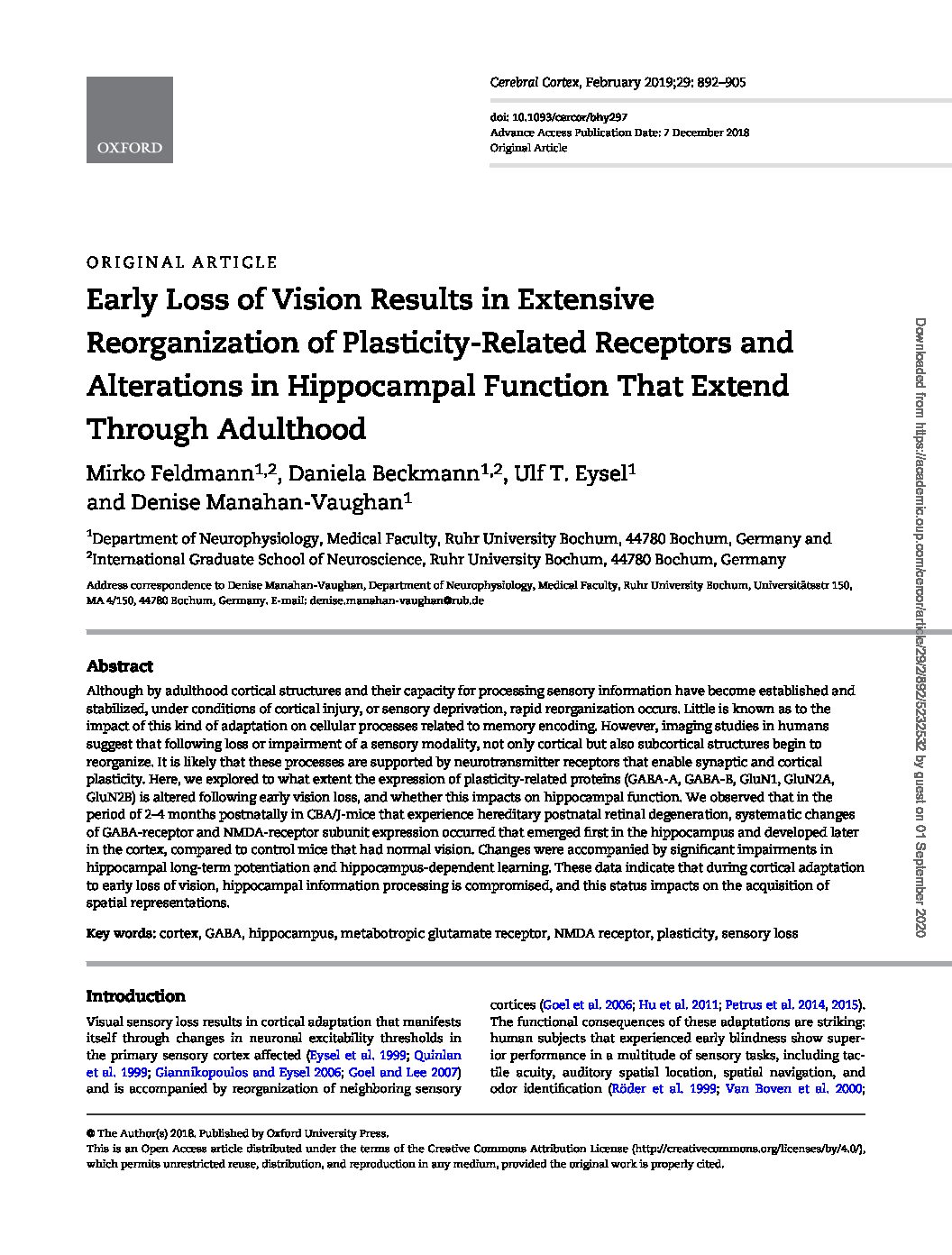
Manahan-Vaughan, 2019
Feldmann, M., Beckmann, D., Eysel, U. T., & Manahan-Vaughan, D. (2019). Early Loss of Vision Results in Extensive Reorganization of Plasticity-Related Receptors and Alterations in Hippocampal Function That Extend Through Adulthood. Cerebral Cortex, 29(2), 892–905. https://doi.org/10.1093/cercor/bhy297
Experimental ordinary language philosophy: a cross-linguistic study of defeasible default inferences
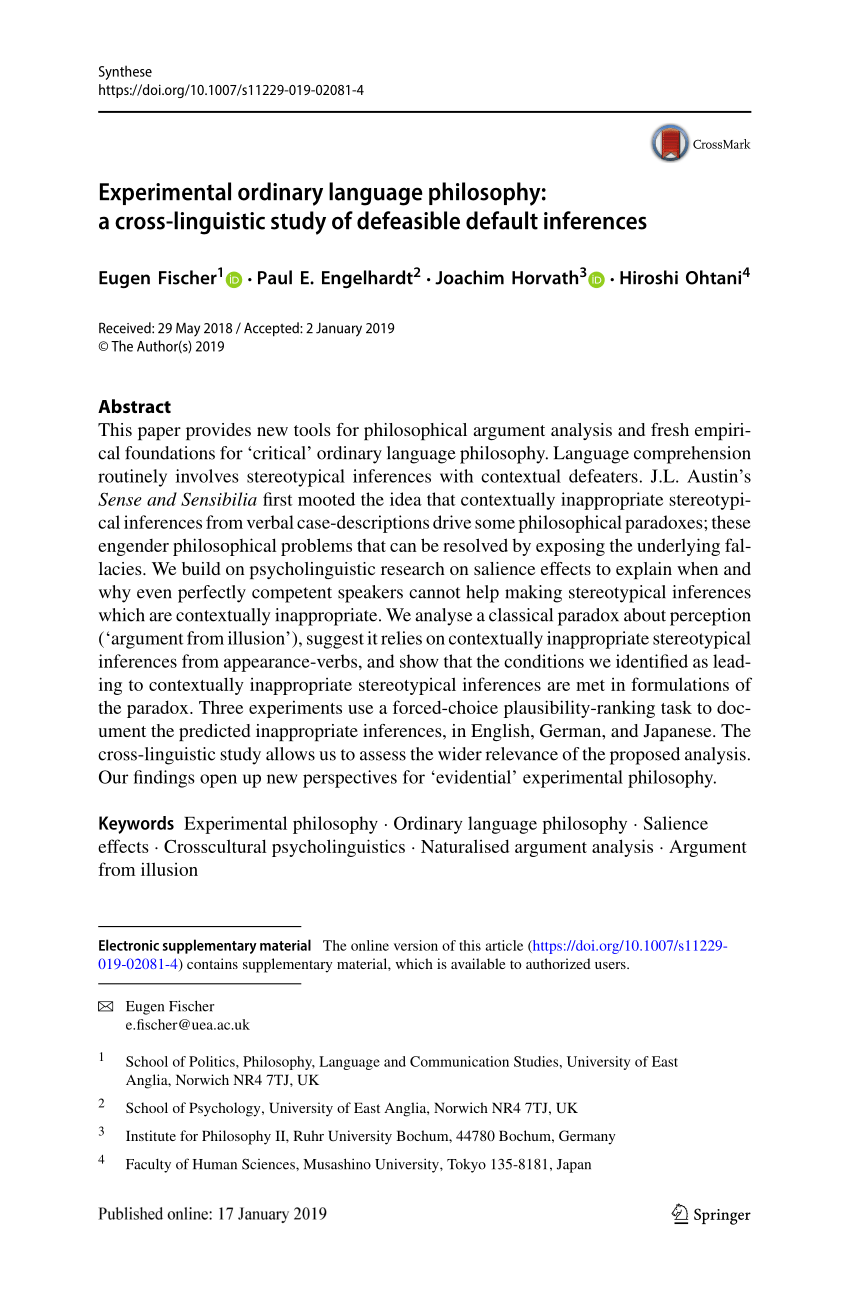
Horvath, 2019
Fischer, E., Engelhardt, P. E., Horvath, J., & Ohtani, H. (2019). Experimental ordinary language philosophy: a cross-linguistic study of defeasible default inferences. Synthese, 72(7), 271. https://doi.org/10.1007/s11229-019-02081-4
How foraging works: Uncertainty magnifies food-seeking motivation
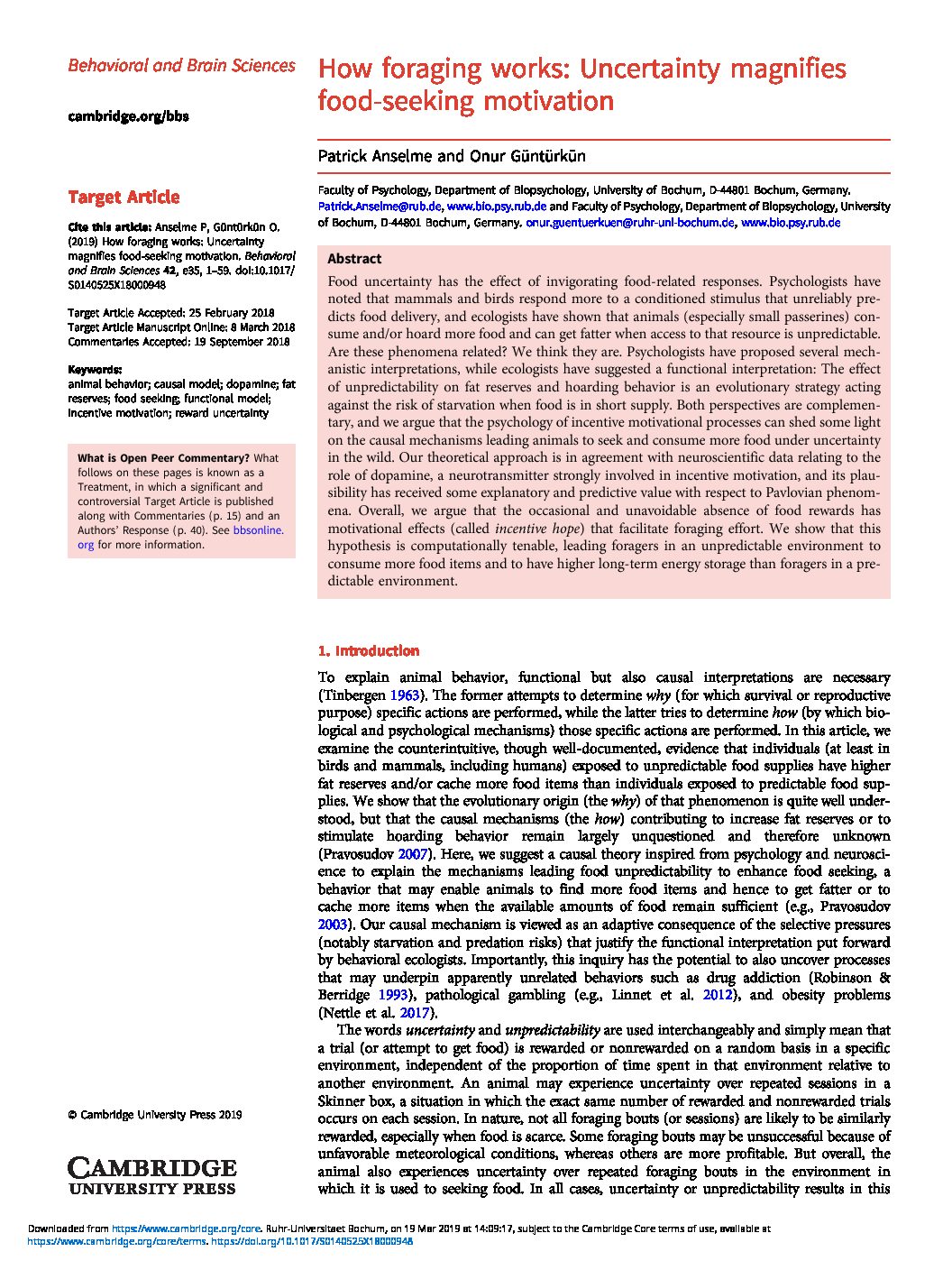
Güntürkün, 2019
(2019) How foraging works: Uncertainty
magnifies food-seeking motivation. Behavioral
and Brain Sciences 42, e35, 1–59. doi:10.1017/
S0140525X18000948
The Oxford handbook of evolutionary medicine

Brüne, 2019
Brüne, M., & Schiefenhövel, W. (Eds.). (2019). The Oxford handbook of evolutionary medicine. Oxford: Oxford University Press.
The association between childhood maltreatment and empathic perspective taking is moderated by the 5-HTT linked polymorphic region: Another example of “differential susceptibility”
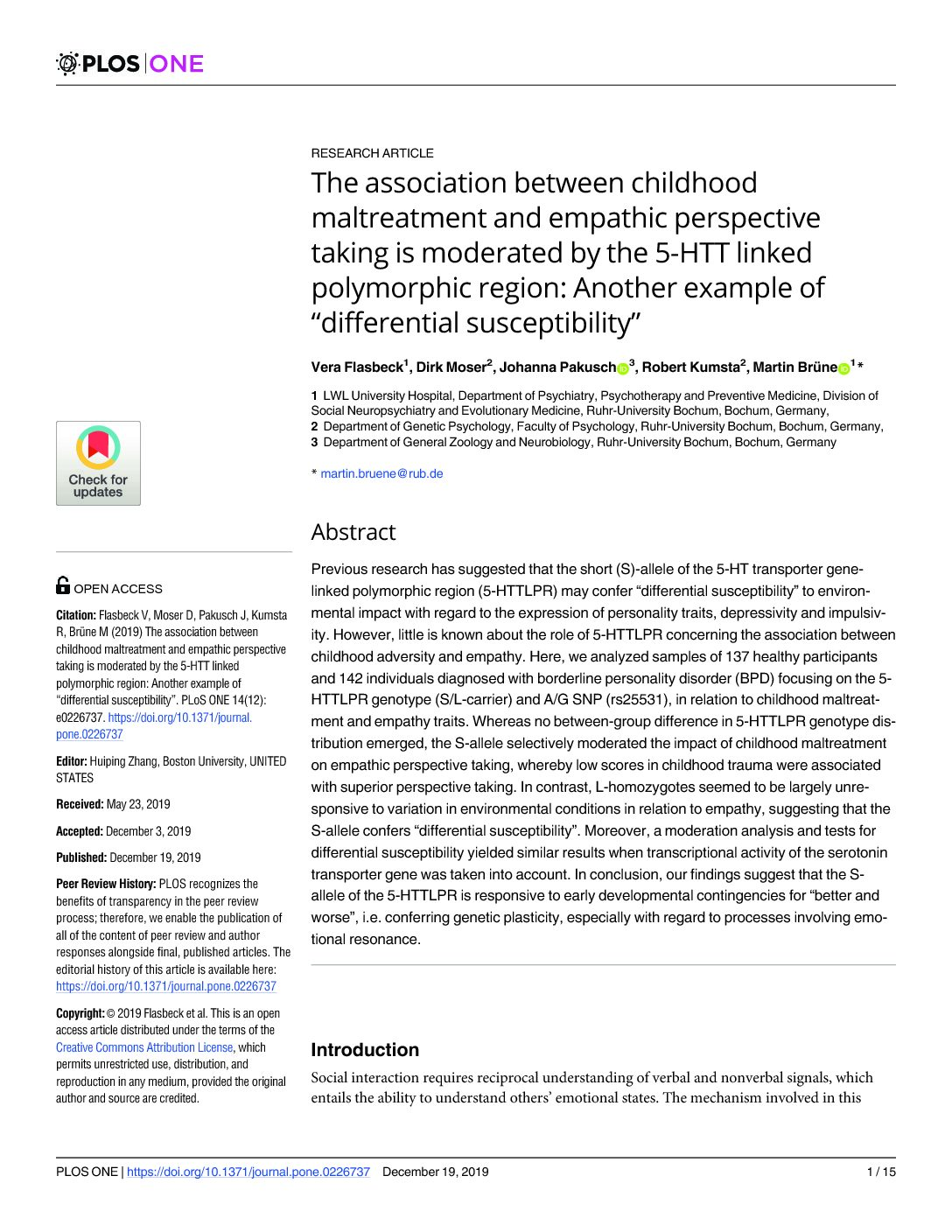
Brüne, 2019
Emotion identification among people with serious mental illnesses: the role of specific emotions and sex
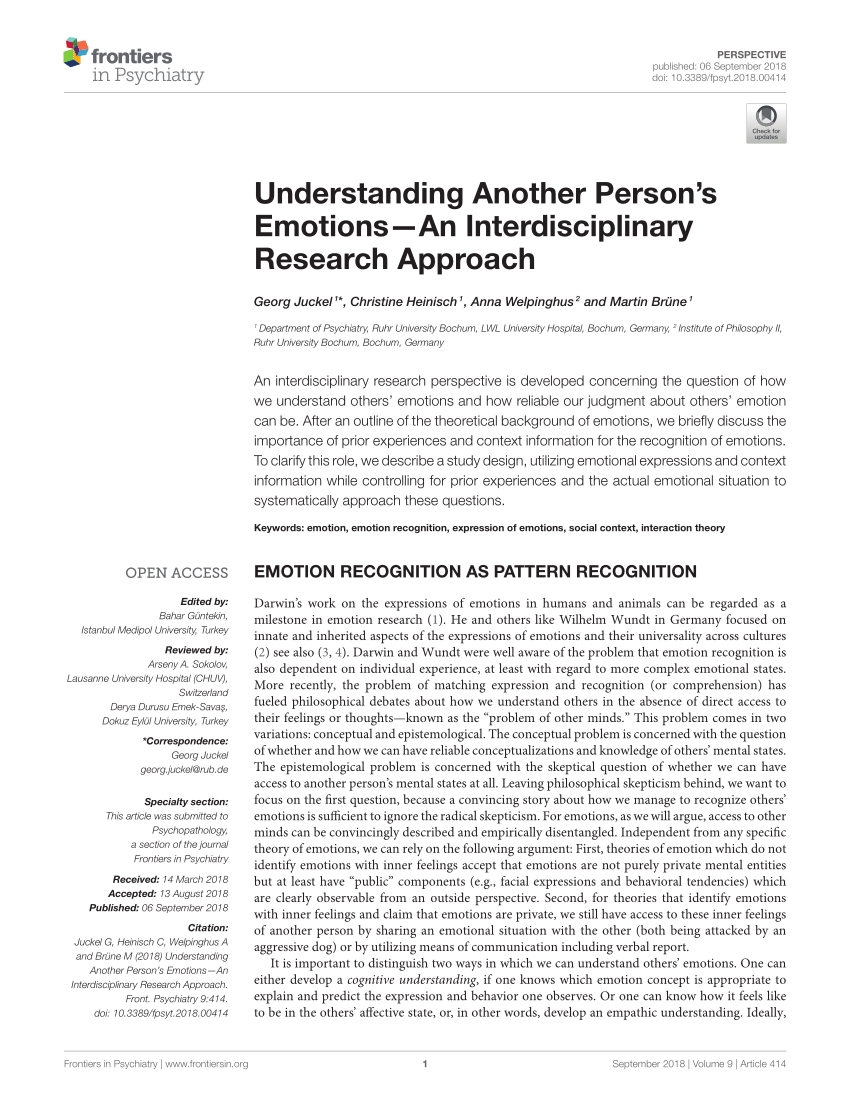
Brüne, 2019
Hasson-Ohayon, I., Mashiach-Eizenberg, M., Lavi-Rotenberg, A., Brüne, M., & Roe, D. (2019). Emotion identification among people with serious mental illnesses: The role of specific emotions and sex. Psychiatry Research. Advance online publication. https://doi.org/10.1016/j.psychres.2019.01.082
Hippocampal theta phases organize the reactivation of large-scale electrophysiological representations during goal-directed navigation
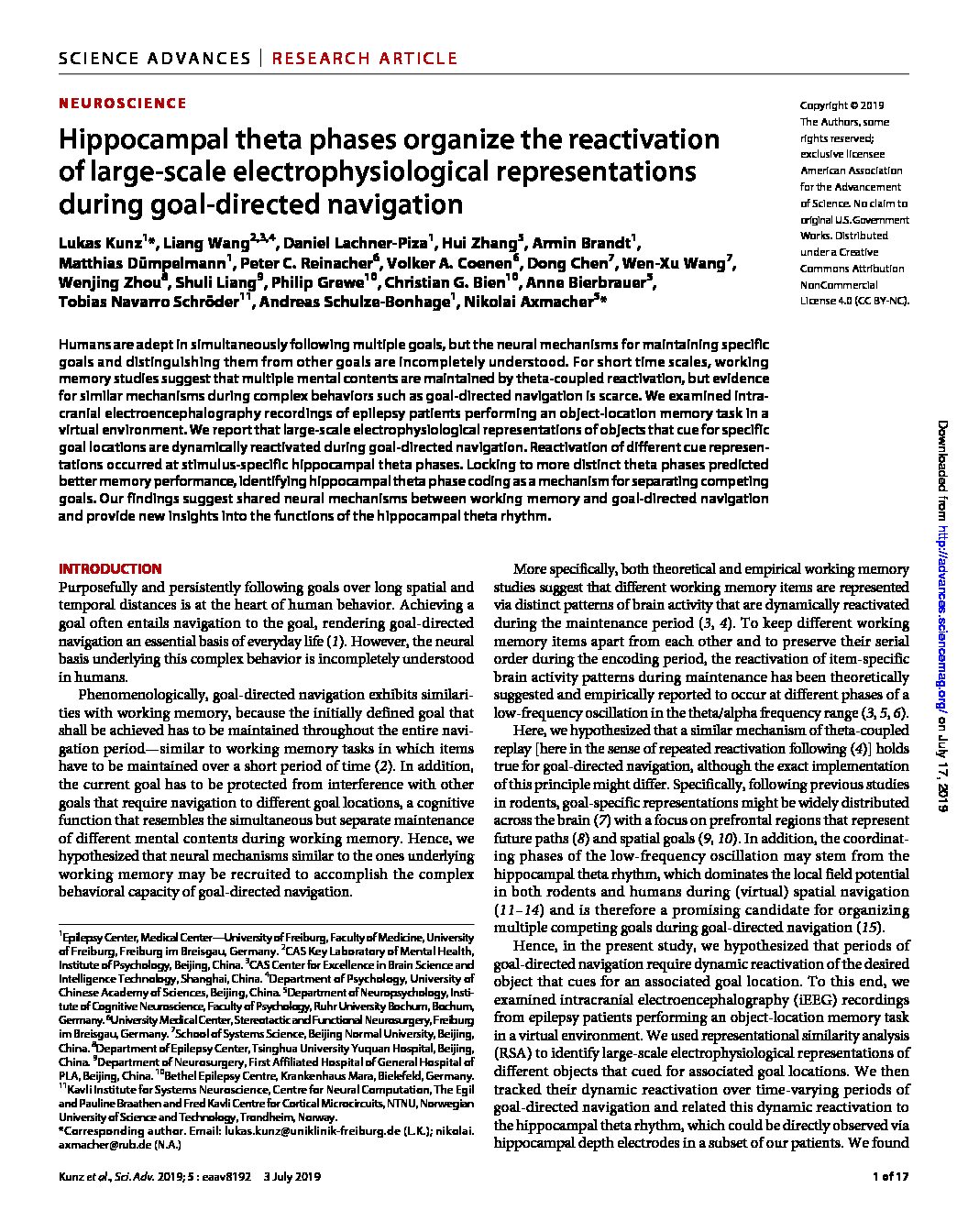
Axmacher, 2019
Selected Publications 2018 - Click to show
How stress and glucocorticoids timing-dependently affect extinction and relapse
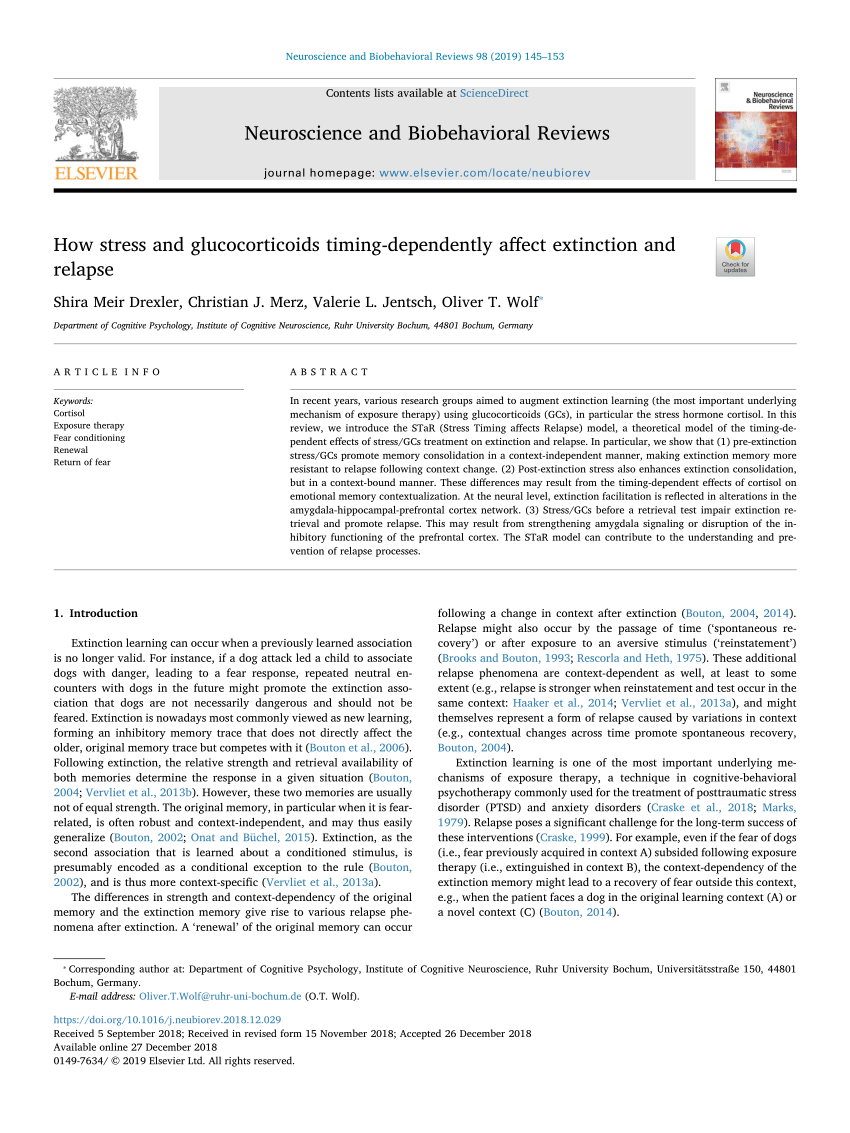
Wolf, 2018
Meir Drexler, S., Merz, C. J., Jentsch, V. L., & Wolf, O. T. (2018). How stress and glucocorticoids timing-dependently affect extinction and relapse. Neuroscience and Biobehavioral Reviews, 98, 145–153. https://doi.org/10.1016/j.neubiorev.2018.12.029
The interaction between semantic representation and episodic memory
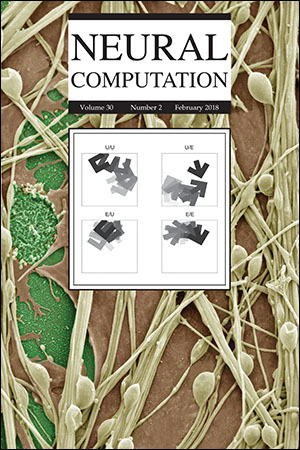
Wiskott, 2018
Fang, J., Rüther, N., Bellebaum, C., Wiskott, L., & Cheng, S. (2018). The Interaction between Semantic Representation and Episodic Memory. Neural Computation, 30(2), 293–332. https://doi.org/10.1162/neco_a_01044
Storage fidelity for sequence memory in the hippocampal circuit

Wiskott, 2018
Bayati, M., Neher, T., Melchior, J., Diba, K., Wiskott, L., & Cheng, S. (2018). Storage fidelity for sequence memory in the hippocampal circuit. PloS One, 13(10), e0204685. https://doi.org/10.1371/journal.pone.0204685
When numbers are not exact: Ambiguity and prediction in the processing of sentences with bare numerals
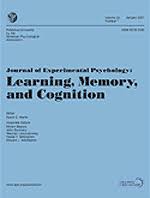
Werning, 2018
Spychalska, M., Kontinen, J., Noveck, I., Reimer, L., & Werning, M. (2018). When numbers are not exact: Ambiguity and prediction in the processing of sentences with bare numerals. Journal of Experimental Psychology. Learning, Memory, and Cognition. Advance online publication. https://doi.org/10.1037/xlm0000644
Doing without metarepresentation: Scenario construction explains the epistemic generativity and privileged status of episodic memory

Werning, 2018
Werning, M., & Cheng, S. (2018). Doing without metarepresentation: Scenario construction explains the epistemic generativity and privileged status of episodic memory. The Behavioral and Brain Sciences, 41, e34. https://doi.org/10.1017/S0140525X17001534
Evidence for single-type semantics: An alternative to e/t-based dual-type semantics
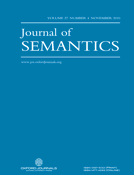
Werning, 2018
Liefke, K., & Werning, M. (2018). Evidence for Single-Type Semantics—An Alternative To e/t-based Dual-Type Semantics. Journal of Semantics, 77, 107. https://doi.org/10.1093/jos/ffy009
The effects of dopaminergic D2-like receptor stimulation upon behavioral and neural correlates of renewal depend on individual context processing propensities
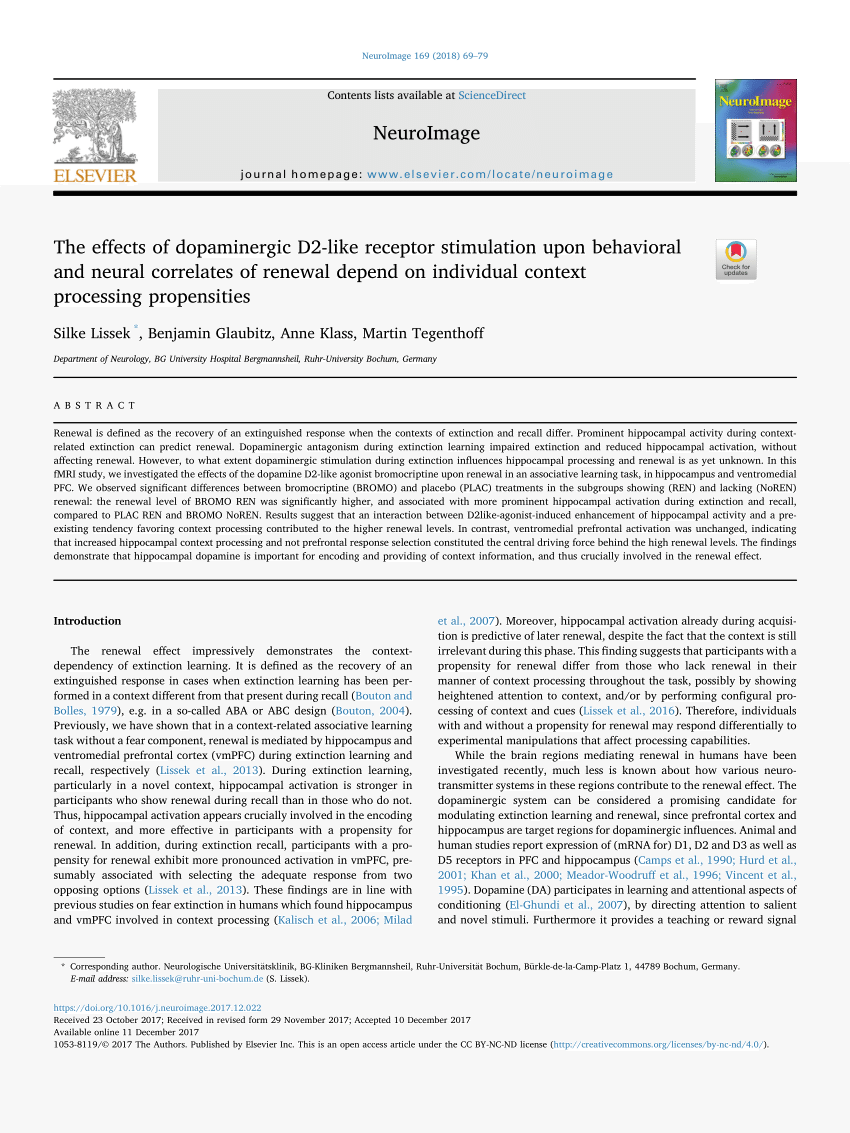
Tegenthoff, 2018
Lissek, S., Glaubitz, B., Klass, A., & Tegenthoff, M. (2018). The effects of dopaminergic D2-like receptor stimulation upon behavioral and neural correlates of renewal depend on individual context processing propensities. NeuroImage, 169, 69–79. https://doi.org/10.1016/j.neuroimage.2017.12.022
Death anxiety and depression in amyotrophic lateral sclerosis patients and their primary caregivers
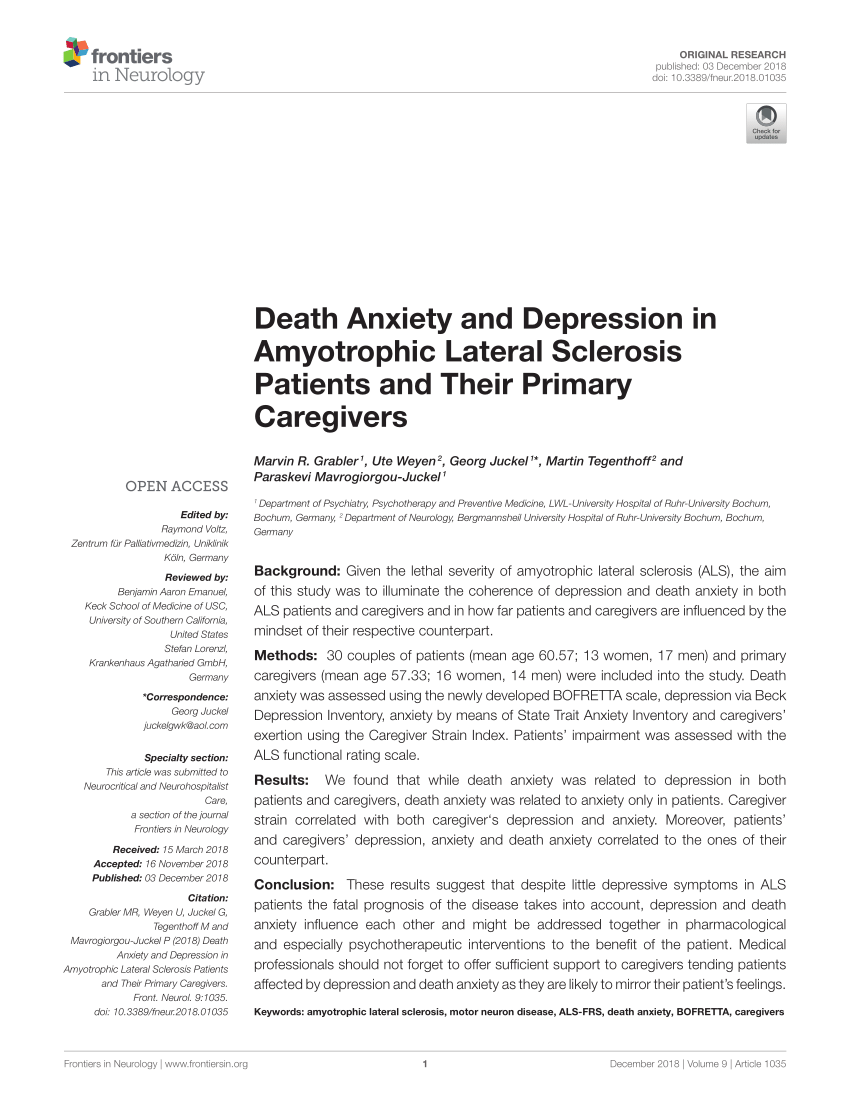
Tegenthoff, 2018
Grabler, M. R., Weyen, U., Juckel, G., Tegenthoff, M., & Mavrogiorgou-Juckel, P. (2018). Death Anxiety and Depression in Amyotrophic Lateral Sclerosis Patients and Their Primary Caregivers. Frontiers in Neurology, 9, 1035. https://doi.org/10.3389/fneur.2018.01035
Does separating intentionality from mental representation imply radical enactivism?

Schlicht, 2018
Schlicht, T. (2018). Does Separating Intentionality From Mental Representation Imply Radical Enactivism? Frontiers in Psychology, 9, 1497. https://doi.org/10.3389/fpsyg.2018.01497
A methodological dilemma for investigating consciousness empirically
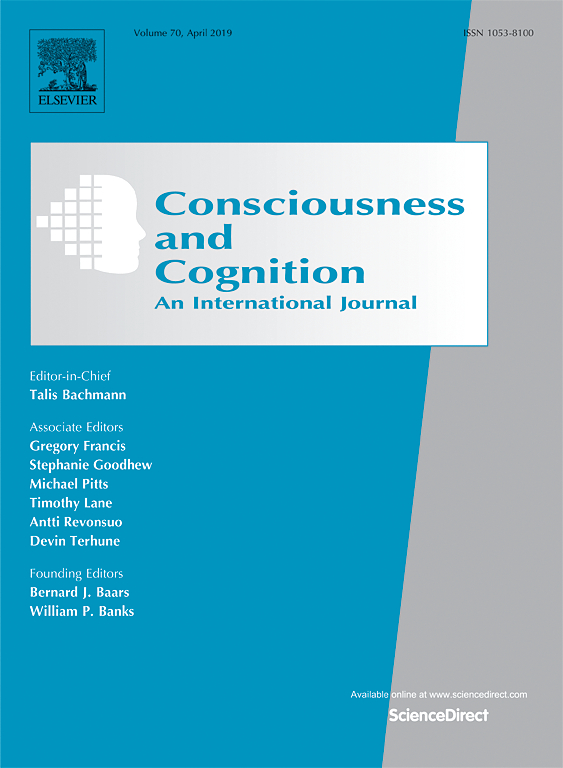
Schlicht, 2018
Schlicht, T. (2018). A methodological dilemma for investigating consciousness empirically. Consciousness and Cognition, 66, 91–100. https://doi.org/10.1016/j.concog.2018.11.002
The Oxford Handbook of 4e cognition
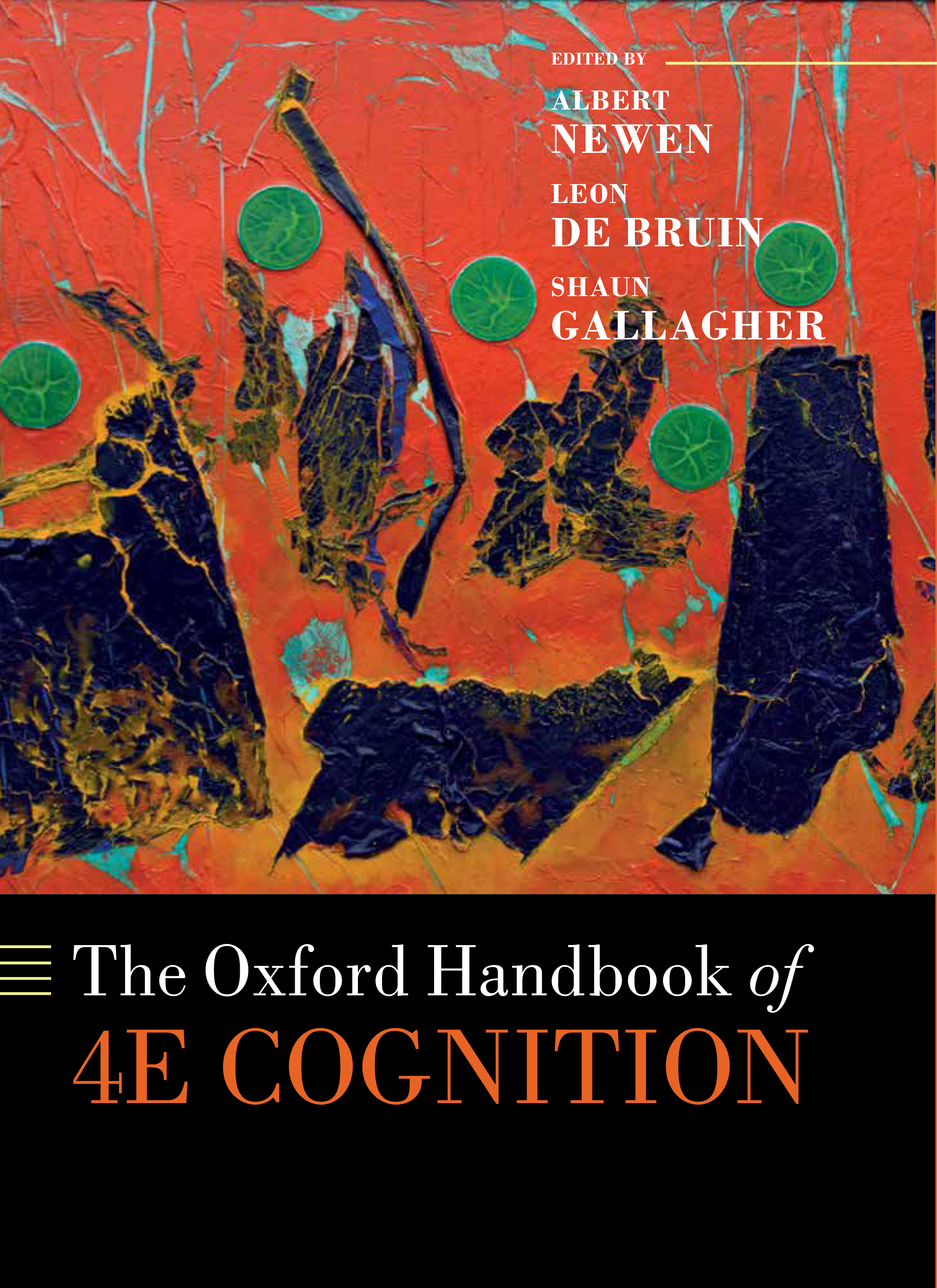
Newen, 2018
Newen, A., Bruin, L. d., & Gallagher, S. (Eds.). (2018). The Oxford handbook of 4E cognition (First edition). Oxford, New York, NY: Oxford University Press.
The embodied self, the pattern theory of self, and the predictive mind

Newen, 2018
Newen, A. (2018). The Embodied Self, the Pattern Theory of Self, and the Predictive Mind. Frontiers in Psychology, 9, 2270. https://doi.org/10.3389/fpsyg.2018.02270
Adversarial attacks against automatic speech recognition systems via psychoacoustic hiding
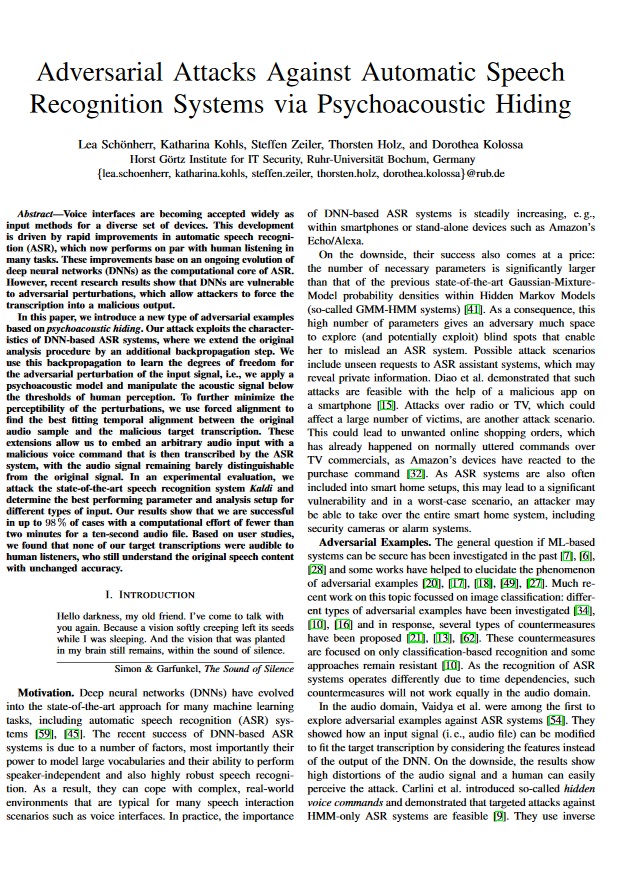
Kolossa, 2018
Schönherr, L., Kohls, K., Zeiler, S., Holz, T., & Kolossa, D. (2018). Adversarial Attacks Against Automatic Speech Recognition Systems via Psychoacoustic Hiding. Retrieved from http://arxiv.org/pdf/1808.05665v2
Philosophical analysis: the concept grounding view
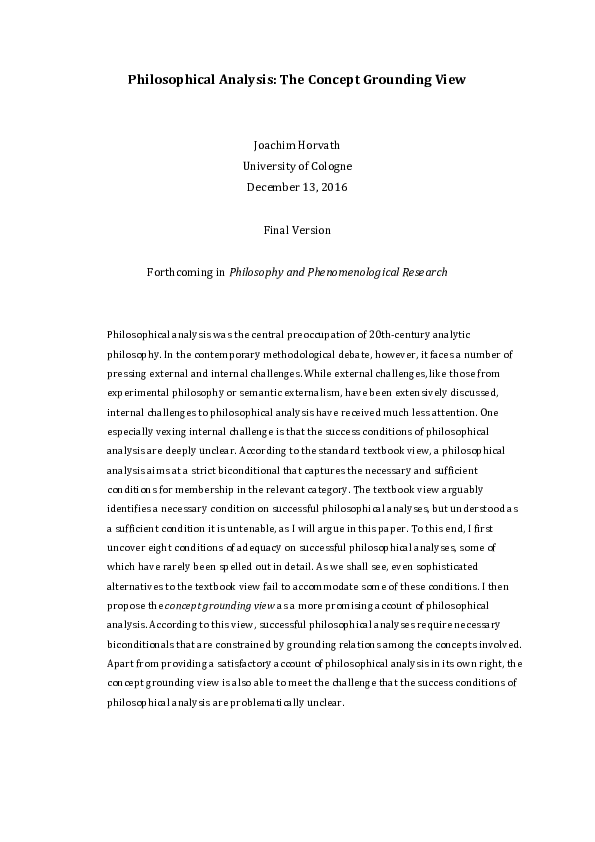
Horvath, 2018
Horvath, J. (2018). Philosophical Analysis: The Concept Grounding View. Philosophy and Phenomenological Research, 97(3), 724–750. https://doi.org/10.1111/phpr.12378
Diffusion markers of dendritic density and arborization in gray matter predict differences in intelligence
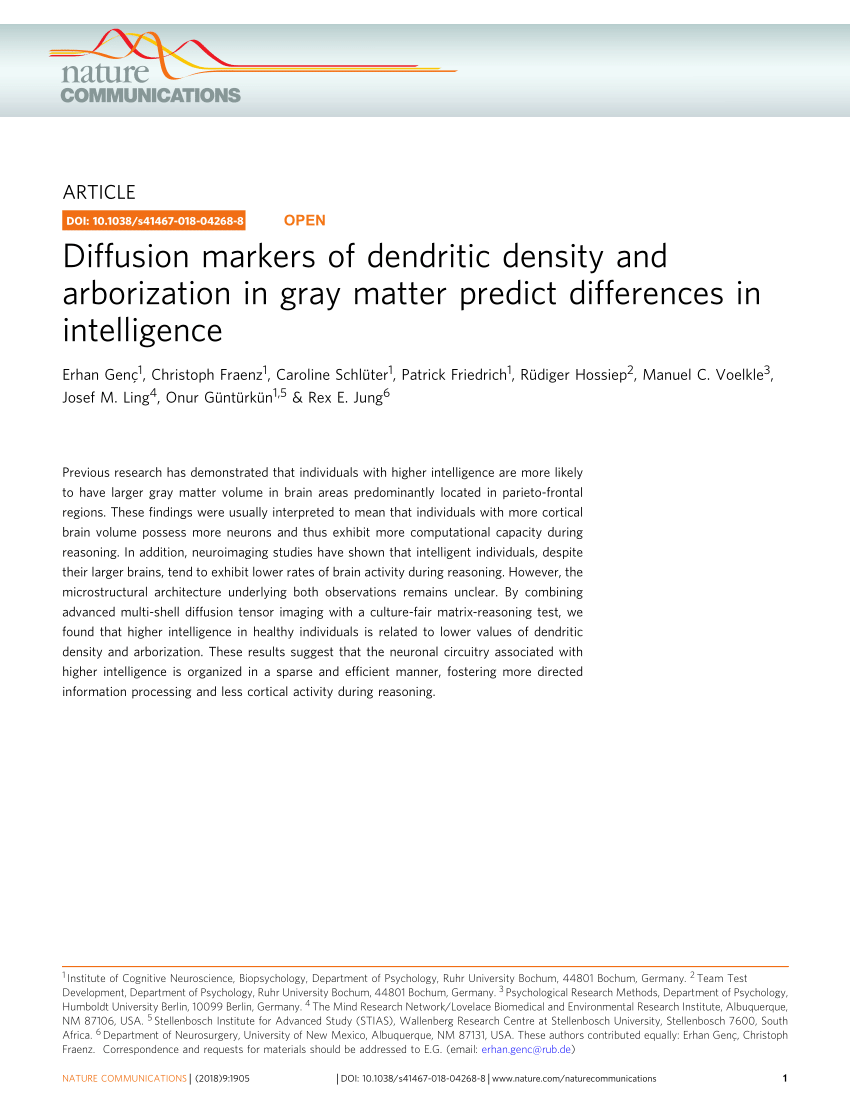
Güntürkün, 2018
Genç, E., Fraenz, C., Schlüter, C., Friedrich, P., Hossiep, R., Voelkle, M. C., Güntürkün, O., … Jung, R. E. (2018). Diffusion markers of dendritic density and arborization in gray matter predict differences in intelligence. Nature Communications, 9(1), 1905. https://doi.org/10.1038/s41467-018-04268-8
Retaliation or selfishness? An rTMS investigation of the role of the dorsolateral prefrontal cortex in prosocial motives

Brüne, 2018
Müller-Leinß, J.-M., Enzi, B., Flasbeck, V., & Brüne, M. (2018). Retaliation or selfishness? An rTMS investigation of the role of the dorsolateral prefrontal cortex in prosocial motives. Social Neuroscience, 13(6), 701–709. https://doi.org/10.1080/17470919.2017.1411828
Understanding another person’s emotions – an interdisciplinary research approach

Brüne, 2018
Juckel, G., Heinisch, C., Welpinghus, A., & Brüne, M. (2018). Understanding Another Person’s Emotions-An Interdisciplinary Research Approach. Frontiers in Psychiatry, 9, 414. https://doi.org/10.3389/fpsyt.2018.00414
Endogenous oxytocin is associated with the experience of compassion and recalled upbringing in Borderline Personality Disorder
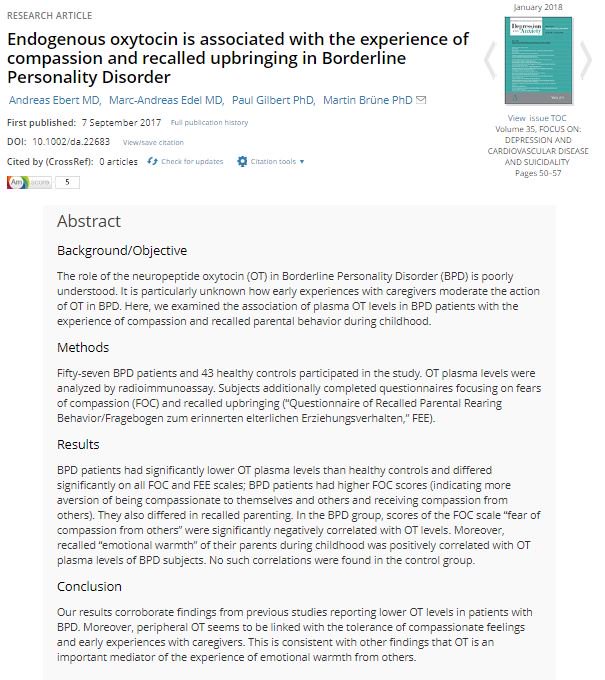
Brüne, 2018
Ebert, A., Edel, M.-A., Gilbert, P., & Brüne, M. (2018). Endogenous oxytocin is associated with the experience of compassion and recalled upbringing in Borderline Personality Disorder. Depression and Anxiety, 35(1), 50–57. https://doi.org/10.1002/da.22683
Selected Publications 2017 - Click to show
Stress and memory retrieval: mechanisms and consequences
The interaction of Bayesian pragmatics and lexical semantics in linguistic interpretation: Using event-related potentials to investigate hearers’ probabilistic predictions

Werning, 2017
Werning, M., & Cosentino, E. (2017). The interaction of Bayesian pragmatics and lexical semantics in linguistic interpretation: Using event-related potentials to investigate hearers’ probabilistic predictions. In: G. Gunzelmann, A. Howes, T. Tenbrink, & E. Davelaar (Eds.), Annual Conference of the Cognitive Science Society 39, 3504-3509.
Reading words hurts: The impact of pain sensitivity on people’s ratings of pain-related words
The time-course of sentence meaning composition. N400 effects of the interaction between context-induced and lexically stored affordances

Werning, 2017
Cosentino, E., Baggio, G., Kontinen, J., & Werning, M. (2017). The Time-Course of Sentence Meaning Composition. N400 Effects of the Interaction between Context-Induced and Lexically Stored Affordances. Frontiers in Psychology, 8, 813. https://doi.org/10.3389/fpsyg.2017.00813
Child-to-adult neurodevelopmental and mental health trajectories after early life deprivation: the young adult follow-up of the longitudinal English and Romanian adoptees study
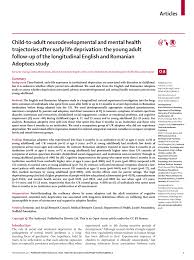
Kumsta, 2017
Sonuga-Barke, E. J. S., Kennedy, M., Kumsta, R., Knights, N., Golm, D., Rutter, M., . . . Kreppner, J. (2017). Child-to-adult neurodevelopmental and mental health trajectories after early life deprivation: the young adult follow-up of the longitudinal English and Romanian Adoptees study. The Lancet, 389(10078), 1539–1548. https://doi.org/10.1016/S0140-6736(17)30045-4
Toward improved audio CAPTCHAs based on auditory perception and language understanding
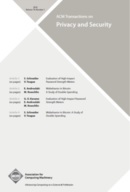
Kolossa, 2017
Meutzner, H., Gupta, S., Nguyen, V.-H., Holz, T., & Kolossa, D. (2017). Toward Improved Audio CAPTCHAs Based on Auditory Perception and Language Understanding. ACM Transactions on Privacy and Security, 19(4), 1–31. https://doi.org/10.1145/2856820
Ontogenesis of lateralization

Güntürkün, 2017
Güntürkün, O., & Ocklenburg, S. (2017). Ontogenesis of Lateralization. Neuron, 94(2), 249–263. https://doi.org/10.1016/j.neuron.2017.02.045
Taxonomy and unity of memory
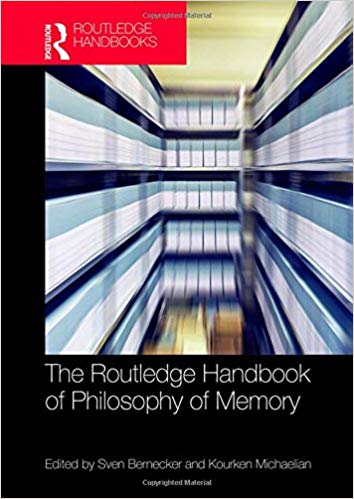
Cheng, 2017
Werning, M., & Cheng, S. (2017). Taxonomy and Unity of Memory. In: Bernecker, S., & Michaelian, K. (Eds.) Routledge Handbook of Philosophy of Memory (pp 7-20). New York: Routledge.

